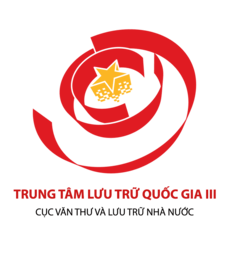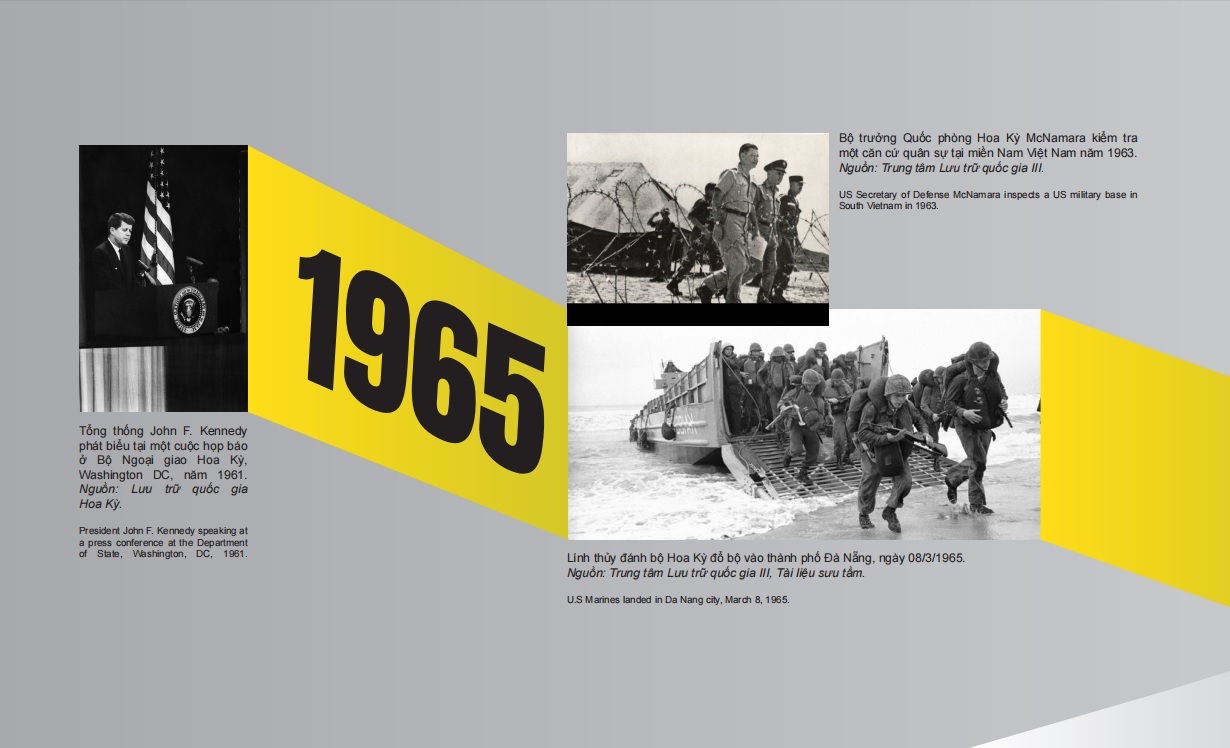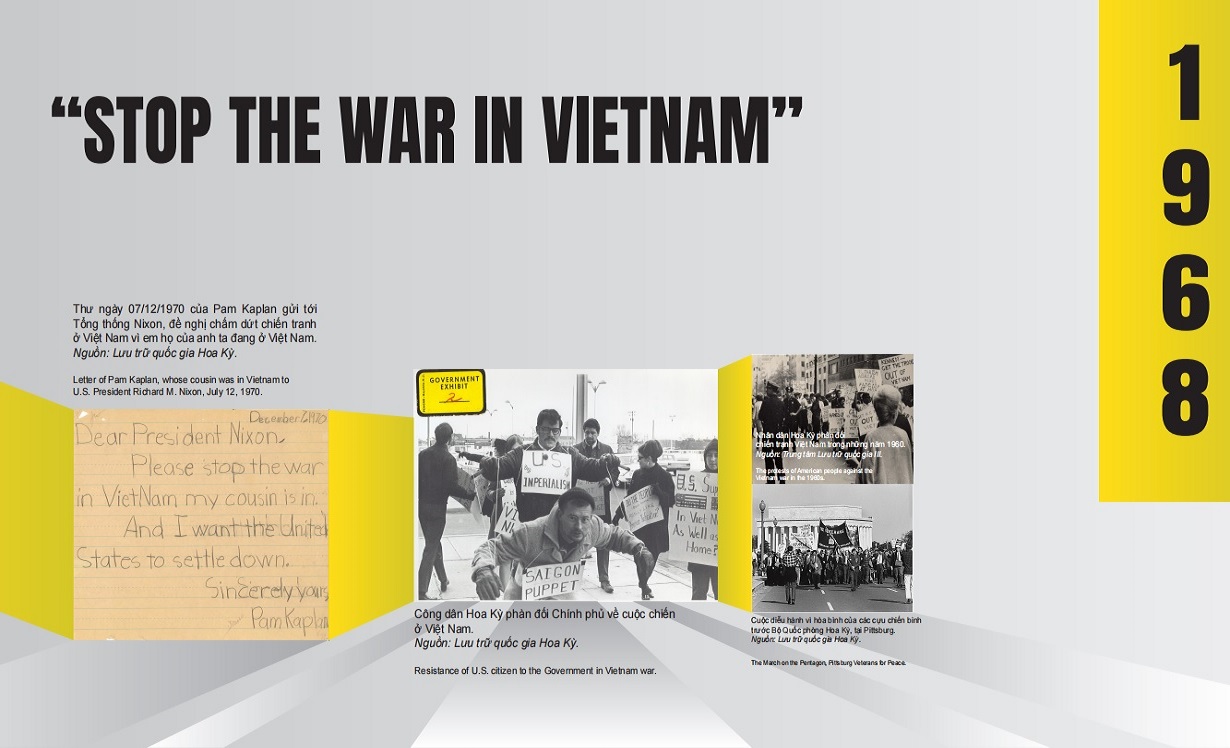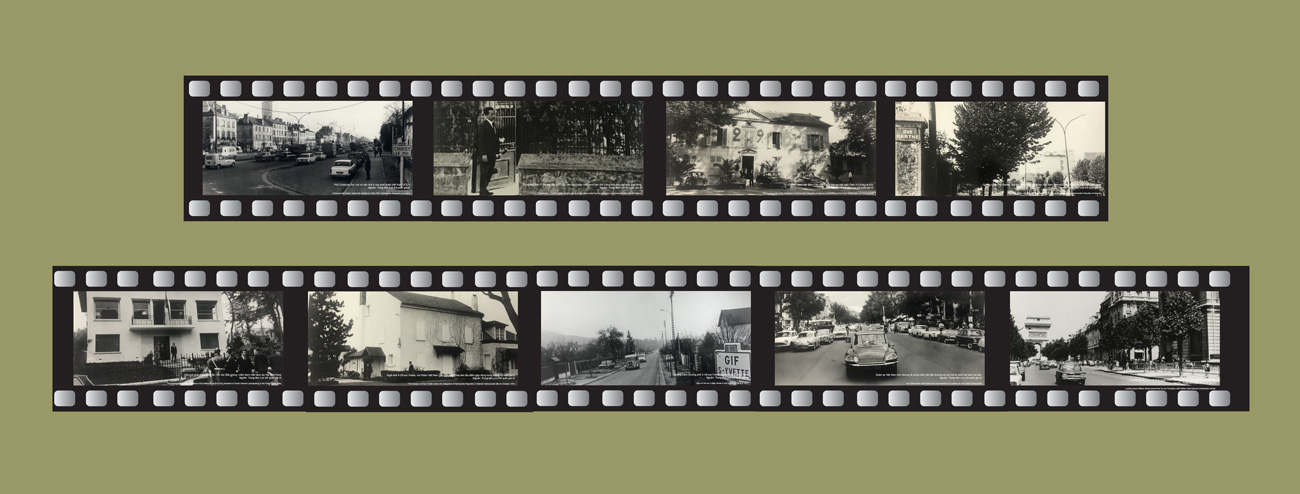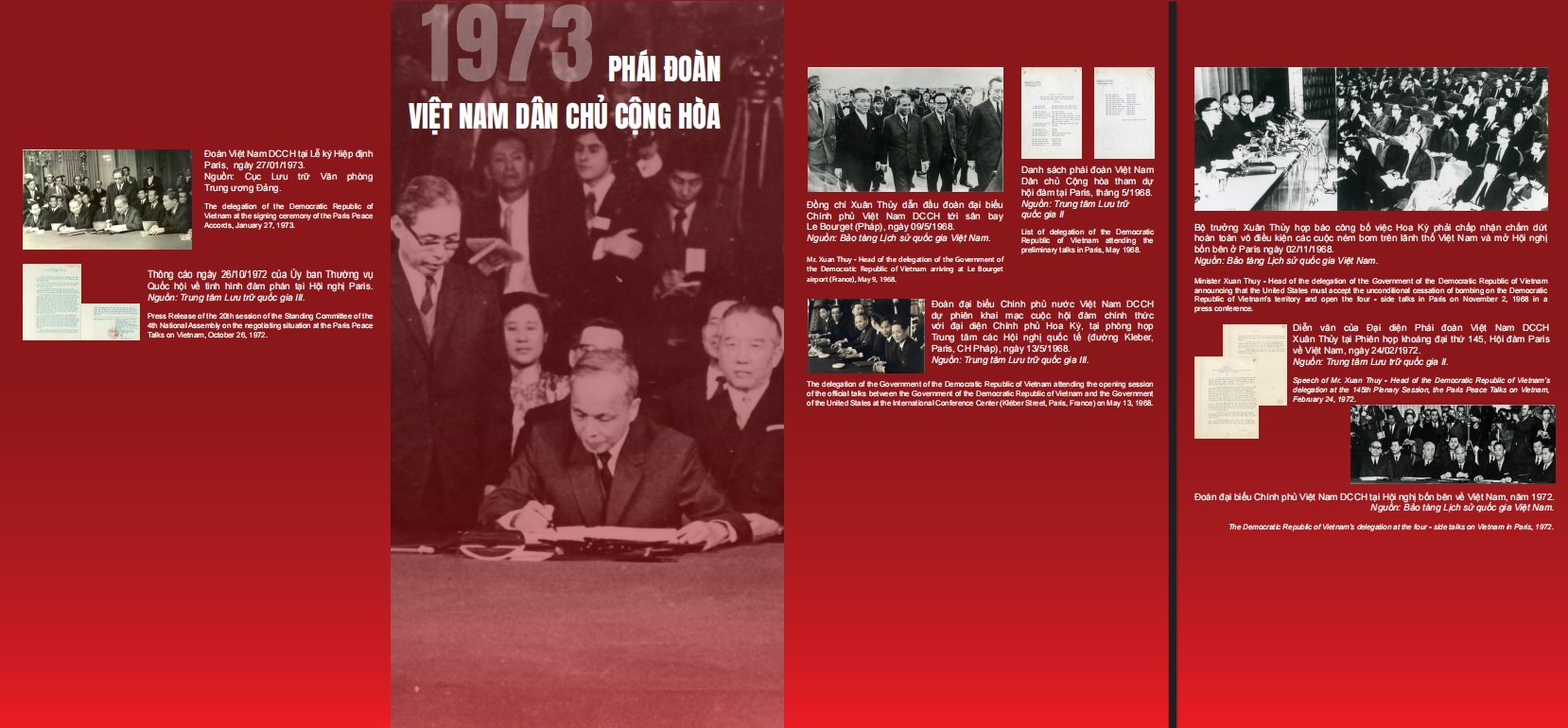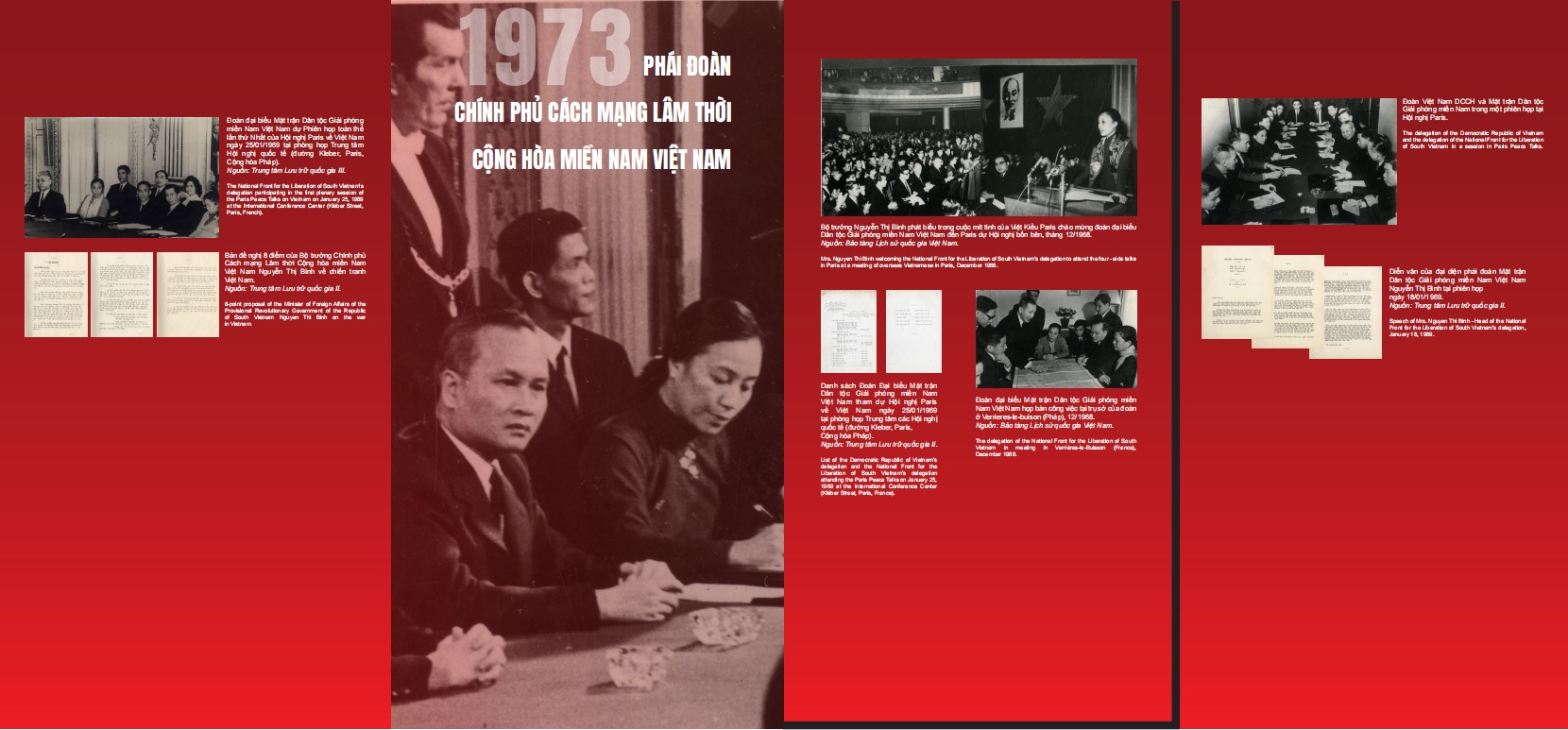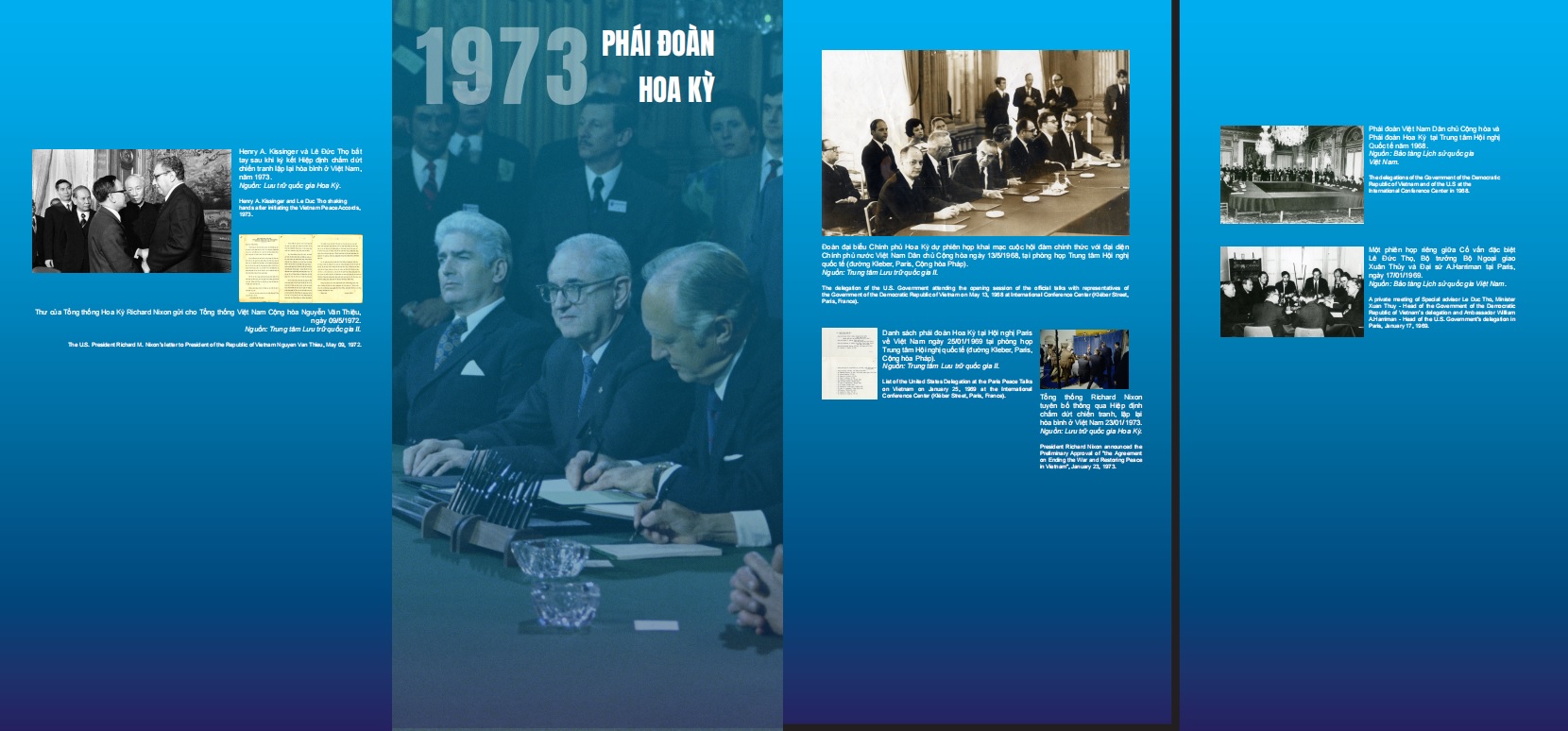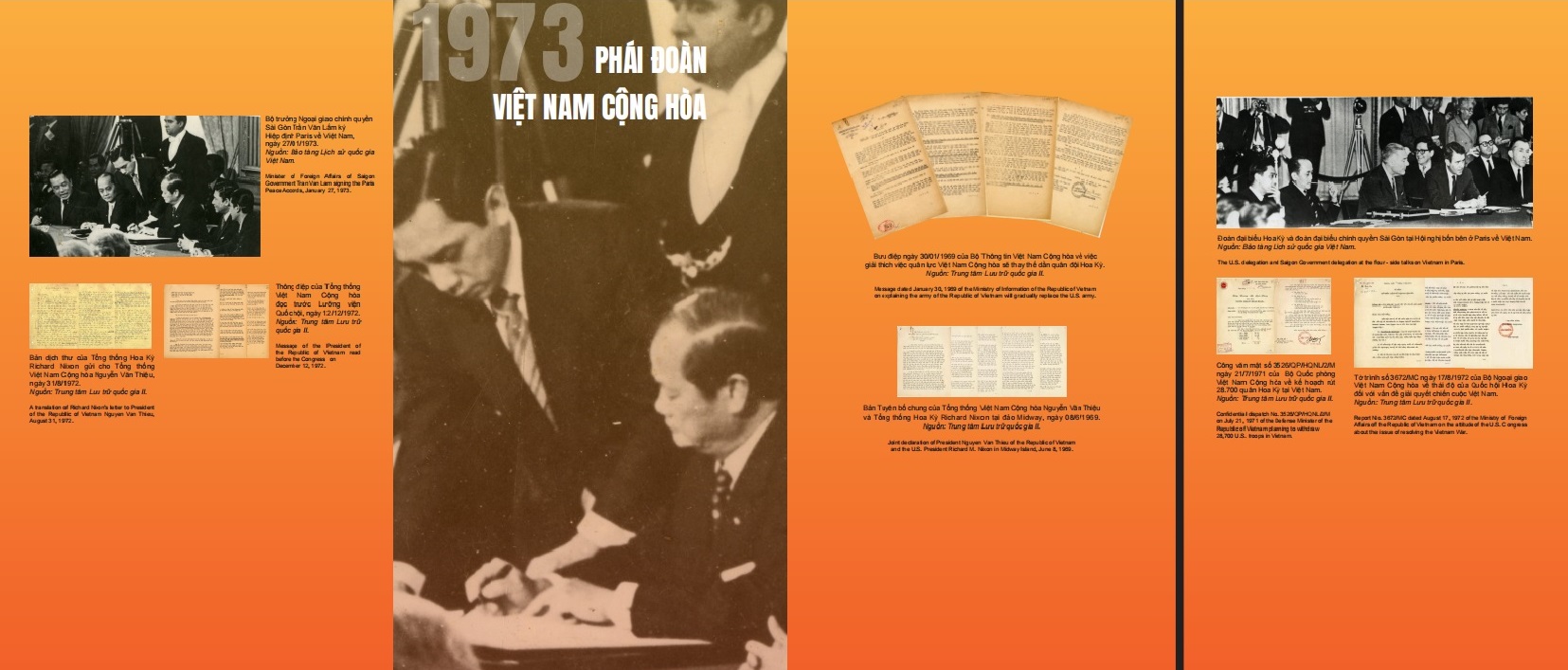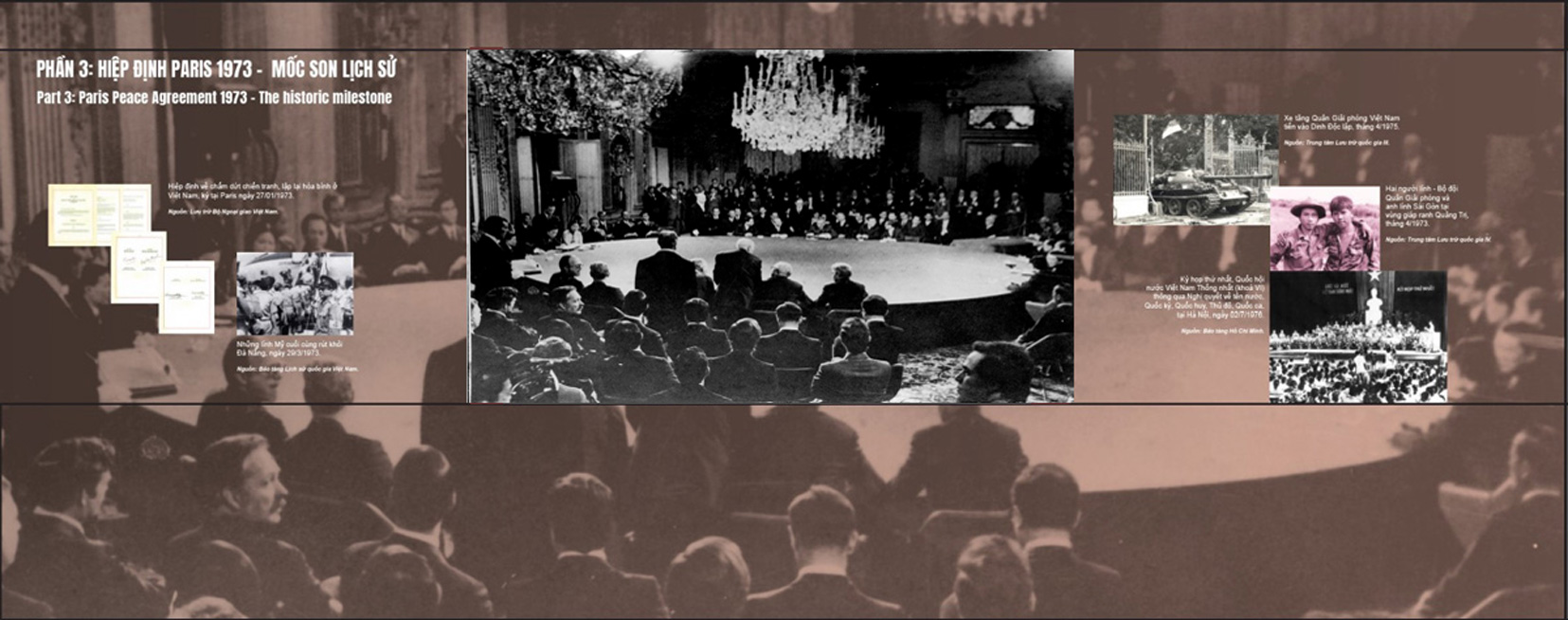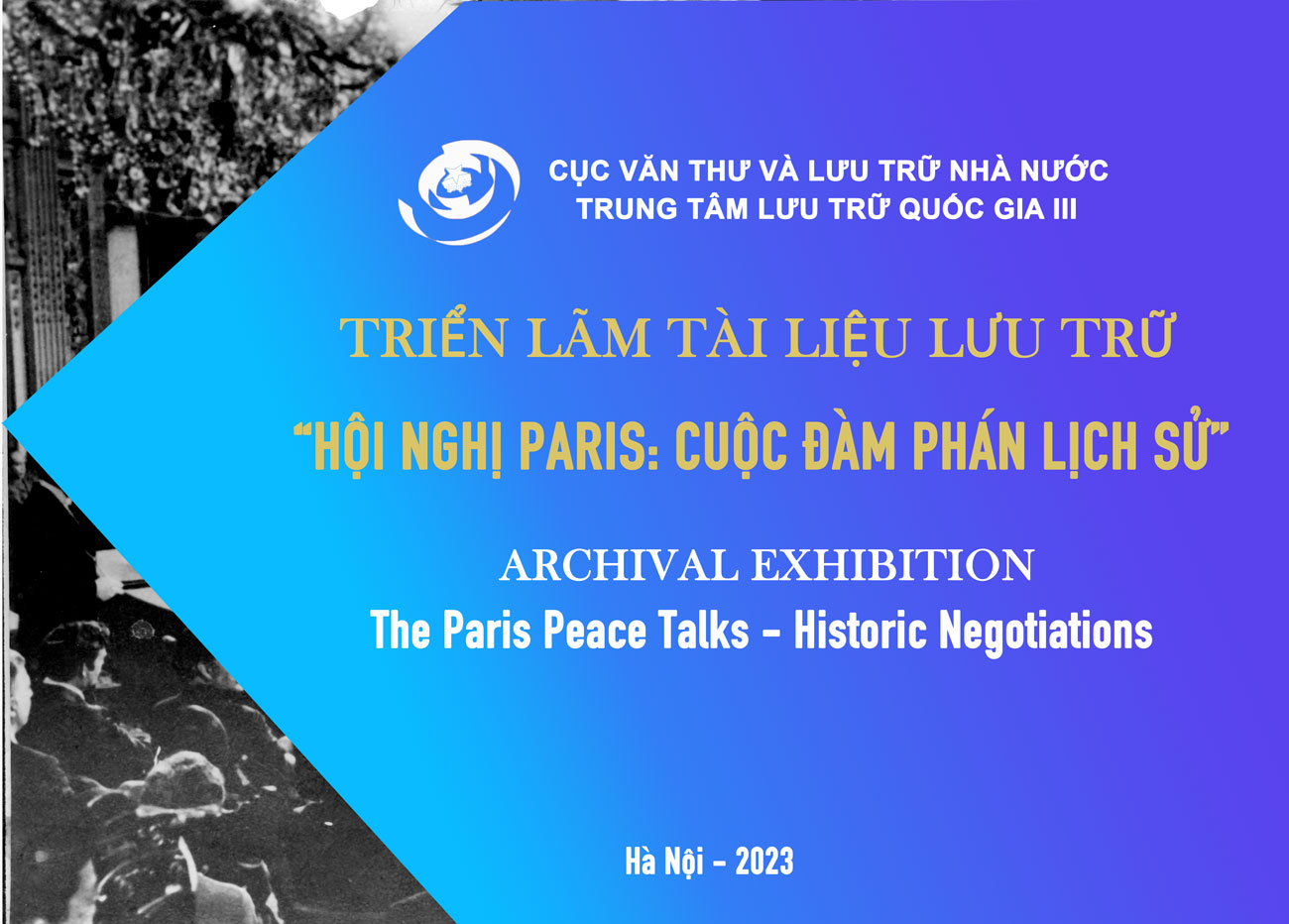
INTRODUCTION
After nearly 4 years and 9 months of negotiations, with difficult and complicated developments, on January 27, 1973, an Agreement on Ending the War and Restoring peace in Vietnam was signed by the participating sides. This event is a brilliant milestone of Vietnam’s history, an important victory on the diplomatic front, marks a new development step of the Vietnamese revolution. The withdrawal of the United States troops made a favorable condition for our people to continue to fight for liberating the South Vietnam and reunifying the country.
On the 50th anniversary of the victory “Dien Bien Phu in the Air” and heading toward 50th anniversary of the signing of Paris Peace Accords (January 27, 1973 – January 27, 2023), National Archives Center No. 3 hold an exhibition on archival entitled: “Paris Peace Talks – Historic negotiations”.
The Exhibition includes three parts:
1. Part 1: The progress towards negotionations in Paris
2. Part 2: Paris Peace Talks – A battle of strong wits
3. Part 3: Paris Peace Accords: The historic milestone
The exhibition introduces more than 200 documents, photos and artifacts related to history situation, the negotiating process and result of the historic negotiations 50 years ago on on Ending the War and Restoring peace in Vietnam.
By carrying out this exhibition, the Organizers wishes to promote the values and improve the efficiency of the use of archival documents, as well as make a contribution in fostering and educating the spirit of resilience, indomitableness, patriotism, love of independence and freedom and praising the heroic tradition of the Vietnamese nation.
Hanoi, September 2023
THE ORGANIZERS
✧ EXHIBITION SPACE ✧
✧ TRAILER VIDEO ✧
✧ INTRODUCTIONS ✧
✧ PART II - Paris Peace Talks – A battle of strong wits ✧
INTRODUCTIONS
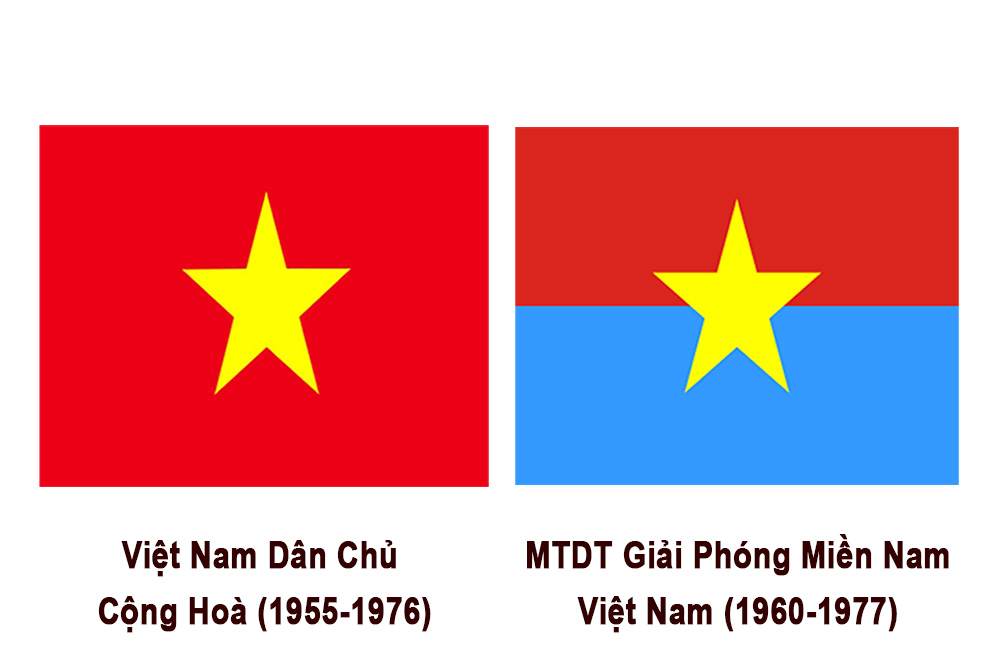
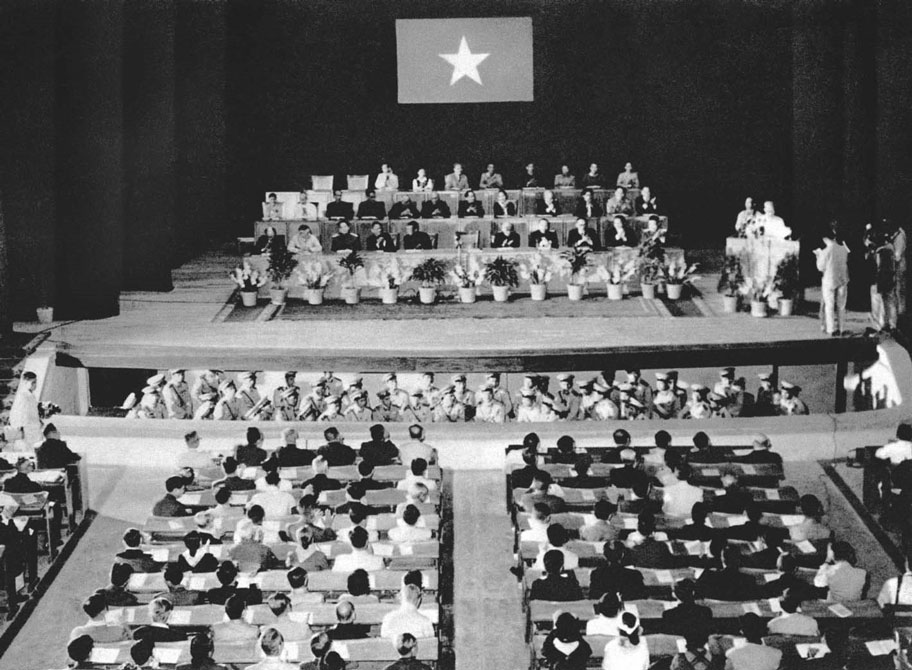
President Ho Chi Minh read a report at the Special Political Conference in Hanoi, March 1964 on prososing specific tasks to build the North and supportting for the resistance war in the South.
Source: National Archive Center No.3.

Workers at Dong Xuan knitting company (Hanoi) in the emulation movement "each person worked as two persons for the South" in 1964.
Source: National Archive Center No. 3, Collected photo.
“War can last 5 years, 10 years, 20 years or longer. Hanoi, Hai Phong and some cities and factories may be destroyed, but the Vietnamese people are determined to 2. not scared!"
Quotation from President Ho Chi Minh’s Appeal in 1966.

Lines of trucks carrying goods and weapon to the front, June 1967.
Source: Vietnam National Museum of History.
Rice can't lack any kilograms,
The army can't lack any person

Minister Nguyen Xuan Thuy, Colonel, Ambassador Ha Van Lau and took a photo with French friends who helped the delegation in Paris in 1967.
Source: National Archives Center III, The photo documents of Colonel, Ambassador Ha Van Lau, No. 195
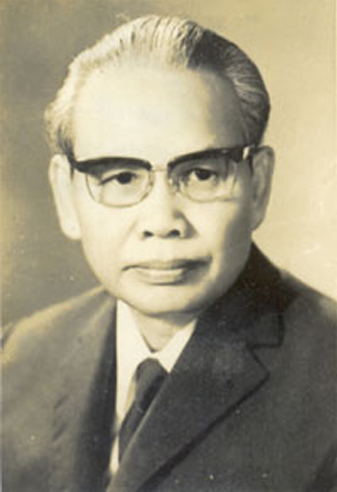
Mr. Xuân Thủy (1912-1985) was Minister of Foreign Affairs and then head the the Party External Relations Department before leading the DRVN delegation at the Paris Conference from the beginning 1968 to the end 1973.
Portrait of Minister Nguyen Xuan Thuy.

Soldiers of the Liberation Army of Tri Thien - Hue study the sand table, preparing for the battle of the 7th Armored Battalion Nguyen in Tam Thai (Hue), January 31, 1968.
Source: Vietnam News Agency, No. MN4316.

The Liberation Army of Saigon - Gia Dinh took the oath, received the mission before the departure time, 1968.
Source: Vietnam News Agency, No. MN4417.
03/4/1968:
The Government of the Democratic Republic of Vietnam declared its
readiness to send a representative to contact the American representative
to determine the conditions in which a one-on-one conversation could begin.
“…military and political struggle in the South are key factors for victory and foundation for victory on diplomatic front”
Complete works of Party documents, the National Politics Publishing House, Volume 28, page 74.
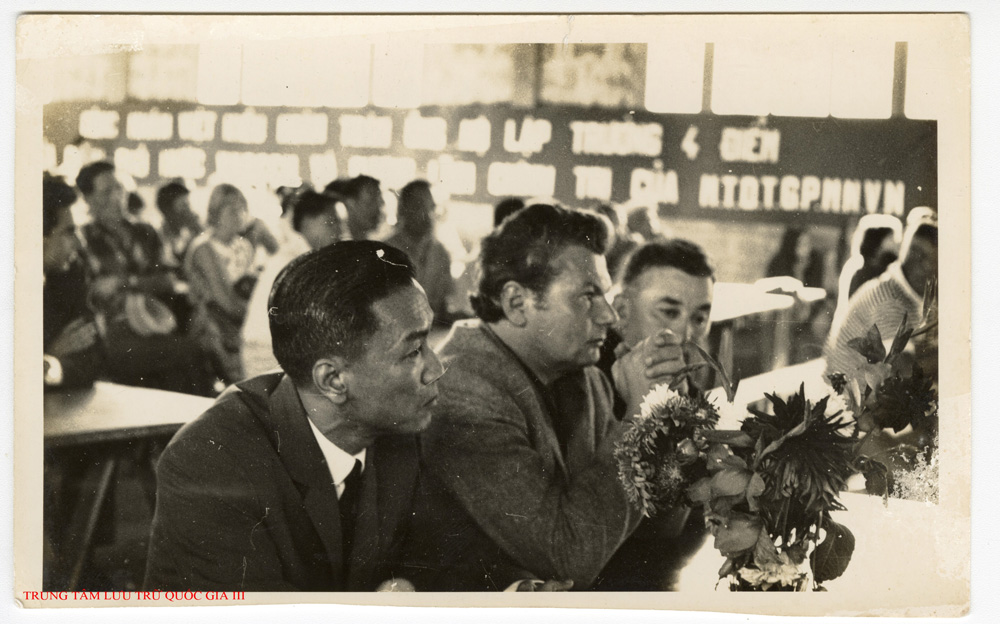
Colonel, Ambassador Ha Van Lau attended the Conference calling on the world people to support the war against the U.S. imperialists invading Vietnam in 1968 - 1969 .
Source: National Archives Center III, The photo documents of Colonel, Ambassador Ha Van Lau, No. 203.
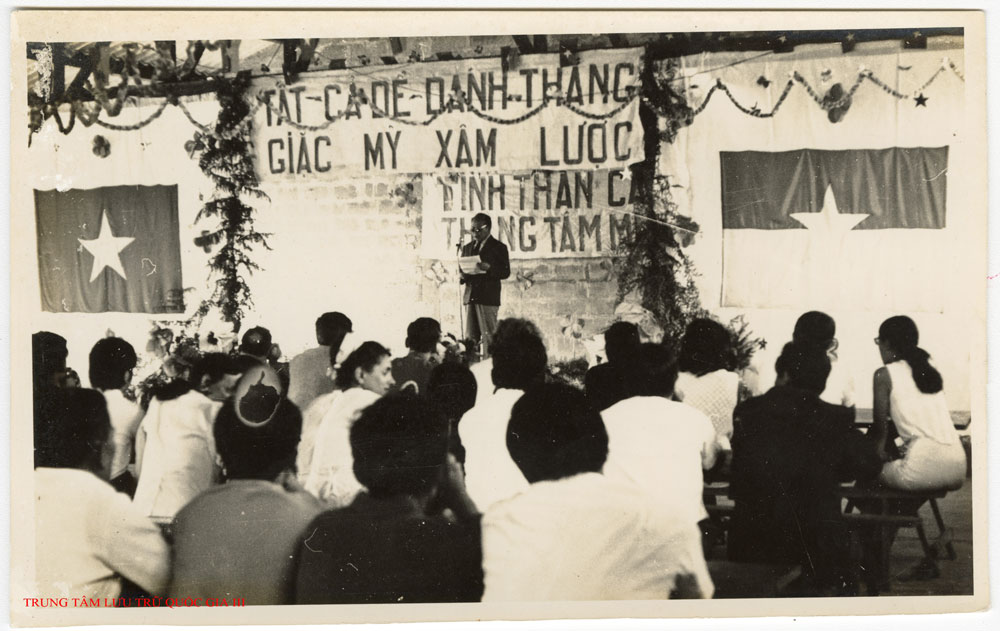
Colonel, Ambassador Ha Van Lau attended the Conference calling on the world people to support the war against the U.S. imperialists invading Vietnam in 1968 - 1969 .
Source: National Archives Center III, The photo documents of Colonel, Ambassador Ha Van Lau, No. 203.
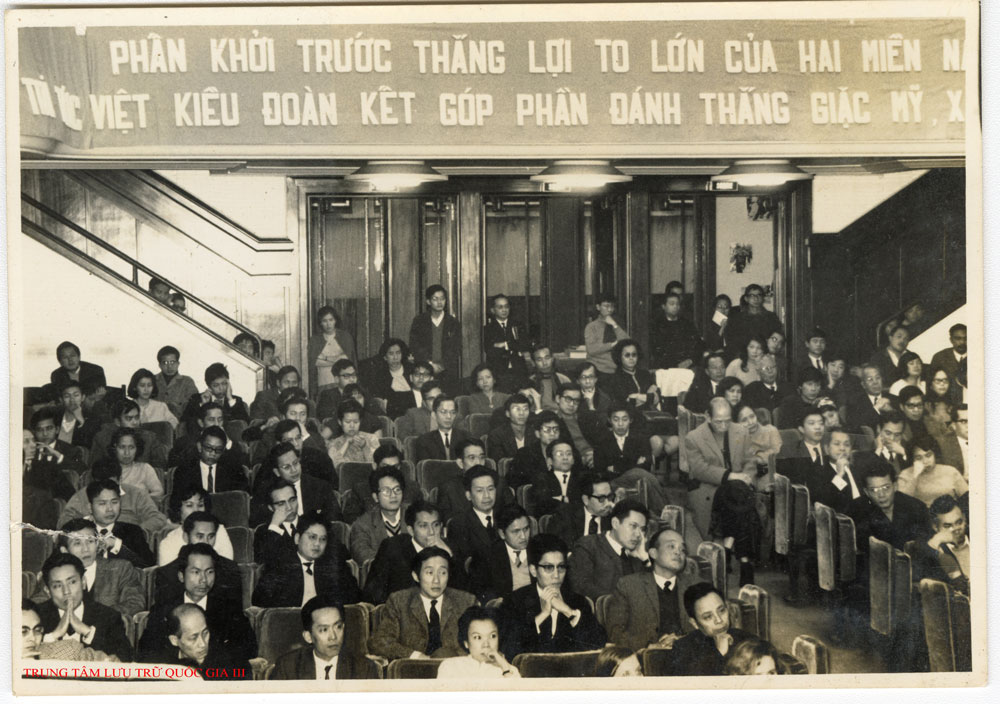
Vietnamese overseas in France greetting and supporting the Vietnamese Government delegation in Paris, 1968.
National Archives Center III, The photo documents of Colonel, Ambassador Ha Van Lau, No. 204.1.
All is aimed at defeating the American invader and liberating the South.

Head of the delegation of the Government of the Democratic Republic of Vietnam Xuan Thuy arrived in Paris for official talks with the representative of the U.S. Government, May 9, 1968.
Source: Vietnam National Museum of History.
The Government of the Democratic Republic of Vietnam decided to appoint Minister Xuan Thuy as its representative for official talks with the representative of the U.S. Government, confirmed with the U.S. on the unconditional cessation of bombing and all other war actions against the Democratic Republic of Vietnam, and then talked about other issues related to the two sides.
Source: National Archives Center No. 2, Fonds Presidential Palace of Second Republic of South Vietnam, File 865, Page 04.
13/5/1968:
Paris conference on Vietnam opens
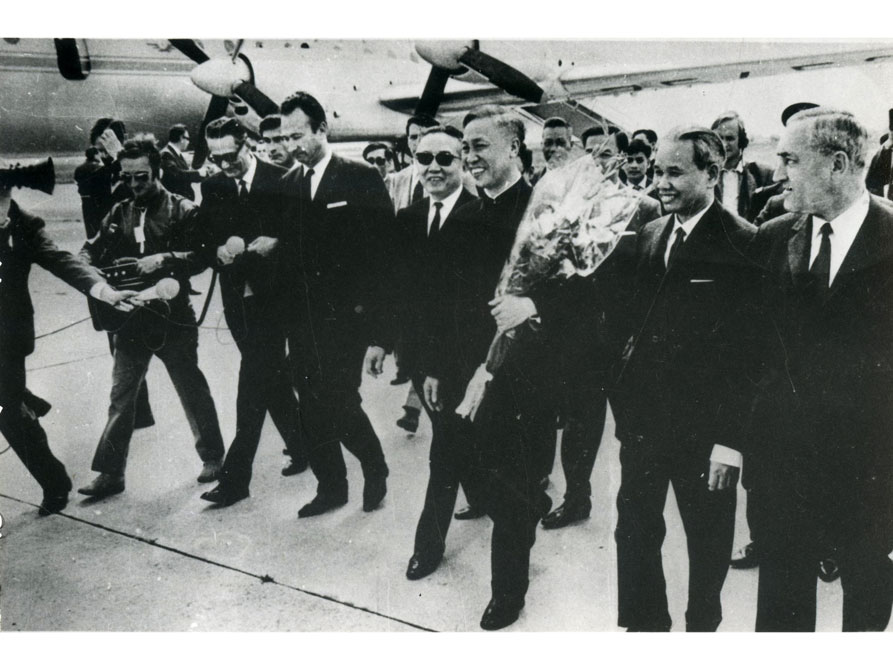
Welcoming Special Advisor to the Government of the Democratic Republic of Vietnam Le Duc Tho at Bretigny Airport (France), June 3, 1968
Source: Vietnam National Museum of History.
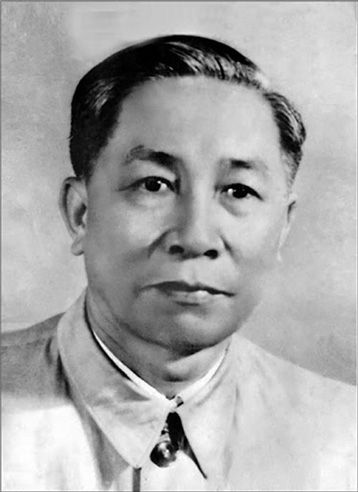
Portrait of Le Đuc Tho (1911-1990), Special Advisor for the Paris Peace Talks.
Portrait of special advisor Le Duc Tho
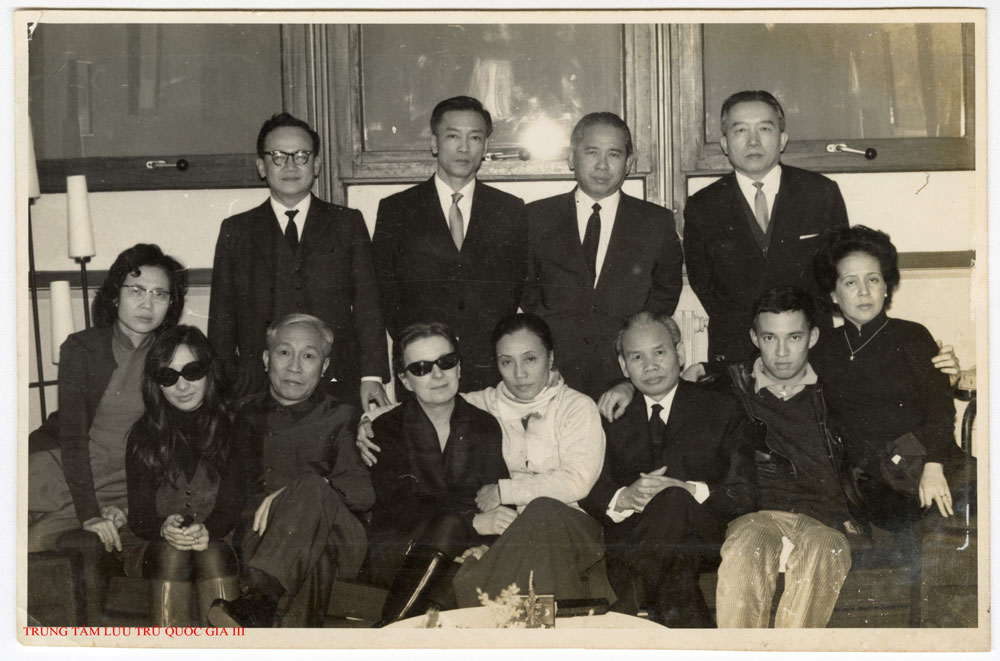
Special Advisor Le Duc Tho, Ms Nguyen Thi Binh, Minister Xuan Thuy, Colonel, Ambassador Ha Van Lau took a phot with international delegates in Paris in 1968.
National Archives Center III, The photo documents of Colonel, Ambassador Ha Van Lau, SLT199.2.
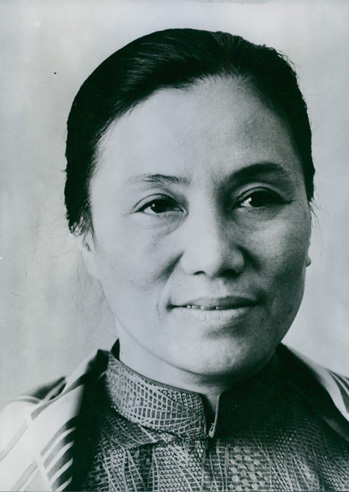
The National Front for the Liberation of South Vietnam:
Ms. Nguyễn Thị Bình (1927), served as the PRG foreign minister until 1976, when she became Minister of Education for unified Vietnam. She later served as Vietnam’s vice-president for ten years.
Portrait of Minister of Foreign Affairs Nguyen Thi Binh

Comrade Le Duan - First Secretary of the Central Committee of the Party (in the middle) received the negotiating delegation of the National Front for the Liberation of South Vietnam before the delegation went to France, Hanoi, October 1968.
Source: Ministry of Foreign Affairs

Poster of the International Student Week for the victory of the Vietnamese people with the slogan "Stop bombing the Democratic Republic of Vietnam", November 17-30, 1968.
Source: Russian State Archives of Social and Political History, Fonnds of 654, Index 30, file 385, Page 01.

The delegation of the National Front for the Liberation of South Vietnam in meeting at the headquarters of the delegation in Verrières-le-Buisson (France), December 1968.
Source: Vietnam National Museum of History.
For independence, for freedom,
Fight so the Americans leave, fight so the puppets collapse
Rise up! Warriors and Compatriots,
North – South reunite, Each spring will be even more joyful!
President Ho Chi Minh’s New Year’s poem in 1969 (Ky Dau).
June 06th, 1969:
The provisional Revolutionary Government of the Republic of South Vietnam.
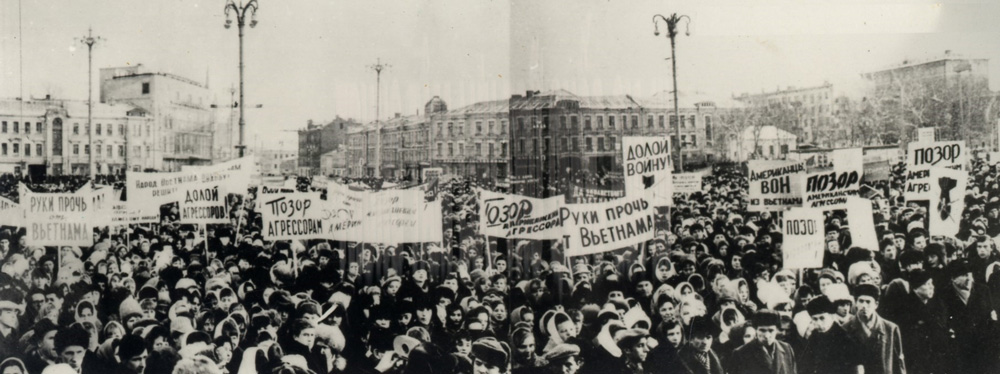
A view of the square where the demonstration supporting Vietnam took place in Moscow, 1970.
Source: National Archives Center III, Photo index of Organ block, No. 7923.
The North Vietnam shot down 4000th U.S aricraft.
Source: The People Newspaper, October 19, 1972.

General Vo Nguyen Giap approved the plan to fight the U.S. B52 aircraft in Hanoi in 1972.
Source: Vietnam National Museum of History.
18/12/1972 - 30/12/1972:
The North Vietnam shot down 81 B-52s and 34 F11s of the United States.

The Long Bien Bridge in Hanoi destroyed by bombing in 1972.
Source: National Archives Center No. 3, Fonds of Photographer Nguyen Ba Khoan, No. 1177-1018.

The 100mm artillery field of self-defense force in Dong Da ward, Hanoi city.
Source: National Archives Center No. 3, Collected photo.

Anti-aircraft artillery battle in Nghia Dung commune, Tu Liem district, on the suburb of Hanoi in 1972.
Source: National Archives Center No. 3, Colected photo.

The wreckage of a U.S. B-52 bomber crashed in Dinh Cong, Hanoi, on December 26, 1972.
Source: National Archives Center No. 4, Photo of Chu Chi Thanh.
January 27, 1973:
The Agreement on Ending the War and Restoring Peace in Vietnam.
INTRODUCTIONS
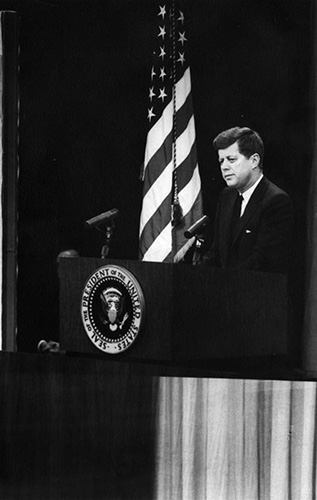
President John F. Kennedy speaking at a press conference at the Department of State, Washington DC, 1961.
Source: The U.S. National Archives and Records Administration
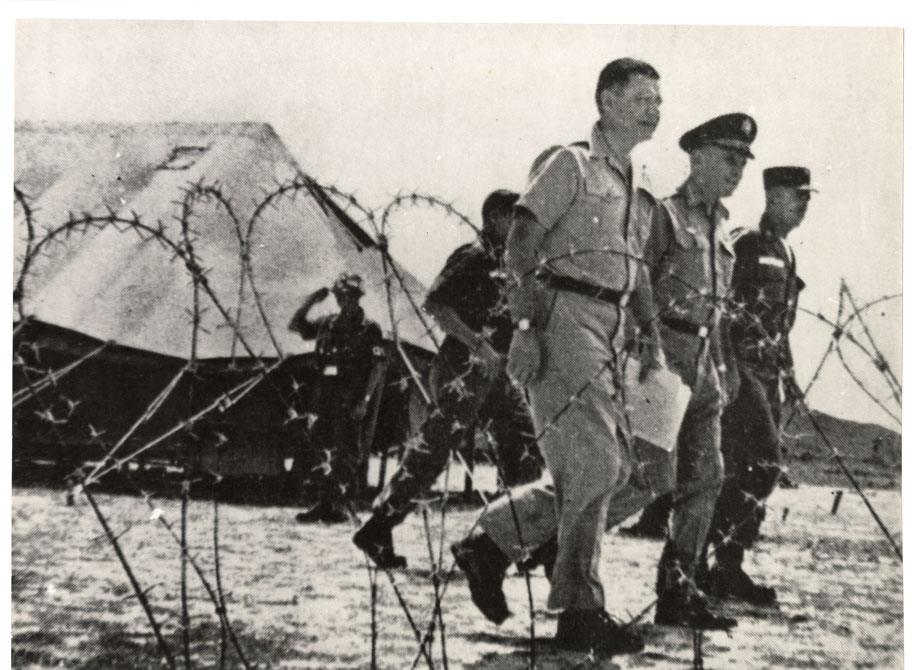
US Secretary of Defense McNamara inspects a military base in South Vietnam in 1963.
Source: National Archives Center No. 3
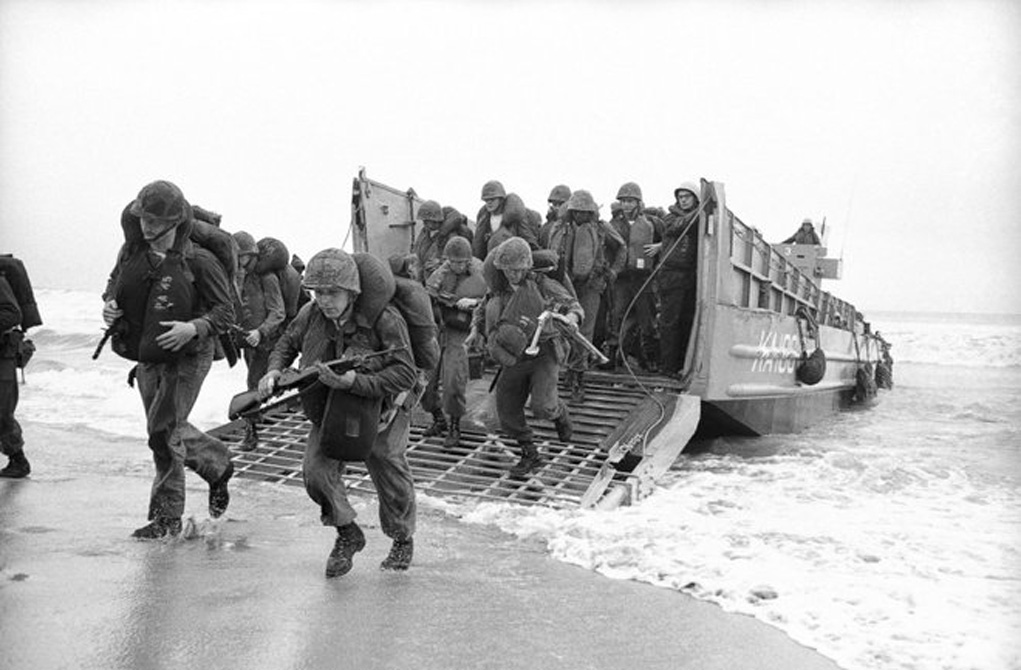
US marines landed in Da Nang city, March 8, 1965.
Source: National Archives Center No. 3, collection documents

A first American ground troops land in Vietnam in 1965.
Source: The U.S. National Archives and Records Administration.
INTRODUCTIONS
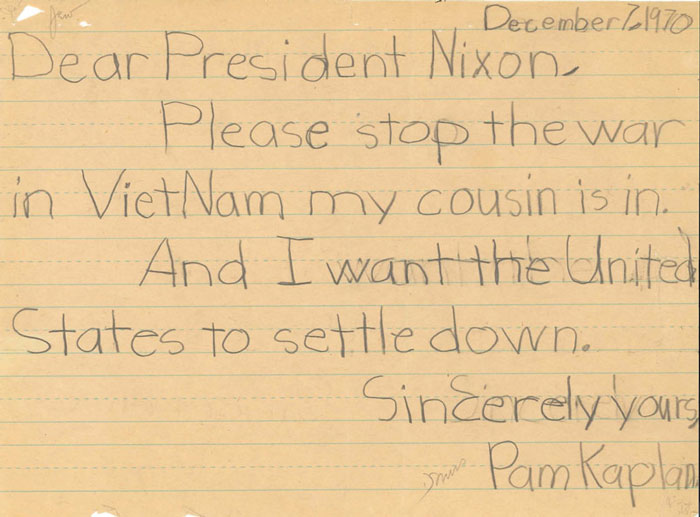
Letter of Pam Kaplan, whose cousin was in Vietnam to U.S. President Richard M. Nixon, December 7th, 1970.
The U.S. National Archives and Records Administration, No. 6721944.
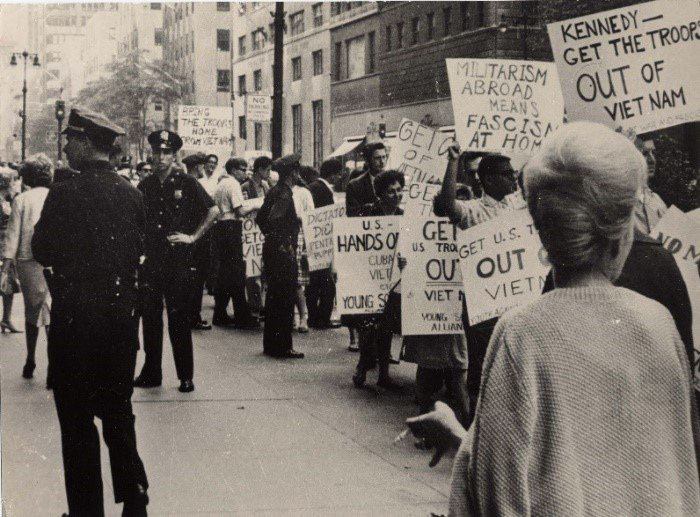
Resistance of U.S. citizen to the Government in Vietnam war.
Source: The U.S. National Archives and Records Administration

The March on the Pentagon, Pittsburg Veterans for Peace
Source: The U.S. National Archives and Records Administration.
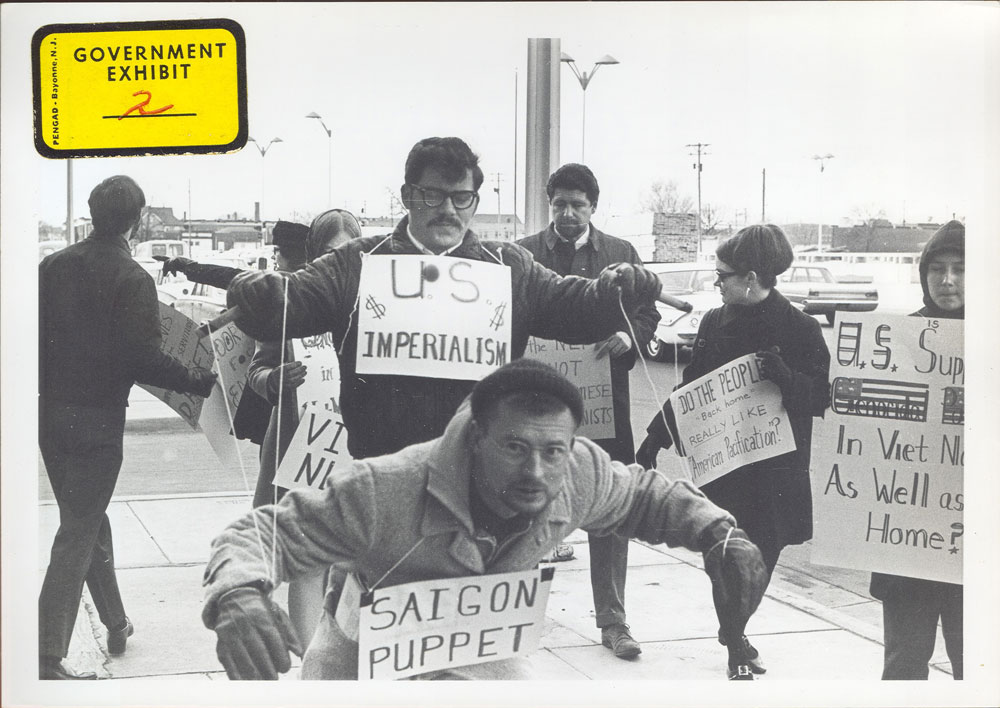
Sự phản đối của công dân Hoa Kỳ đối với Chính phủ Hoa Kỳ về cuộc chiến ở Việt Nam.
Source: The U.S. National Archives and Records Administration
INTRODUCTIONS
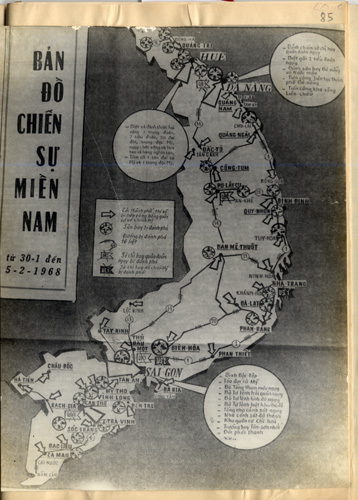
Map of the war in the South from January 30 to February 5, 1968.
Source: National Archives Center No. 3.
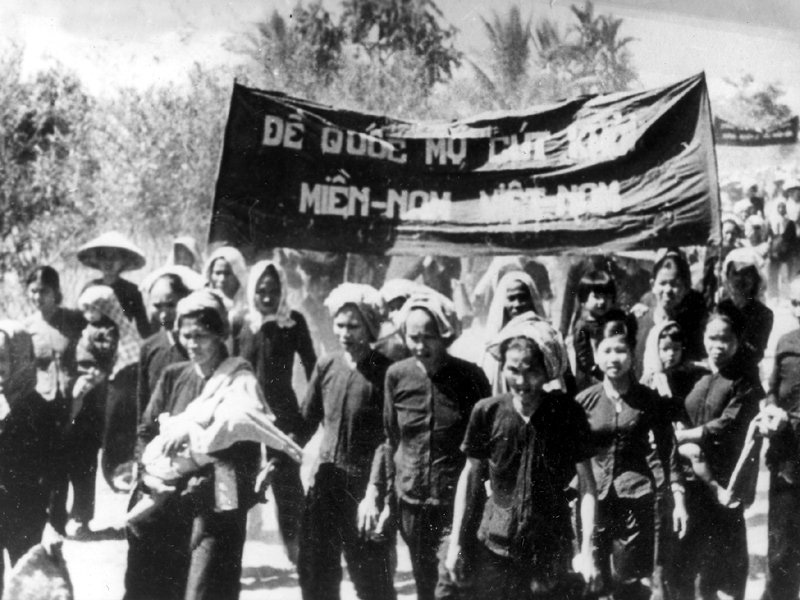
The people of the South protested against the US imperialist invasion.
Source: Ho Chi Minh Museum.
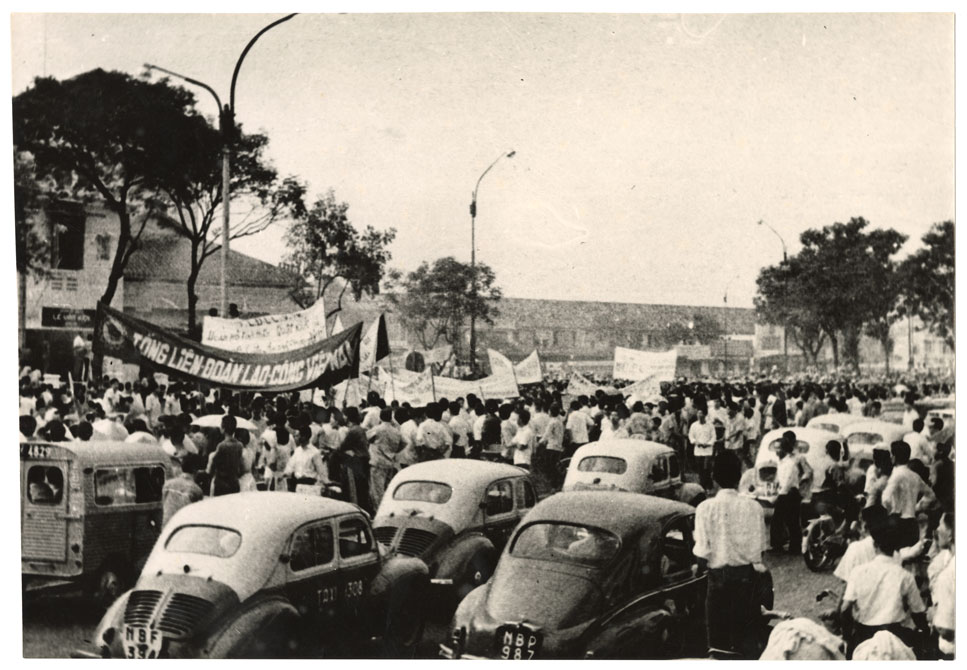
Struggle of the Southern people in the 60s of the twentieth century.
Source: National Archives Center No. 3.
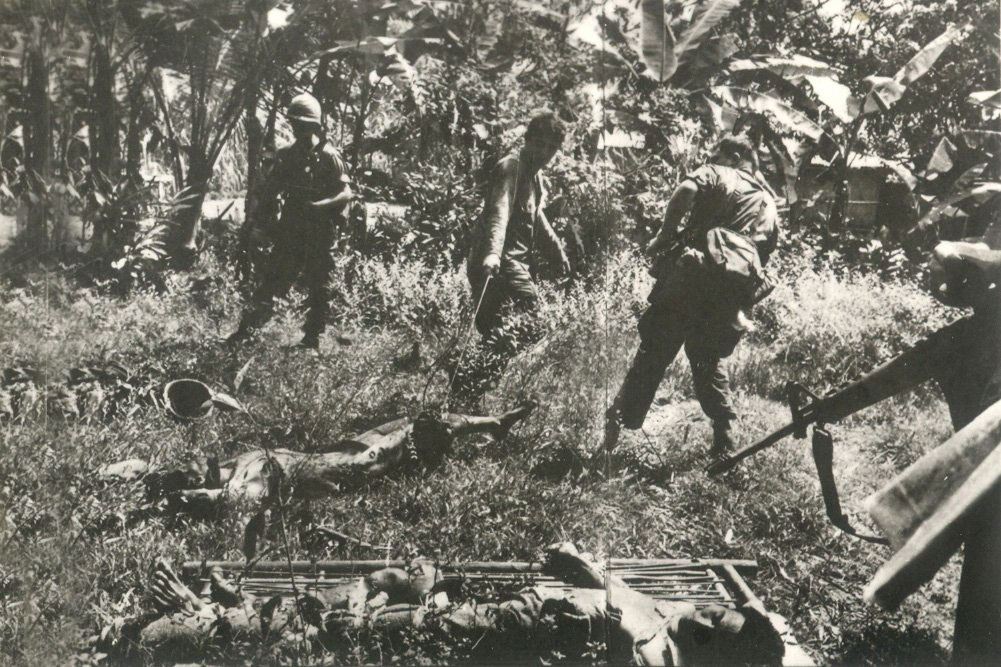
American soldiers massacred the people of South Vietnam in Son My village, Tinh Khe commune, Son Tinh district, Quang Ngai province, March 16, 1968.
Source: National Archives Center No. 3.

Map of Saigon Defense of the U.S. Embassy; 1/31/1968; 101st Airborne Division Headquarters (Attack on U.S. Embassy during Tet Offensive).
Source: The U.S. National Archives and Records Administration, No 595397.
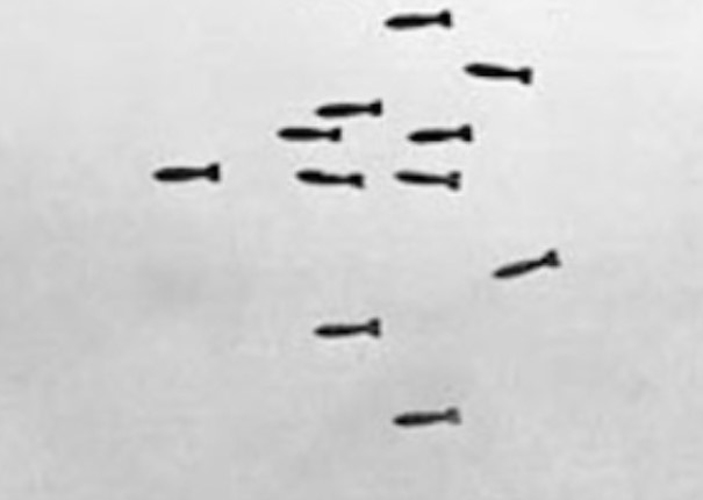
10,000 tons of bombs were dropped on Hanoi.
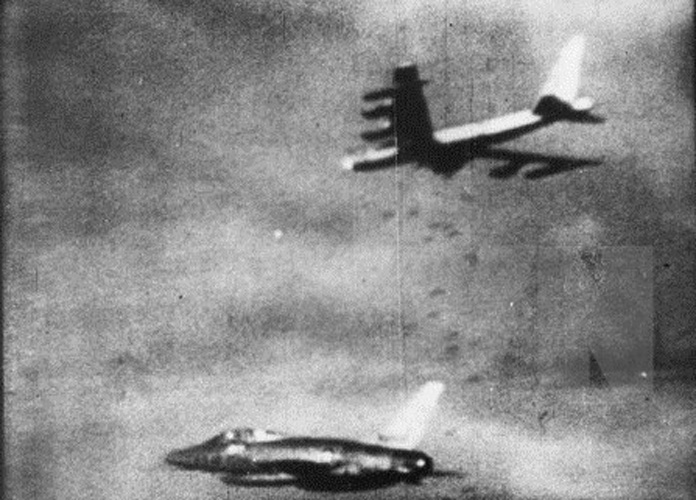
1,400 times planes bombarded the sky over Hanoi.
Bombs lined up as preparations are made for LINEBACKER Operations over North Vietnam, December 15, 1972.
Source: The U.S. National Archives and Records Administration
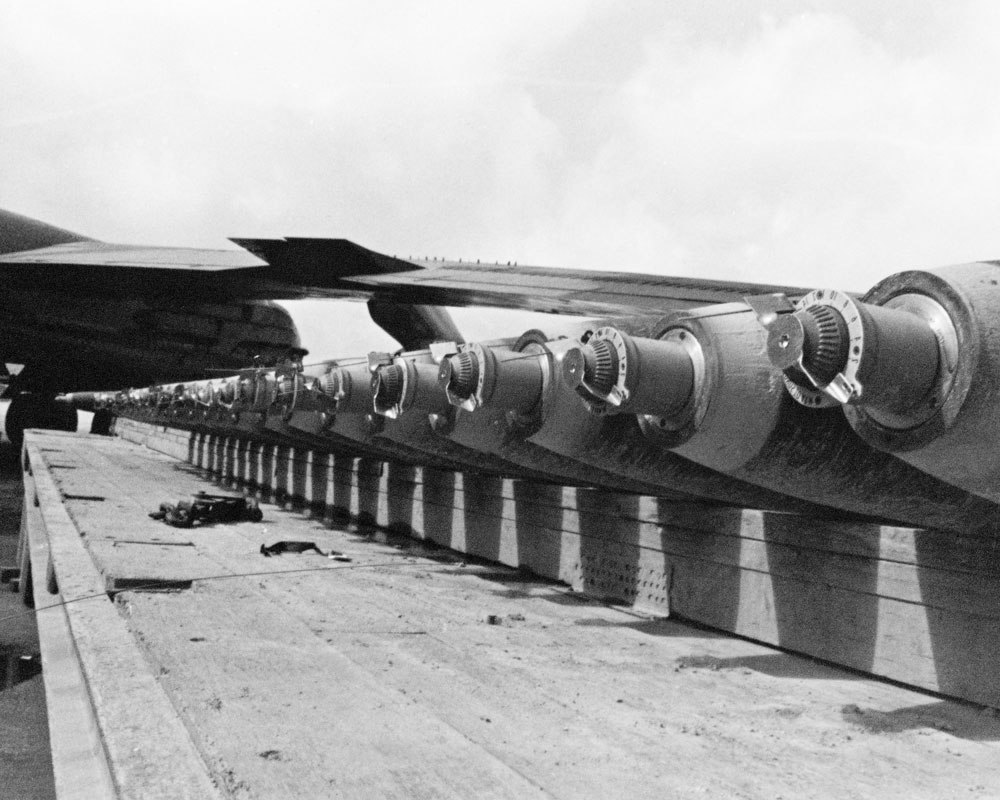
President Johnson and Secretary of Defense Robert McNamara of the United States at a Cabinet Meeting, January 07, 1968.
Source: The U.S. National Archives and Records Administration.

March 31, 1968:
President Johnson of the United States announced stopping bombing the
North from the 20th parallel and beyond and agreed to negotiate with
the Democratic Republic of Vietnam.
The delegation of the U.S. Government attending the opening session of the official talks between representatives of the Government of the Democratic Republic of Vietnam and representatives of the U.S. Government in Paris, May 13, 1968 at International Conference Center (Kléber Street, Paris, France).
Source: National Archives Center No. 3, The photo index of Ministry of Foreign Affairs, No. 2976-427.

The U.S. delegation and Saigon Government delegation at the four - side talks on Vietnam in Paris.
Vietnam National Museum of History.

INTRODUCTIONS
After careful consideration of many sites, Vietnam and the Uniter States finally chose Paris as the locus of the negotiations. For Vietnam, Paris was a distant and expensive city but, on the other hand, a fovorable location to take advantage of international public opinion in support of Vietnam’s struggle.
Quotation from “Paris Conference on Vietnam, looking back, 1968-1973, page 27”
Looking down Kléber Street toward the Arc de Triomphe, with Kléber International Conference Center.
Source: National Archives Center No.3, Fonds of Colonel, Ambassador Ha Van Lau, No. 208.22.

Darthé street, the first site of private talks hosted by the the delegation of Democratic Republic of Vietnam.
Source: National Archives Center No.3, Fonds of Colonel, Ambassador Ha Van Lau, No. 208.7.

03/6/1968:
Politburo member of Vietnamese workers’ Party, Special Advisor Le Duc Tho of
the delegation of Democratic Republic of Vietnam arriving at Le Bourget Airport,
Paris on June 3, 1968.
Mr. Le Duc Tho (1911-1990) form Nam Dinh Province in the northern delta was a revolutionary activist as a youth. The Frenck imprisoned him twice (1930-1936, 1939-1944). He was elected to the Party’s Central Committee in 1944 and served as Party secretary for the North when Vietnam had three sectors: North, Center and South. From 1948 until 1954, he was deputy Party secretary for the South and headed the Party’s Administrative Office in the South. In Accordance with the Geneva Agreements, he regrouped to the North in 1955, when he became a Pitburo member. He was working in the South in 1968, when President Ho Chi Minh called him out to Hanoi to serve as special advisor for the Paris Talks. After Paris, Le Duc Tho held senior leadership positions until his retitement in late 1968.
The gate to 11 Darthé sreet, the first site of private talks hosted by the delegation of Democratic Republic of Vietnam.
Source: National Archives Center No.3, Fonds of Colonel, Ambassador Ha Van Lau, No. 208.6.

The headquarter of the delegation of Democratic Republic of Vietnam participating in the Paris Peace Talks at Choisy-le-Roi.
Source: The Archives Department of the Central Office of the Communist Party of Vietnam, Fonds 66, Index 01, Store unit 264.
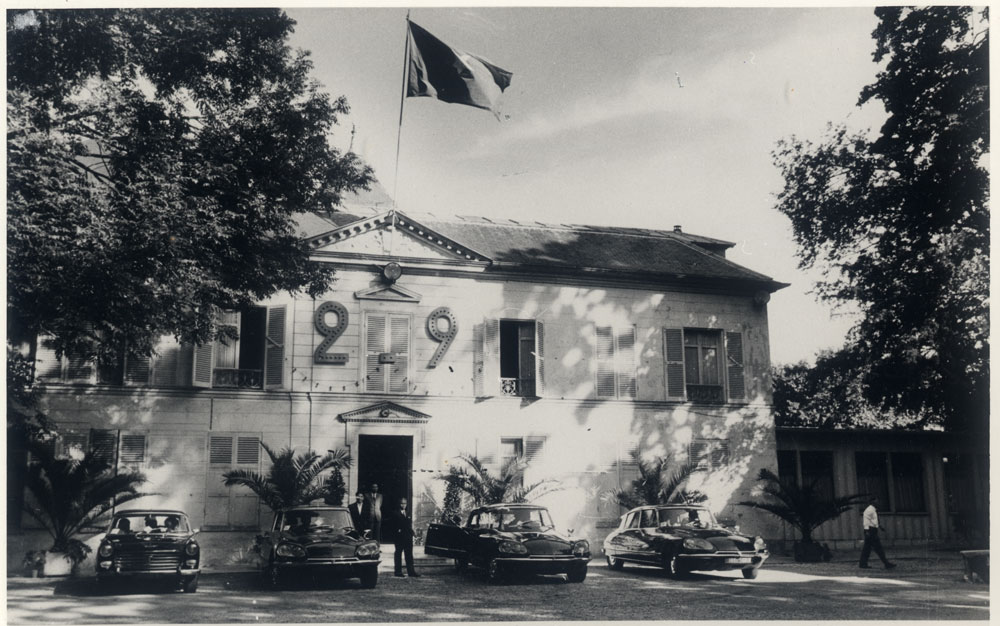
The headquarter of the delegation of the National Front for the
Liberation of South Vietnam participating in the Paris Peace Talks.
Note: This house in the suburb of Paris was arranged
by the French Communist Party for the headquarter and house
of the delegation of the National Front for the Liberation of
South Vietnam. Ms. Nguyen Thi Binh and Ms. Pham Thi Thanh Van
shared a small room on the third floor under the eaves.
The back yard included a garden with fruits and vegetables,
beyond the house and garden was a pond with swans.
National Archives Center No.3, Fonds of Colonel, Ambassador Ha Van Lau, No. 208.20.
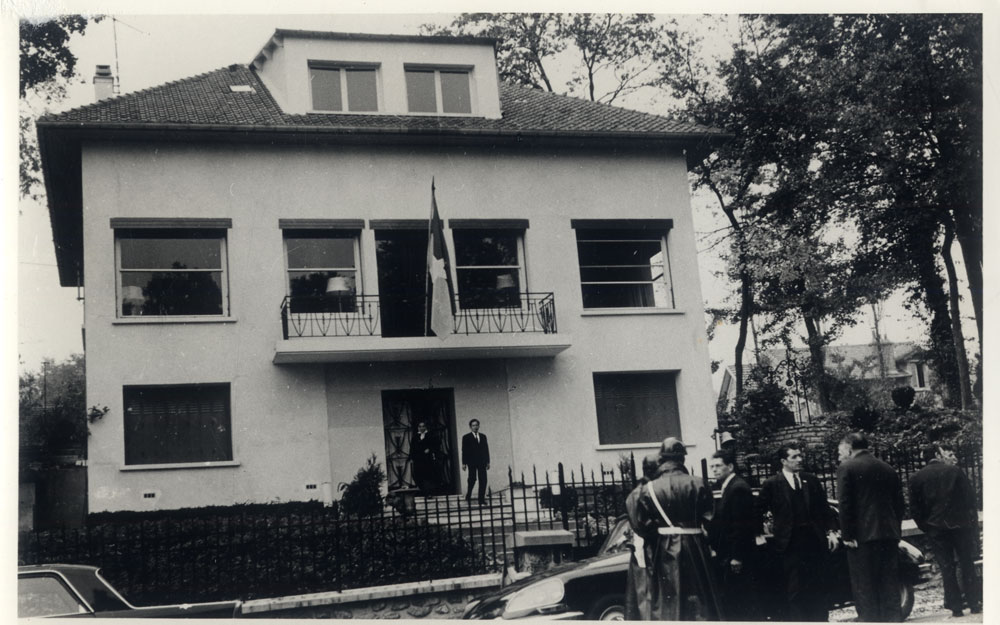
The Vietnamese motorcade in transit was accompanied by a police car and police motorcycles in two sides.
Source: National Archives Center No.3, Fonds of Colonel, Ambassador Ha Van Lau, No. 208.18.
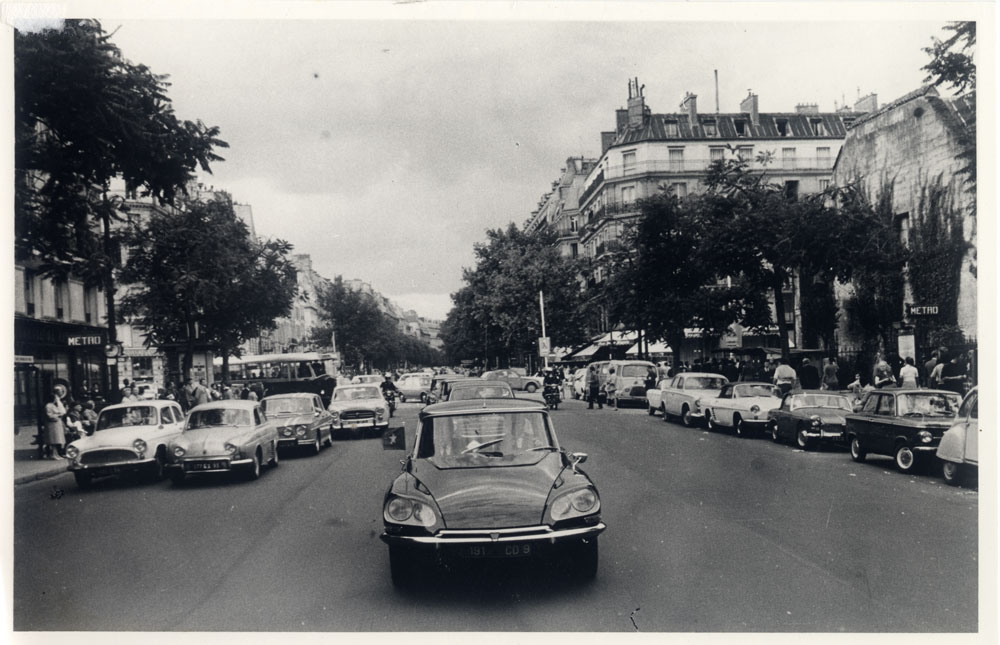
View of Gif-sur-Yvette Street in the suburb of Paris in 1972.
Source: National Archives Center No.3, Fonds of Colonel, Ambassador Ha Van Lau, No. 208.04.
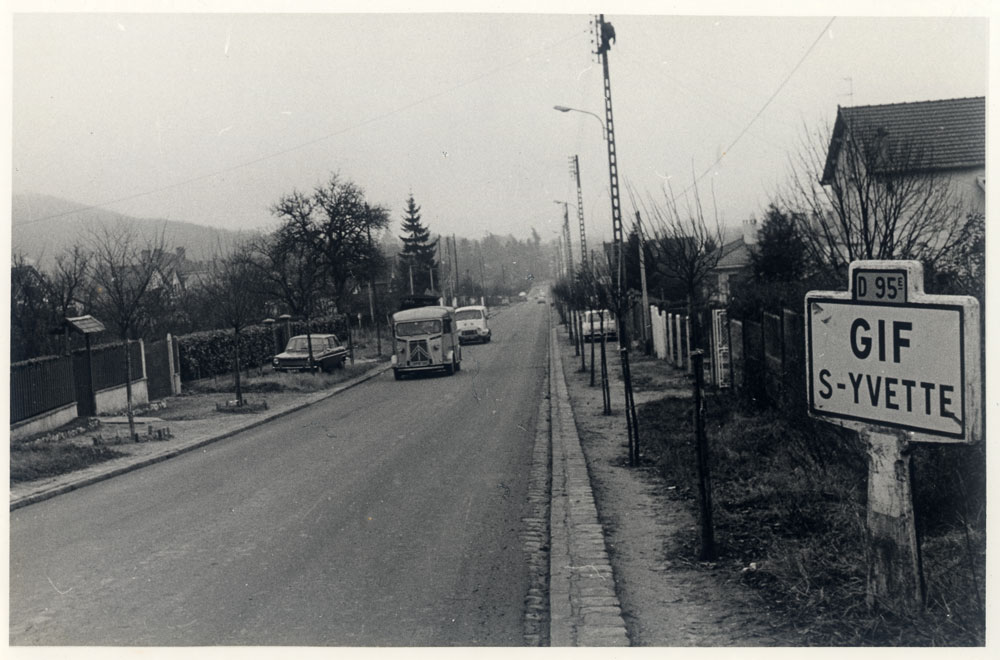
The house where the the delegation of Democratic Republic of Vietnam made pivate talks in October 1972.
Source: National Archives Center No.3, Fonds of Colonel, Ambassador Ha Van Lau, No. 208.27.
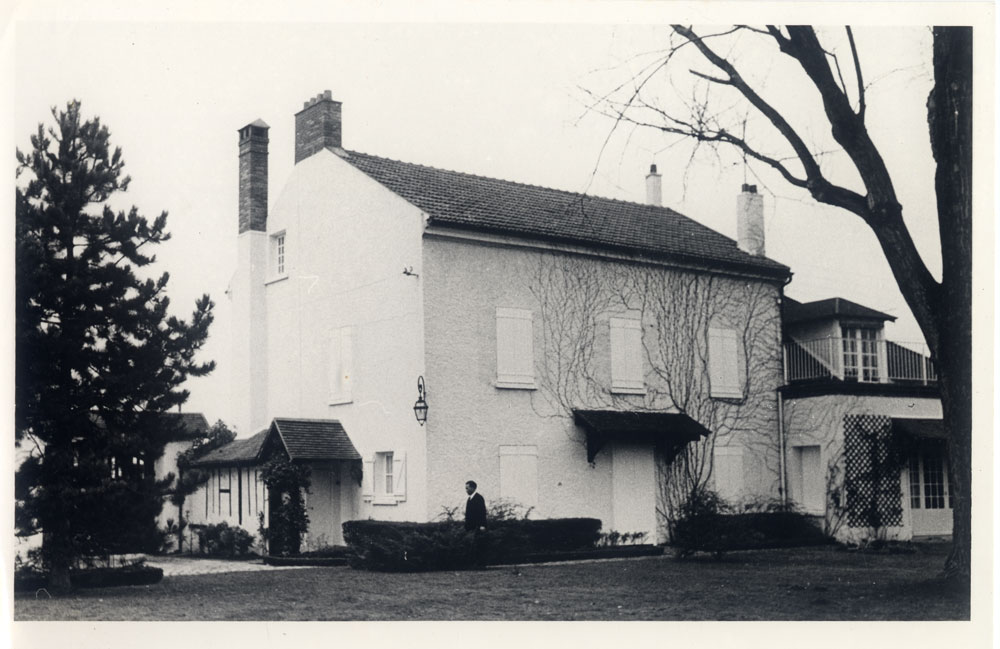
“…military and political struggle in the South are key factors for victory and foundation for victory on diplomatic front”
Complete works of Party documents, the National Politics Publishing House, Volume 28, page 74.
Part 1: The progress towards negotionations in Paris
President Ho Chi Minh’s Appeal on July 17, 1966.
Source: Ho Chi Minh Museum.
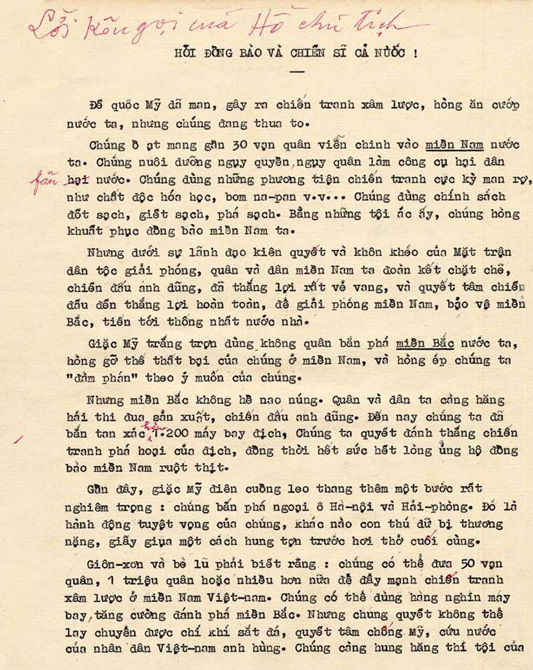
President Ho Chi Minh’s Appeal on July 17, 1966.
Source: Ho Chi Minh Museum.
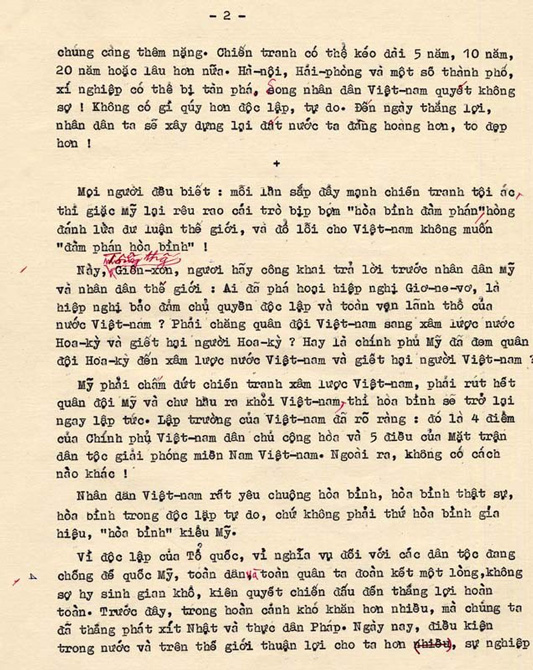
President Ho Chi Minh’s Appeal on July 17, 1966.
Source: Ho Chi Minh Museum.
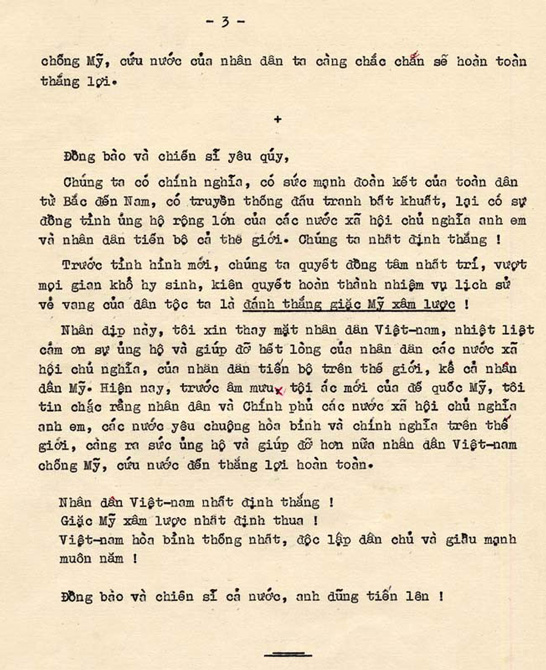
“War can last 5 years, 10 years, 20 years or longer. Hanoi, Hai Phong and some cities and factories may be destroyed, but the Vietnamese people are determined to 2. not scared!".
Quotation from President Ho Chi Minh’s Appeal in 1966.
Lines of trucks carrying goods and weapon to the front, June 1967.
Source: Vietnam National Museum of History.

Soldiers of the Liberation Army of Tri Thien - Hue study the sand table, preparing for the battle of the 7th Armored Battalion Nguyen in Tam Thai (Hue), January 31, 1968.
Source: Vietnam News Agency, No. MN4316.

The Liberation Army of Saigon - Gia Dinh took the oath, received the mission before the departure time, 1968.
Source: Vietnam News Agency, No. MN4417.

03/4/1968:
The Government of the Democratic Republic of Vietnam declared its readiness to
send a representative to contact the American representative to determine the
conditions in which a one-on-one conversation could begin.
President Ho Chi Minh's letter to the Politburo on April 9, 1968 recommended preparation for the U.S. Vietnam meeting before the Paris Peace Talks.
Source: Ho Chi Minh Museum.
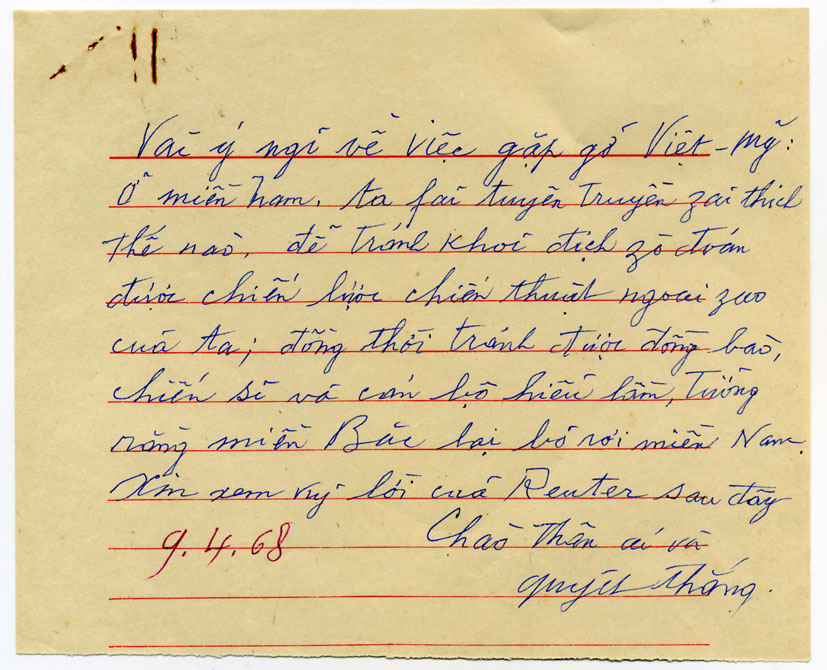
The Long Bien Bridge in Hanoi destroyed by bombing in 1972.
Source: National Archives Center No.3, Fonds of Photographer Nguyen Ba Khoan, No. 1177-1018.

Anti-aircraft gun in Dai Mo, Tu Liem, the suburb of Hanoi, in 1972.
Source: National Archives Center No.3, Fonds of Photographer Nguyen Ba Khoan, No. 1281.
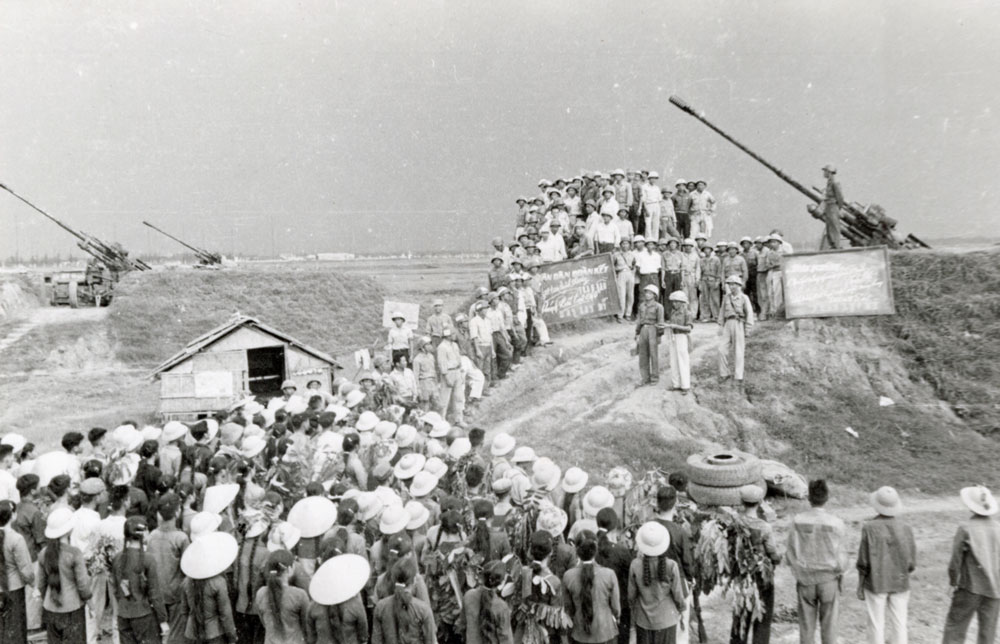
Anti-aircraft artillery battle in Nghia Dung commune, Tu Liem district, on the suburb of Hanoi in 1972.
Source: National Archives Center No.3, Collected photo.

B-52 bombers completely ruined Bach Mai Hospital in Hanoi, at 4 a.m, December 22, 1972.
Source: Journalist Chu Chi Thanh.

Kham Thien street in Hanoi felt into ruin at night of December 26, 1972.
Source: National Archives Center No.3, The photo index in the period 1954-1985 (LIV), Vol. 1, No. 798.

Map of U.S. troop marking bombing places which was collected in a plane shot down inTran Phu Street, Hanoi, at night of December 27, 1972.
Source: National Archives Center No.3, Fonds of Photographer Nguyen Ba Khoan, No. 1108-700.

A town located near Binh Ferry in Hai Phong after the bombing, 1972.
Source: Journalist Chu Chi Thanh..

Mr. Le Duan - The First Secretary of Party Central Committee (in the middle) receiving the delegation of the National Front for the Liberation of South Vietnam in Hanoi before the delegation’s departure to France, October 1968.
Source: Ministry of Foreign Affairs of Vietnam.

1965:
American ground troops land in Vietnam in 1965.
Source: The U.S. National Archives and Records Administration.

Map of Saigon Defense of the U.S. Embassy, January 31, 1968, 101st Airborne Division Headquarters. (Attack on U.S. embassy during Tet Offensice)
Source: The U.S. National Archives and Records Administration.

US President Johnson announced unilaterally stopping raiding the North from the 20th parallel and beyond; did not run for President of the United States for the second term and appoint negotiators with the representative of the Government of the Democratic Republic of Vietnam in Paris.
Confidential, urgent dispatch No. 169/MC-LHQ/M on April 20, 1968 of the Ministry of Foreign Affairs of the Republic of Vietnam on the venue for peace negotiation.
National Archives Center No. 2, Fonds Presidential Palace of Second Republic of South Vietnam’s Second Republic, File 16366, Page 08-09.
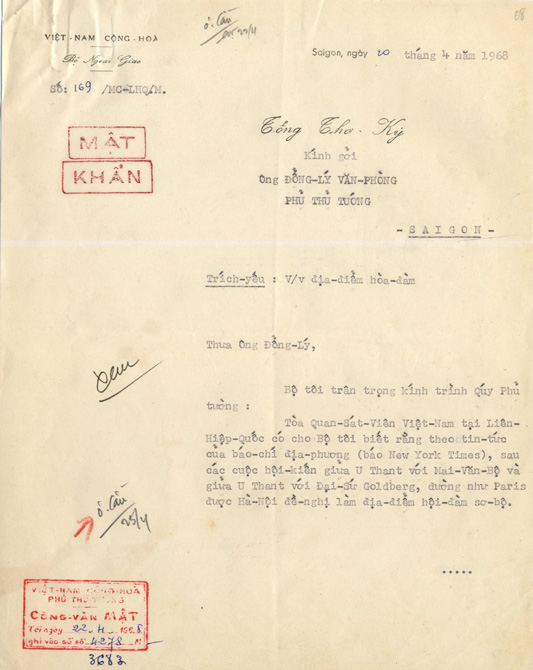
Confidential, urgent dispatch No. 169/MC-LHQ/M on April 20, 1968 of the Ministry of Foreign Affairs of the Republic of Vietnam on the venue for peace negotiation.
National Archives Center No. 2, Fonds Presidential Palace of Second Republic of South Vietnam’s Second Republic, File 16366, Page 08-09.
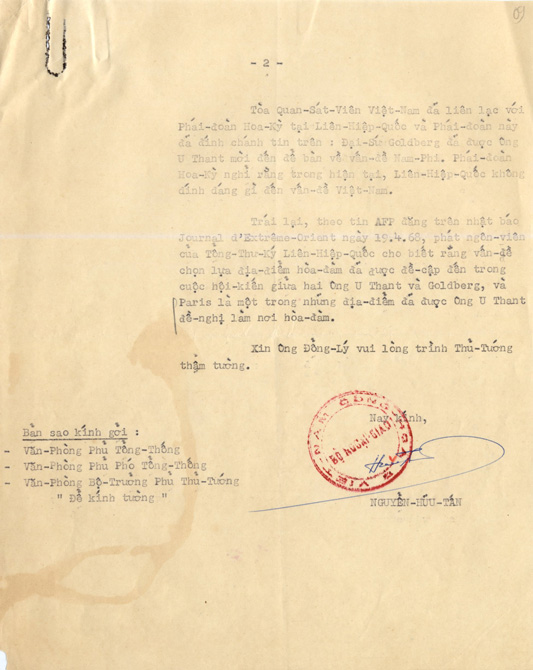
President Lyndon B. Johnson’s declaration on May 3, 1968 about the official meeting with the Government of the Democratic Republic of Vietnam in Paris.
The Archives Department of the Central Office of the Communist Party of Vietnam, Fonds 66 - Index 01, Store unit 1062.
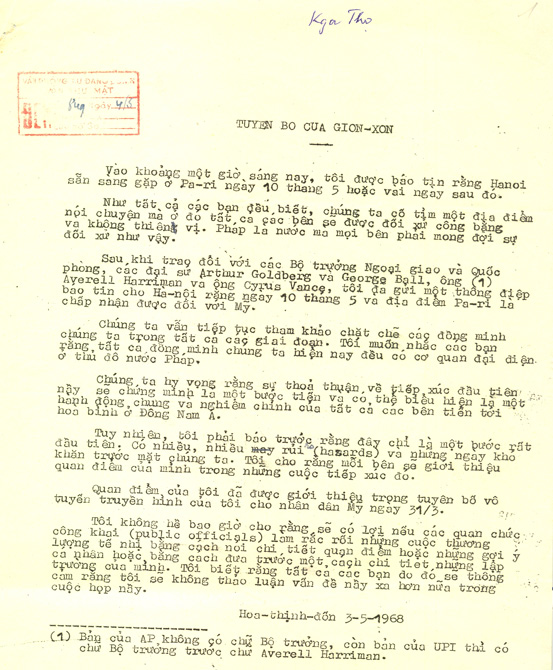
Diplomatic note dated on May 4, 1968 of the Government of the United States to the Government of the Democratic Republic of Vietnam on accepting proposal of official talks in Paris on May 10, 1968.
Source: The Archives Department of the Central Office of the Communist Party of Vietnam, Fonds 66 - Index 01, Store unit 1062.
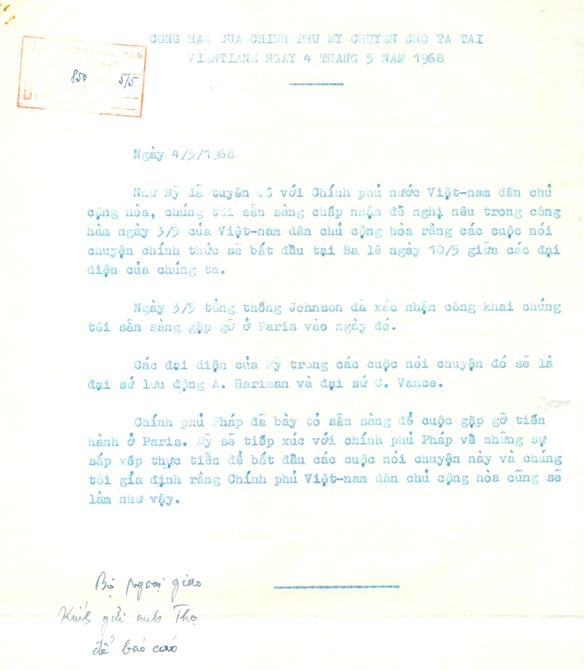
04/5/1968:
“We are ready to accept the proposal stated in the Note dated May 3 by the Government of the
Democratic Republic of Vietnam that officail talks will begin in Paris on May 10 between our representatives.”
Quotation from Diplomatic note dated on May 4, 1968 of the Government of the United States to the Government of the Democratic Republic of Vietnam on accepting proposal of official talks in Paris on May 10, 1968.
Source: The Archives Department of the Central Office of the Communist Party of Vietnam, Fonds 66 - Index 01, Store unit 1062.
President Lyndon B. Johnson and Secretary of Defense Robert S. McNamara of the United States at a Cabinet Meeting, July 2, 1968.
Source: The U.S. National Archives and Records Administration.

Letter of Pam Kaplan, whose cousin was in Vietnam to U.S. President Richard M. Nixon, December 7th, 1970.
Source: The U.S. National Archives and Records Administration, No. 6721944.

Bombs lined up, preparing for Linebacker Operation over North Vietnam, December 15, 1972
Source: The U.S. National Archives and Records Administration, No. 6376162.

The American pilots at the last press conference in tense atmosphere of 12 days and nights of bombing in Hanoi and Hai Phong, 1972.
Source: Journalist Chu Chi Thanh.

The American pilots at the last press conference in tense atmosphere of 12 days and nights of bombing in Hanoi and Hai Phong, 1972.
Source: Journalist Chu Chi Thanh.
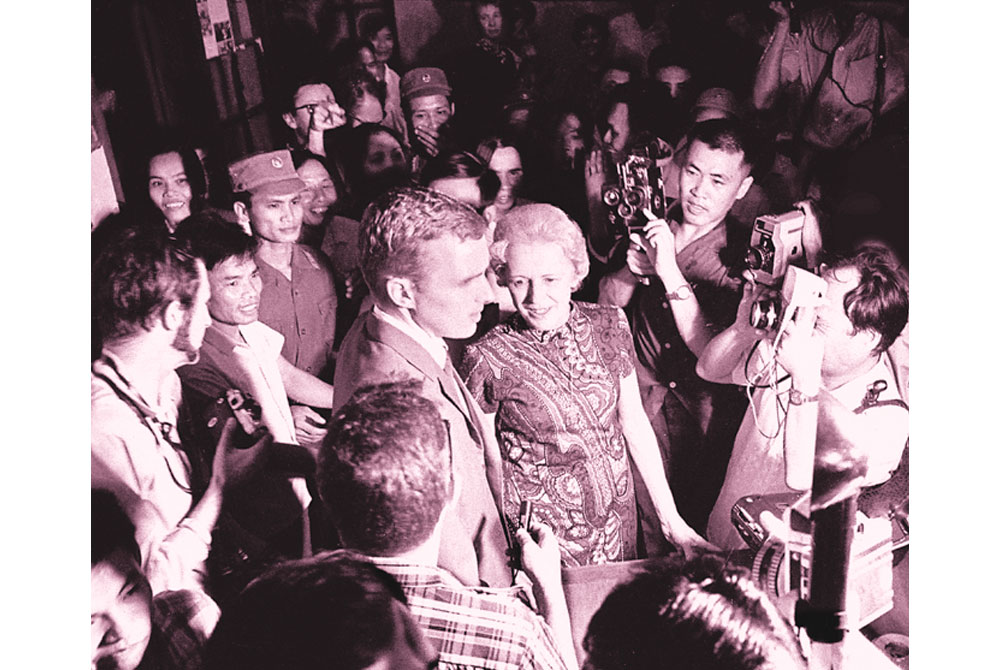
Checking information in the declaration of the Democratic Republic of Vietnam’s Ministry of Foreign Affairs on rank, venue and date of the official talks between the Democratic Republic of Vietnam and the United States on Hanoi Radio on May 3, 1968 by the Central Intelligence Office of the Republic of Vietnam.
Source: National Archives Center No. 2, Fonds of South Vietnam’s Second Republic, File 865, Page 06-08.
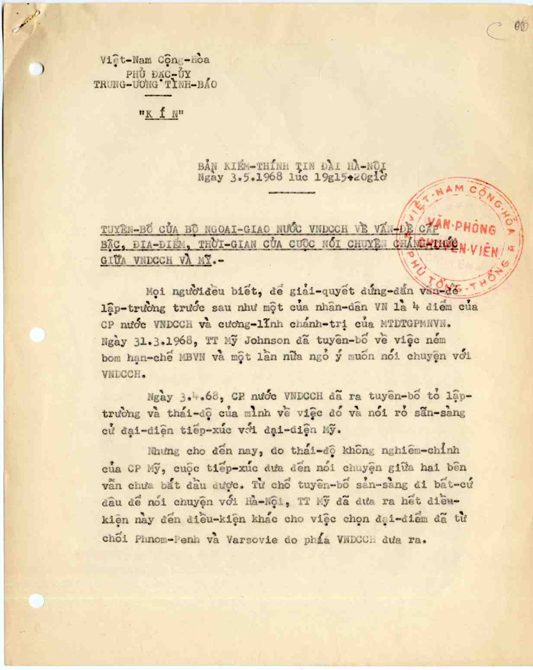
Checking information in the declaration of the Democratic Republic of Vietnam’s Ministry of Foreign Affairs on rank, venue and date of the official talks between the Democratic Republic of Vietnam and the United States on Hanoi Radio on May 3, 1968 by the Central Intelligence Office of the Republic of Vietnam.
Source: National Archives Center No. 2, Fonds of South Vietnam’s Second Republic, File 865, Page 06-08.
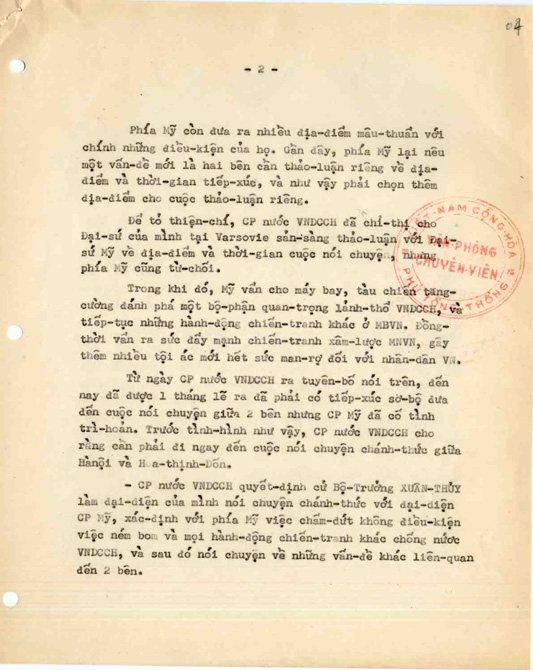
Checking information in the declaration of the Democratic Republic of Vietnam’s Ministry of Foreign Affairs on rank, venue and date of the official talks between the Democratic Republic of Vietnam and the United States on Hanoi Radio on May 3, 1968 by the Central Intelligence Office of the Republic of Vietnam.
Source: National Archives Center No. 2, Fonds of South Vietnam’s Second Republic, File 865, Page 06-08.
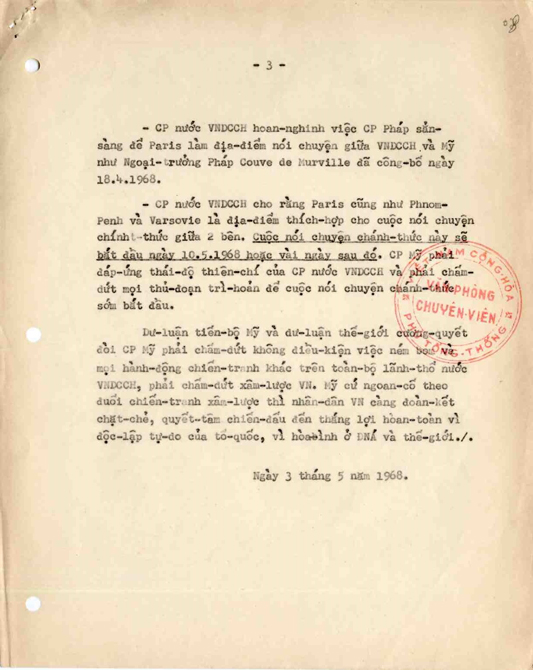
Top secret, express note No. 173/VP/TM on May 6, 1968 of the Secretary of State for Foreign Affairs of the Republic of Vietnam Tran Văn Do dispatching a delegation to observe preliminary meeting between the United States and the Democratic Republic of Vietnam.
Source: National Archives Center No. 2, Fonds Presidential Palace of Second Republic of South Vietnam, File 16367, Page 01-02.
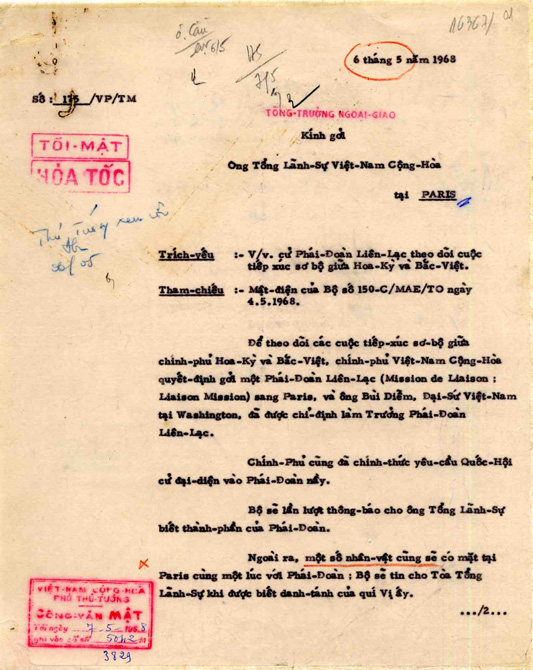
Top secret, express note No. 173/VP/TM on May 6, 1968 of the Secretary of State for Foreign Affairs of the Republic of Vietnam Tran Văn Do dispatching a delegation to observe preliminary meeting between the United States and the Democratic Republic of Vietnam.
Source: National Archives Center No. 2, Fonds Presidential Palace of Second Republic of South Vietnam, File 16367, Page 01-02.
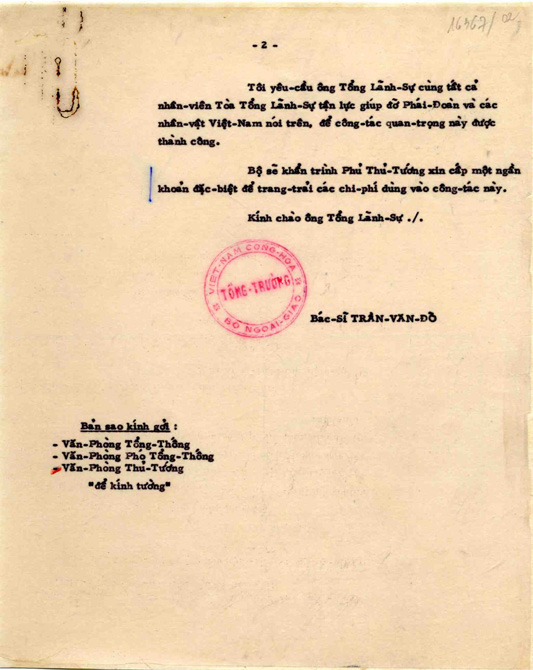
Part 2: Paris Peace Talks – A battle of strong wits
13/5/1968:
The delegation of the Democratic Republic of Vietnam and the delegation
of the United States in the first session between two sides at the Kléber International Conference Center in Paris.
The delegation of Democratic Republic of Vietnam:
List of delegation of the Democratic Republic of Vietnam attending the preliminary talks in Paris, May 1968.
Source: National Archives Center No. 2, Fonts of the Presidential Palace of the Second Republic, file 866, sheet number 03 - 05.
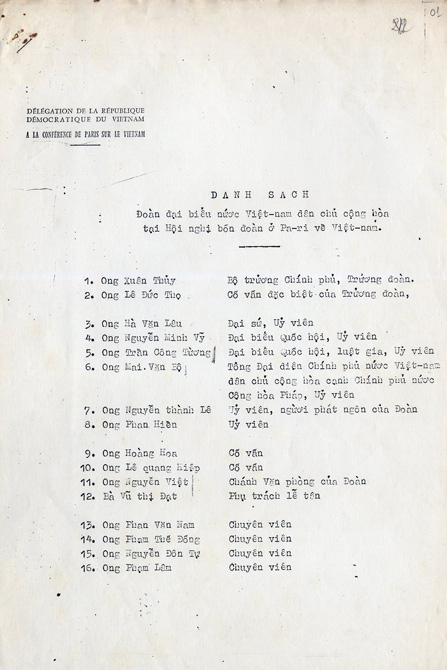
The delegation of Democratic Republic of Vietnam:
List of delegation of the Democratic Republic of Vietnam attending the preliminary talks in Paris, May 1968.
Source: National Archives Center No. 2, Fonts of the Presidential Palace of the Second Republic, file 866, sheet number 03 - 05.
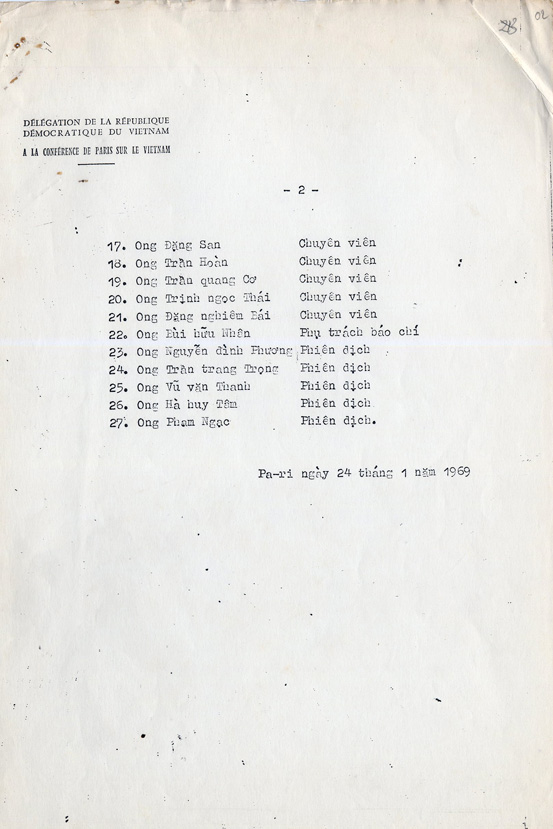

Portrait of biography of Minister of Foreign Affairs Xuan Thuy.
Mr. Xuân Thủy (1912-1985) from outsite Hanoi began his revolutionary activism in 1932, joined the Party in 1941, and was arrested sereral times between 1938 and 1944. He was a poet, linguist, translator, and diplomat and an editor of Cuu Quoc (National Salvation) from 1944 until 1955 and often assisted President Ho Chi Minh by reading drafts of letters and circulars before publication. Xuan Thuy was minister of foreign affairs and then head the the Party External Relations Department before leading the DRVN delegation at the Paris Conference from the beginning 1968 to the end 1973.
Mr. Xuan Thuy - Head of the delegation of the Government of the Democratic Republic of Vietnam arriving at Le Bourget airport (France), May 9, 1968.
Vietnam National Museum of History.

The delegation of the Government of the Democratic Republic of Vietnam attending the opening session of the official talks between the Government of the Democratic Republic of Vietnam and the Government of the United States in Paris held on May 13, 1968 at the International Conference Center (Kléber Street, Paris, France).
Source: National Archives Center No. 3, Photo collection of Ministry of Foreign Affairs, No. 2979-2242.

Mr. Xuan Thuy - Head of the delegation of the Government of the Democratic Republic of Vietnam announcing that the United States must accept the unconditional cessation of bombing on the Democratic Republic of Vietnam’s territory and open the four - side talks in Paris on November 2, 1968 in a press conference.
Source: Vietnam National Museum of History.
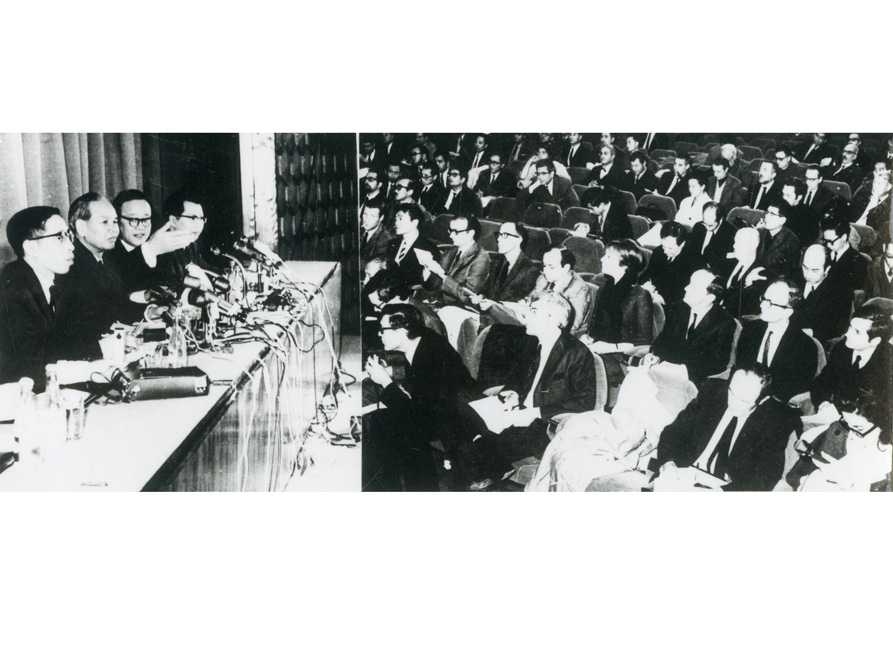
Mr. Xuan Thuy – Head of the delegation of the Government of the Democratic Republic of Vietnam and Ambassador William A. Harriman - Head of the U.S. Government Delegation for bilateral talks at the International Conference Center in 1968.
Source: Vietnam National Museum of History.
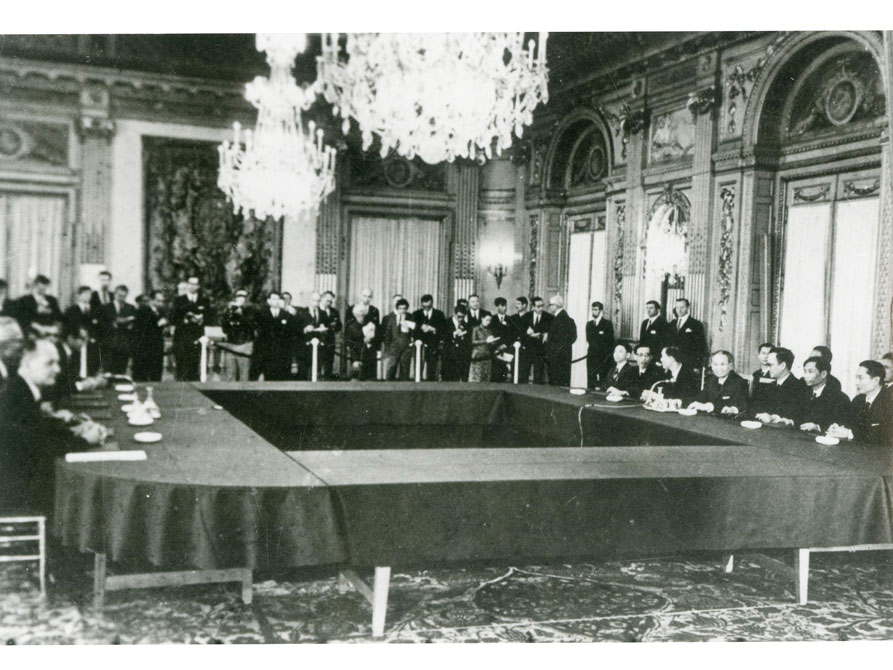
A private meeting of Special advisor Le Duc Tho, Mr. Xuan Thuy - Head of the Government of the Democratic Republic of Vietnam’s delegation and Ambassador William A. Harriman - Head of the U.S. Government’s delegation in Paris, January 17, 1969.
Source: Vietnam National Museum of History.

Speech of Mr. Xuan Thuy - Head of the Democratic Republic of Vietnam’s delegation at the 145th Plenary Session, the Paris Peace Talks on Vietnam, February 24, 1972.
Source: National Archive Center No. 2, Fonds of the Prime Minister’s Office, File 17719, Page 87-88.
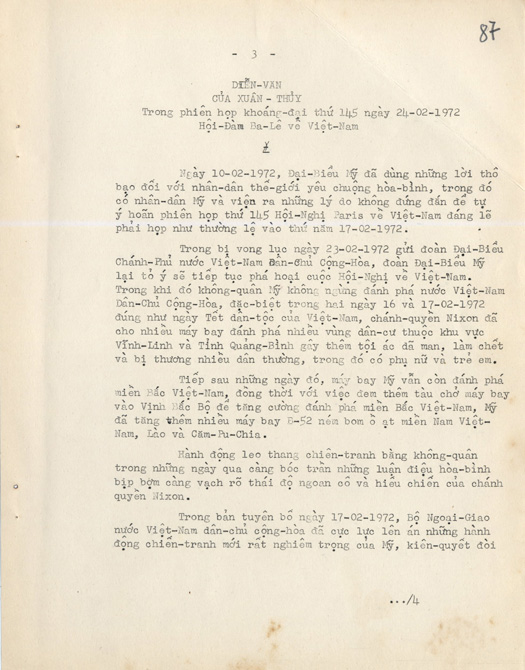
Speech of Mr. Xuan Thuy - Head of the Democratic Republic of Vietnam’s delegation at the 145th Plenary Session, the Paris Peace Talks on Vietnam, February 24, 1972.
Source: National Archive Center No. 2, Fonds of the Prime Minister’s Office, File 17719, Page 87-88.
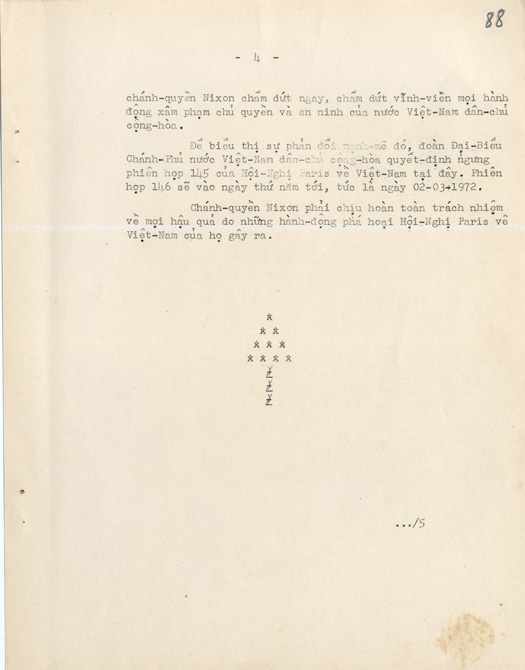
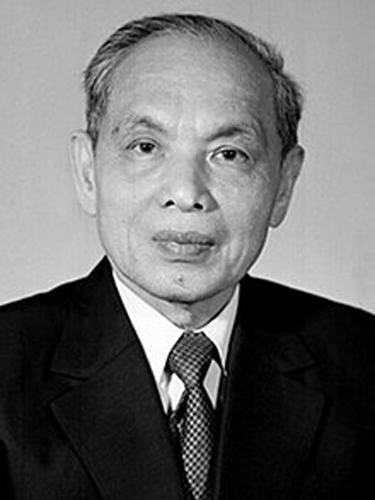
Portrait of biography of Minister of Foreign Affairs Nguyen Duy Trinh.
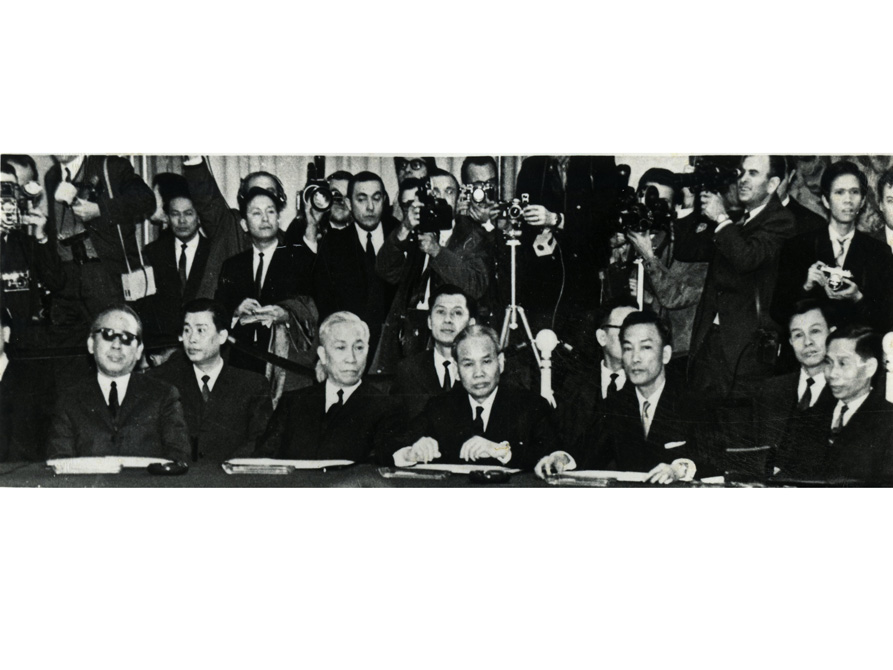
The Democratic Republic of Vietnam’s delegation at the four - side talks on Vietnam in Paris, 1972.
Source: Vietnam National Museum of History.
B.B.C. Radio on September 12, 1972: British news on Vietnam.
Source: National Archive Center No. 2, Fonds of the Prime Minister’s Office of the Republic of Vietnam (1954-1975), File 17720, Page 15-18.
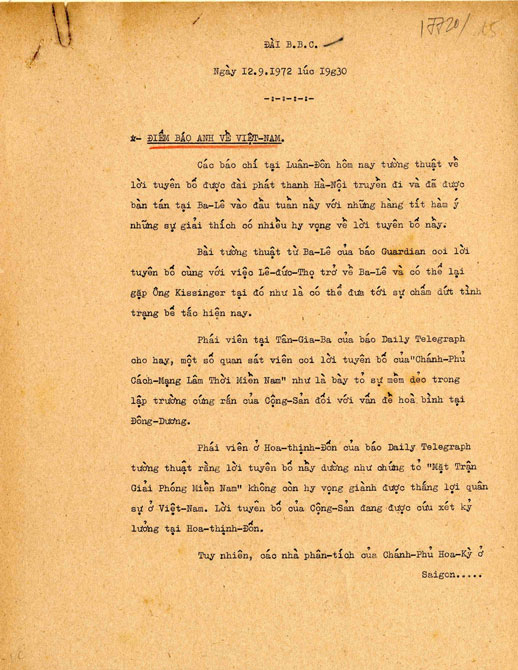
B.B.C. Radio on September 12, 1972: British news on Vietnam.
Source: National Archive Center No. 2, Fonds of the Prime Minister’s Office of the Republic of Vietnam (1954-1975), File 17720, Page 15-18.
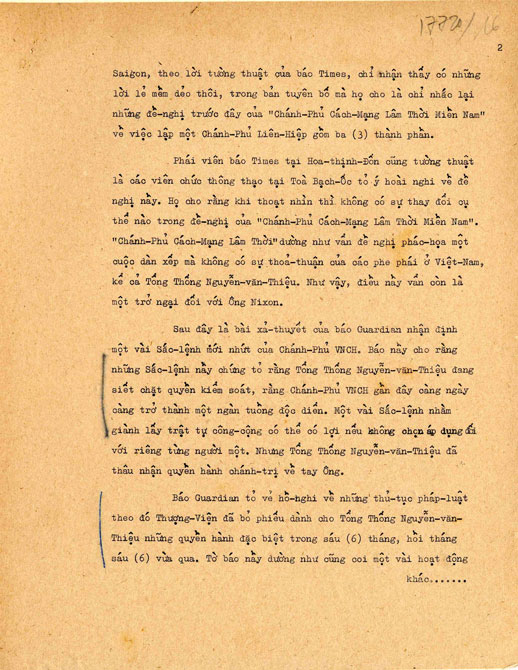
B.B.C. Radio on September 12, 1972: British news on Vietnam.
Source: National Archive Center No. 2, Fonds of the Prime Minister’s Office of the Republic of Vietnam (1954-1975), File 17720, Page 15-18.
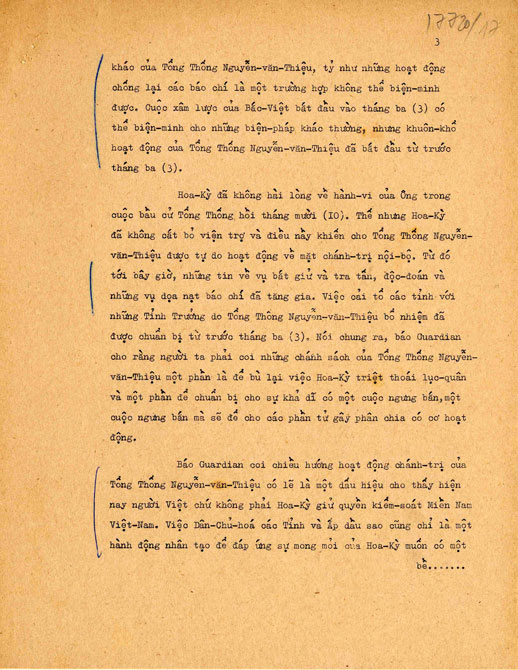
B.B.C. Radio on September 12, 1972: British news on Vietnam.
Source: National Archive Center No. 2, Fonds of the Prime Minister’s Office of the Republic of Vietnam (1954-1975), File 17720, Page 15-18.
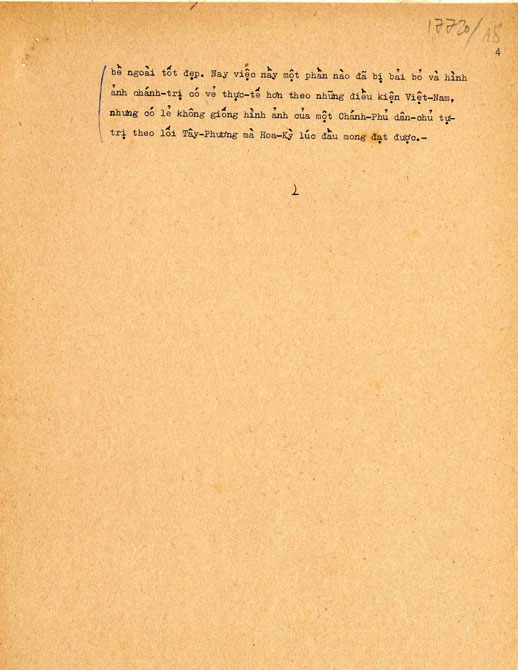
Press Release of the 20th session of the Standing Committee of the 4th National Assembly on the negotiating situation at the Paris Peace Talks on Vietnam, October 26, 1972.
Source: National Archives Center No.3, Fonds of National Assembly, Vol. 1, File 1752, Page 05-06.
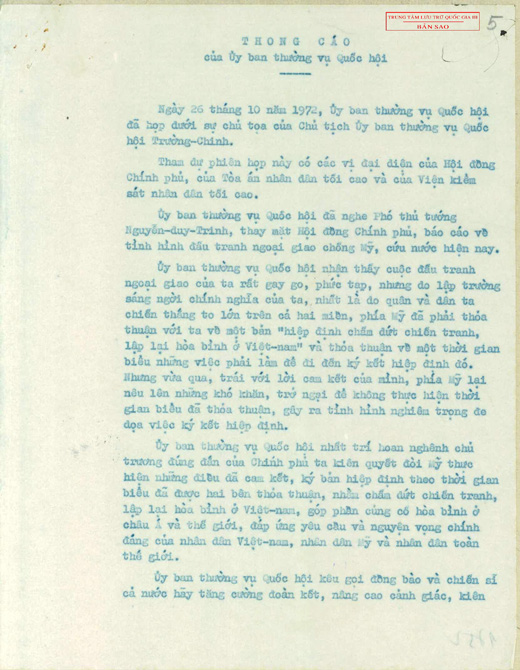
Press Release of the 20th session of the Standing Committee of the 4th National Assembly on the negotiating situation at the Paris Peace Talks on Vietnam, October 26, 1972.
Source: National Archives Center No.3, Fonds of National Assembly, Vol. 1, File 1752, Page 05-06.
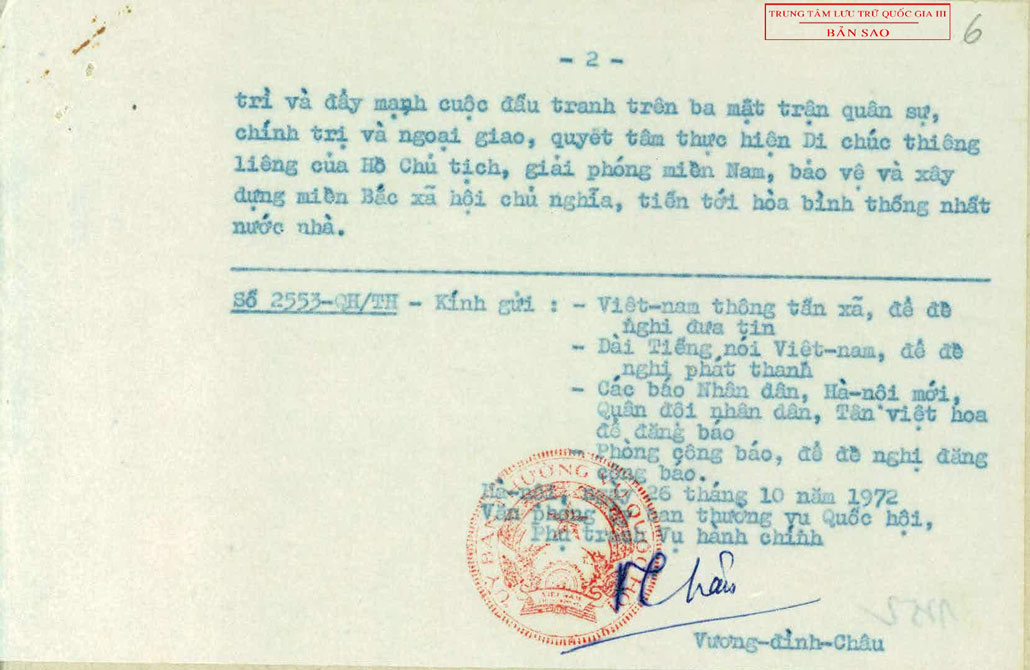
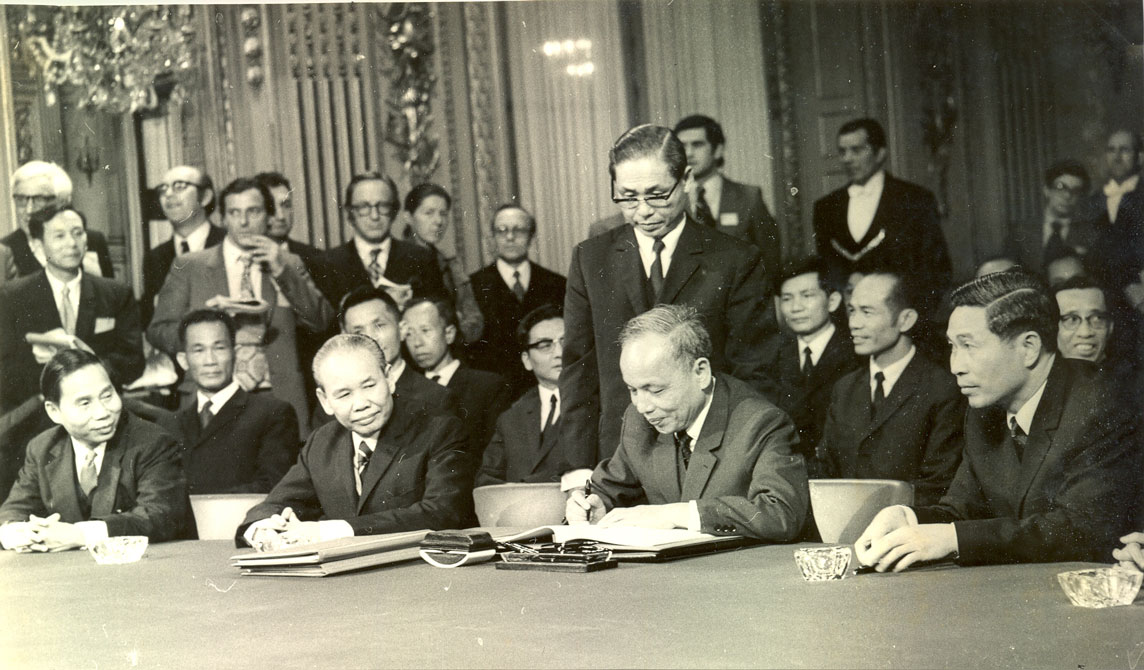
The delegation of the Democratic Republic of Vietnam at the signing ceremony of the Paris Peace Accords, January 27, 1973.
Source: The Archives Department of the Central Office of the Communist Party of Vietnam, Store unit 289, No. 26.
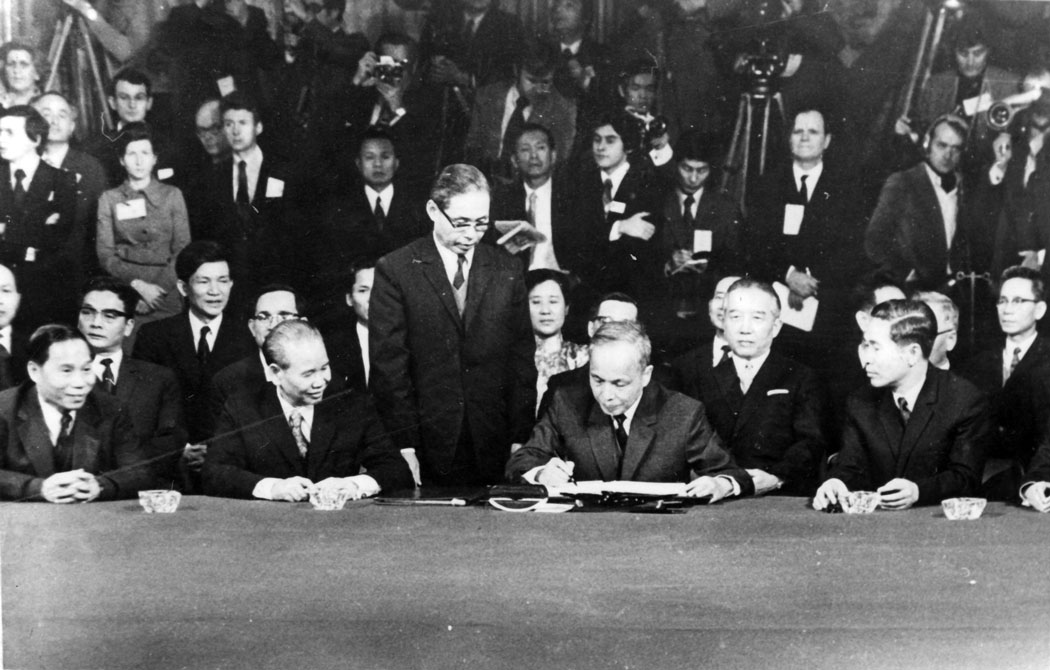
Minister of Foreign Affairs of the Democratic Republic of Vietnam Nguyen Duy Trinh signing the Paris Peace Accords, January 27, 1973.
Source: Vietnam National Museum of History.
Part 2: Paris Peace Talks – A battle of strong wits
The delegation of the National Front for the Liberation of South Vietnam:
List of the Democratic Republic of Vietnam’s delegation and the National Front for the
Liberation of South Vietnam’s delegation attending the Paris Peace Talks on January 25,
1969 at the International Conference Center (Kléber Street, Paris, France).
Source: National Archive Center No. 2, Fonds Presidential Palace of Second Republic of South Vietnam, File 967, Page 01-04.
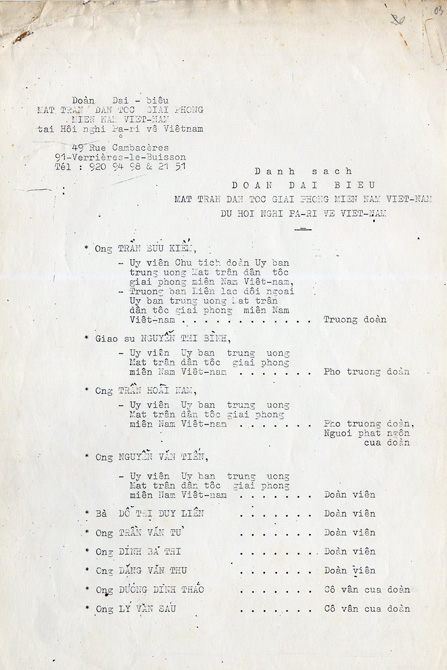
The delegation of the National Front for the Liberation of South Vietnam:
List of the Democratic Republic of Vietnam’s delegation and the National Front for the
Liberation of South Vietnam’s delegation attending the Paris Peace Talks on January 25,
1969 at the International Conference Center (Kléber Street, Paris, France).
Source: National Archive Center No. 2, Fonds Presidential Palace of Second Republic of South Vietnam, File 967, Page 01-04.
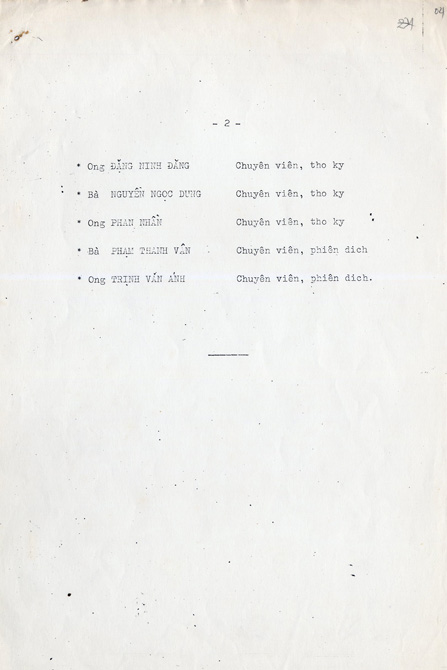

The delegation of the National Front for the Liberation of South Vietnam in meeting at the headquarters of the delegation in Verrières-le-Buisson (France), December 1968.
Source: Vietnam National Museum of History.

Mrs. Nguyen Thi Binh welcoming the National Front for the Liberation of South Vietnam’s delegation to attend the four - side talks in Paris at a meeting of overseas Vietnamese in Paris, December 1968.
Source: Vietnam National Museum of History.

The Government of the Democratic Republic of Vietnam’s delegation and the National Front for the Liberation of South Vietnam’s delegation in the four - side talks in Paris on Vietnam.
Source: Vietnam National Museum of History.
Speech of Mrs. Nguyen Thi Binh - Head of the National Front for the Liberation of South Vietnam’s delegation, January 18, 1969.
Source: National Archive Center No. 2, Fonds Presidential Palace of Second Republic of South Vietnam, File 970, Page 75-77.
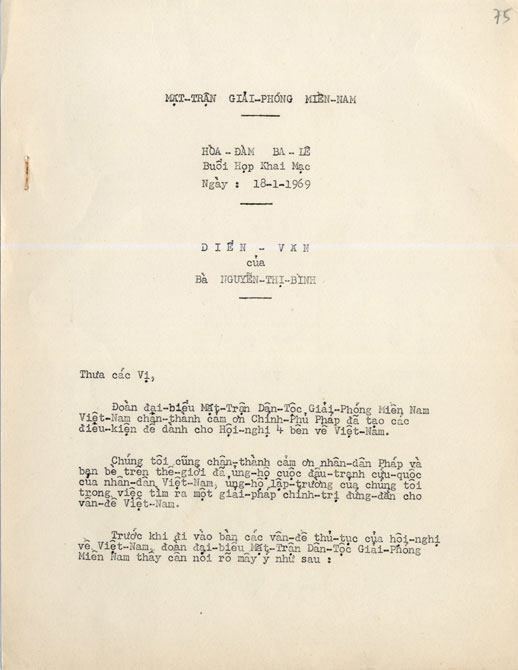
Speech of Mrs. Nguyen Thi Binh - Head of the National Front for the Liberation of South Vietnam’s delegation, January 18, 1969.
Source: National Archive Center No. 2, Fonds Presidential Palace of Second Republic of South Vietnam, File 970, Page 75-77.
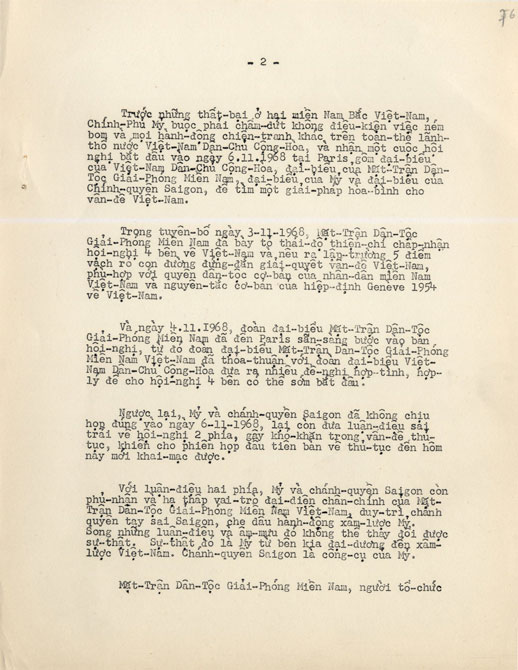
Speech of Mrs. Nguyen Thi Binh - Head of the National Front for the Liberation of South Vietnam’s delegation, January 18, 1969.
Source: National Archive Center No. 2, Fonds Presidential Palace of Second Republic of South Vietnam, File 970, Page 75-77.
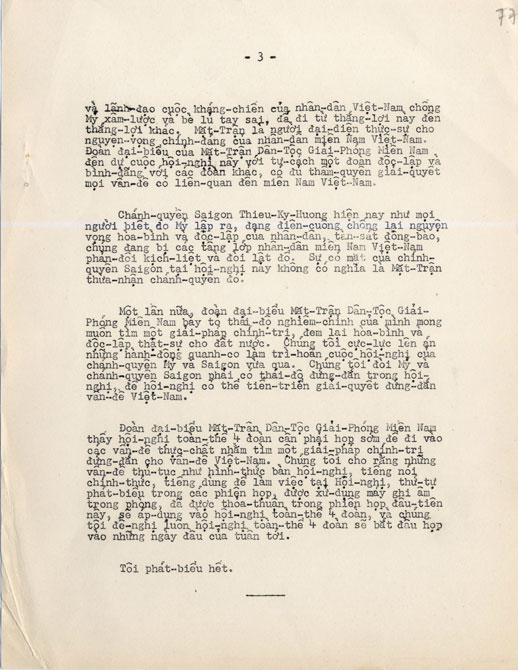

The National Front for the Liberation of South Vietnam’s delegation participating in the first plenary session of the Paris Peace Talks on Vietnam on January 25, 1969 at the International Conference Center (Kléber Street, Paris, French).
Source: National Archive Center No. 3, Photo collection of Ministry of Foreign Affairs, No. 2974-430.
8-point proposal of the Minister of Foreign Affairs of the Provisional Revolutionary Government of the Republic of South Vietnam Nguyen Thi Binh on the war in Vietnam.
Source: National Archive Center No. 2, Fonds of the Secretary of State on Culture, File 1462.
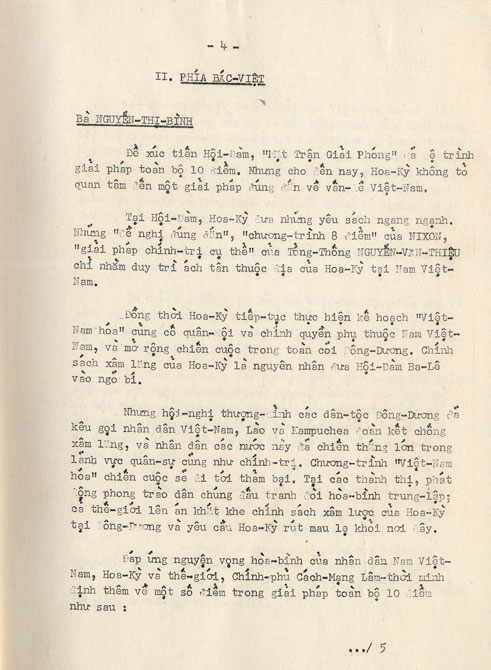
8-point proposal of the Minister of Foreign Affairs of the Provisional Revolutionary Government of the Republic of South Vietnam Nguyen Thi Binh on the war in Vietnam.
Source: National Archive Center No. 2, Fonds of the Secretary of State on Culture, File 1462.
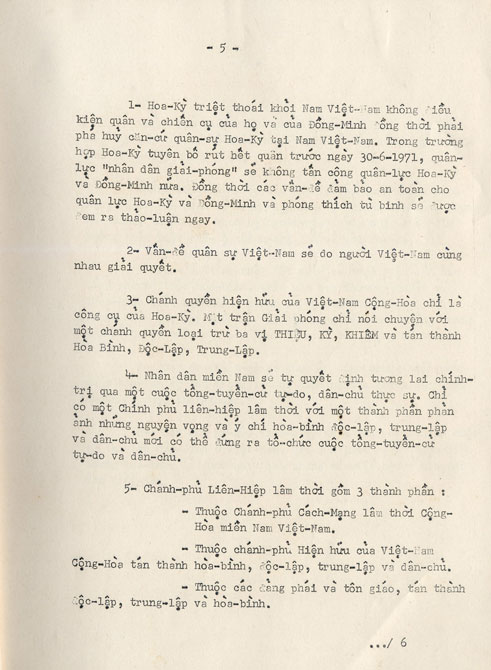
8-point proposal of the Minister of Foreign Affairs of the Provisional Revolutionary Government of the Republic of South Vietnam Nguyen Thi Binh on the war in Vietnam.
Source: National Archive Center No. 2, Fonds of the Secretary of State on Culture, File 1462.
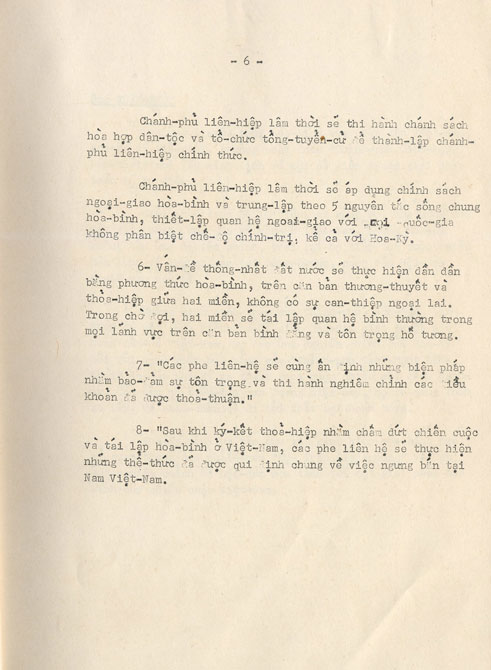
Statement of Mr. Nguyen Van Tien – Representative of the delegation of the Provisional Revolutionary Government of the Republic of South Vietnam at the 145th Plenary Session, the Paris Peace Talks on Vietnam, February 24, 1972.
Source: National Archive Center No. 2, Fonds of the Prime Minister’s Office, File 17719, Page 89.
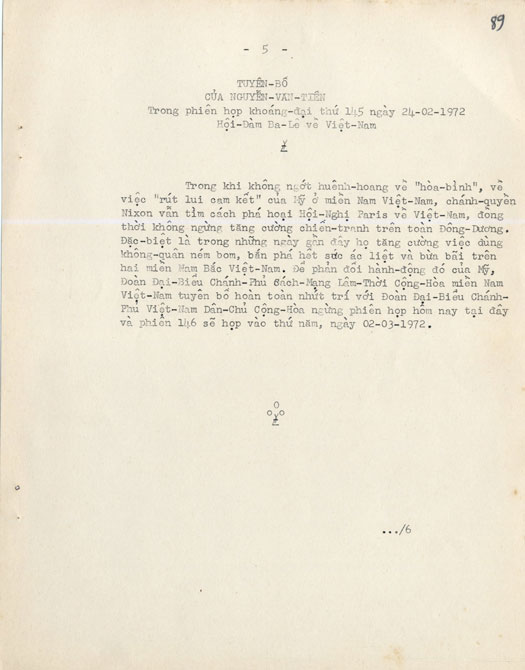
The National Front for the Liberation of South Vietnam’s delegation in the four - side talks in Paris on Vietnam.
Source: Vietnam National Museum of History.
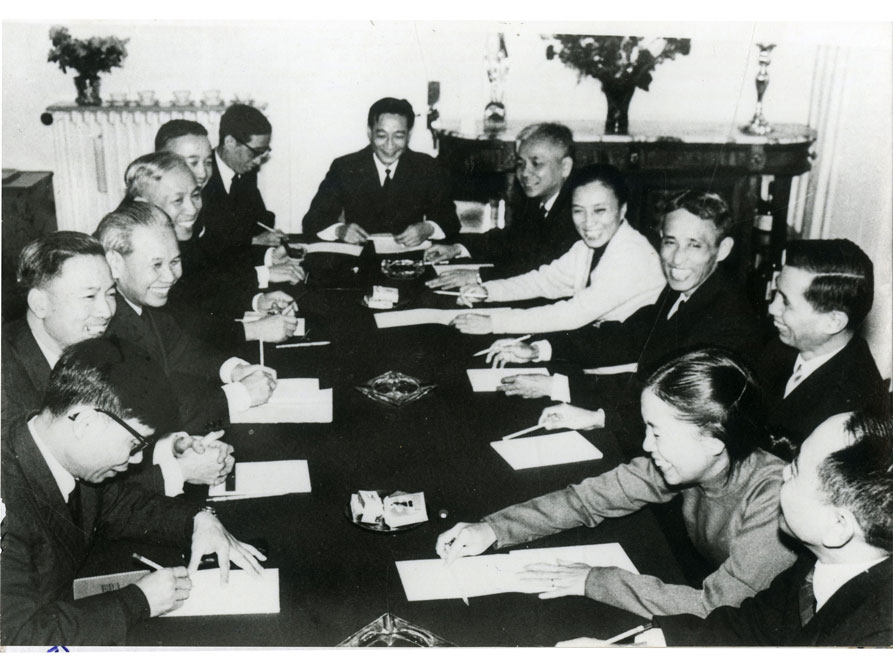
Minister of Foreign Affairs of the Provisional Revolution Governmnet of the South Vietnam Nguyen Thi Binh signing the Paris Peace Accords, January 27, 1973.
Source: Vietnam National Museum of History
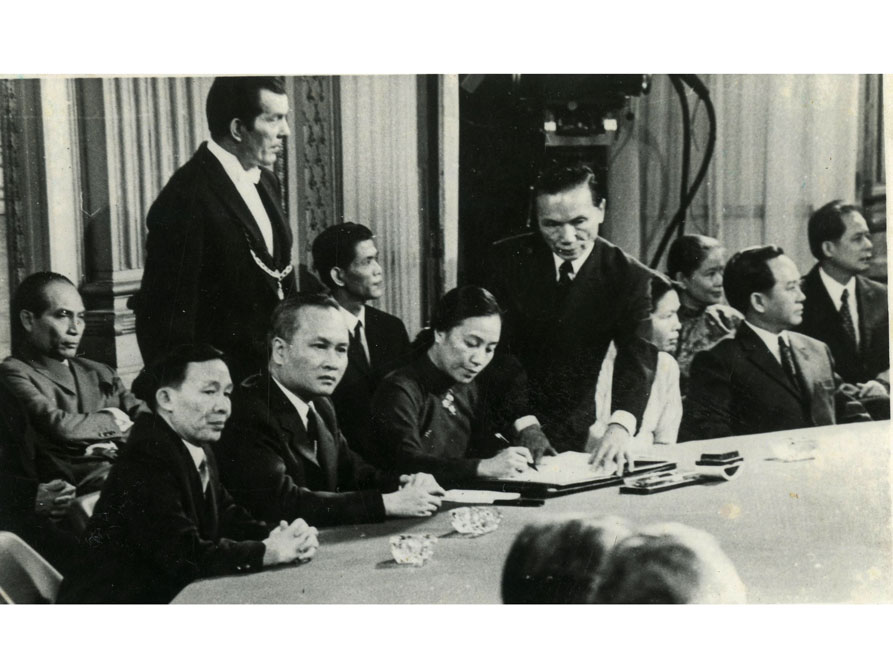
Part 2: Paris Peace Talks – A battle of strong wits
The U.S. delegation in Paris:
List of the United States Delegation at the Paris Peace Talks on Vietnam on January 25,
1969 at the International Conference Center (Kléber Street, Paris, France).
Source: National Archive Center No. 2, Fonds Presidential Palace of Second Republic of South Vietnam, File 16665, Page 05-06.
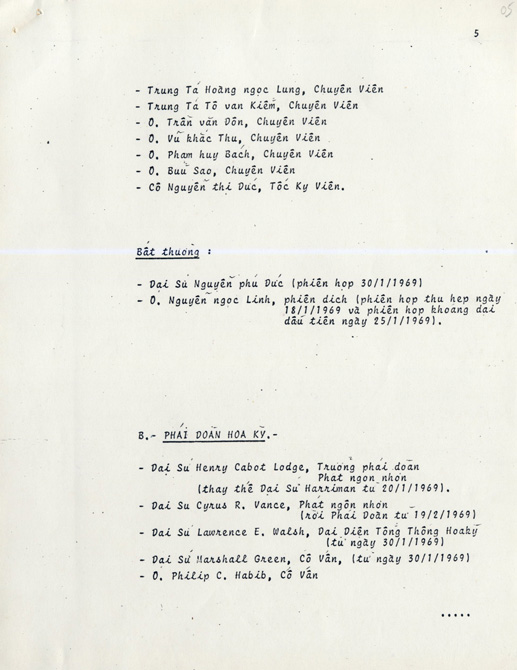
The U.S. delegation in Paris:
List of the United States Delegation at the Paris Peace Talks on Vietnam on January 25,
1969 at the International Conference Center (Kléber Street, Paris, France).
Source: National Archive Center No. 2, Fonds Presidential Palace of Second Republic of South Vietnam, File 16665, Page 05-06.
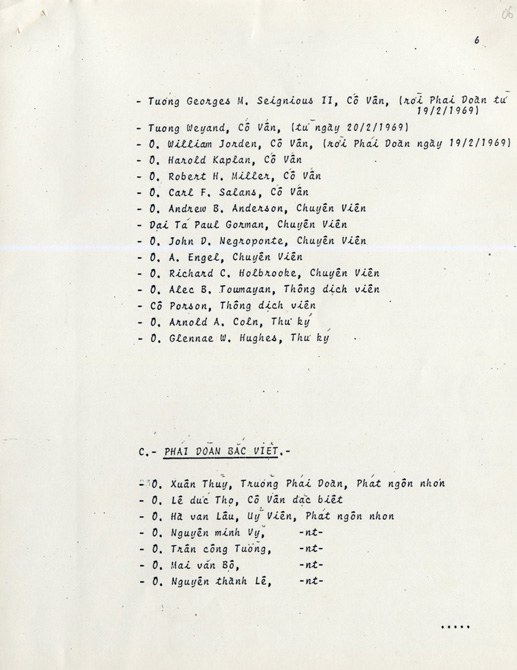
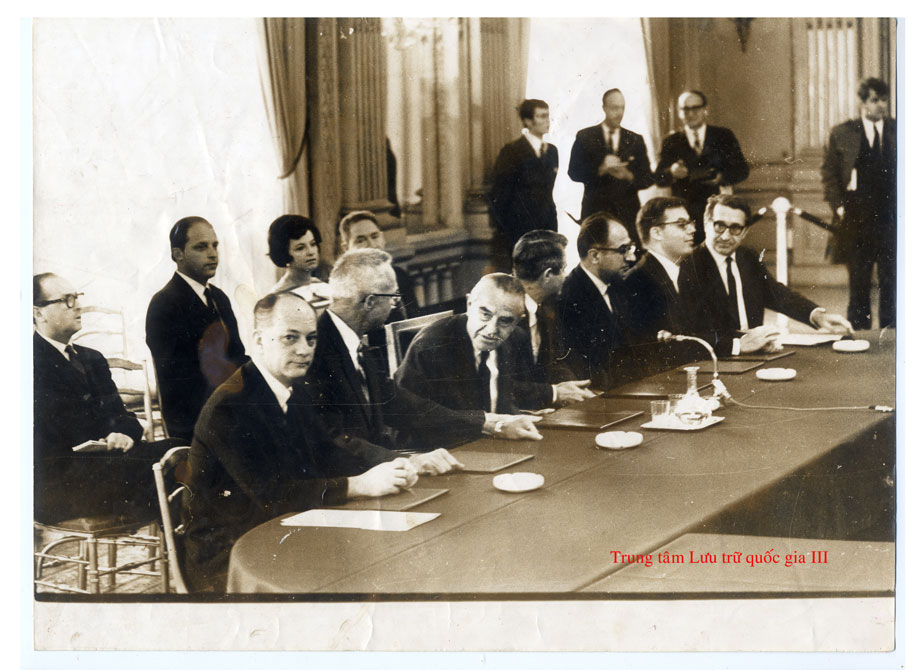
The delegation of the U.S. Government attending the opening session of the official talks between representatives of the Government of the Democratic Republic of Vietnam and representatives of the U.S. Government in Paris, May 13, 1968 at International Conference Center (Kléber Street, Paris, France).
Source: National Archives Center No. 3, The photo index of Ministry of Foreign Affairs, No. 2976-427.
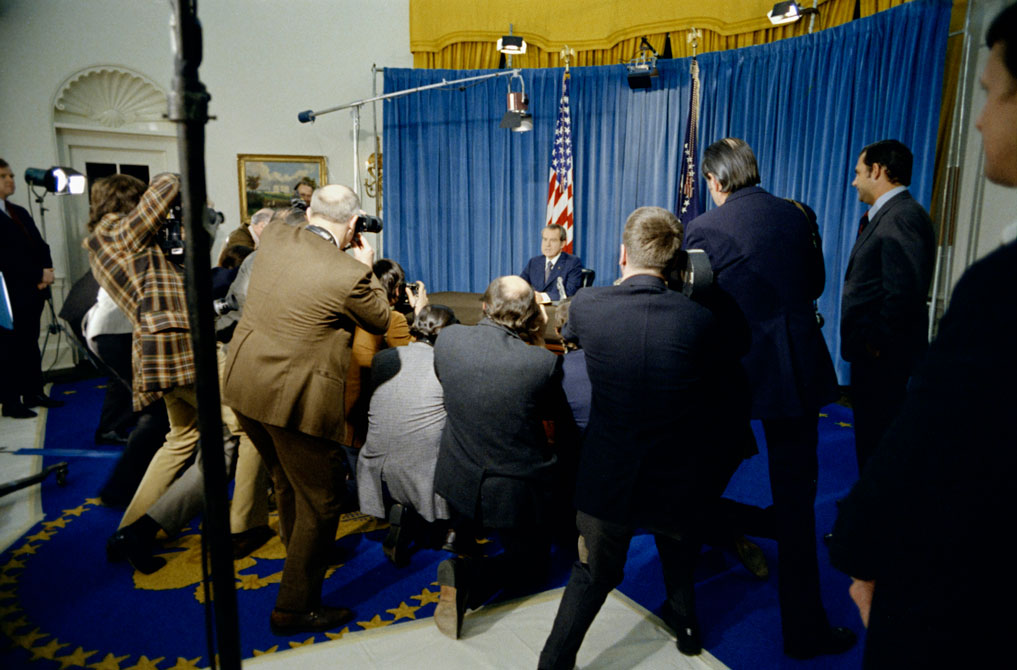
President Richard Nixon announced the Preliminary Approval of "the Agreement on Ending the War and Restoring Peace in Vietnam", January 23, 1973.
Source: The U.S. National Archives and Records Administration.

The U.S. delegation and Saigon Government delegation at the four - side talks on Vietnam in Paris.
Vietnam National Museum of History.

Secretary of State William Rogers Signing the Vietnam Peace Agreements.
Source: The U.S. National Archives and Records Administration, No. 27580141.
Part 2: Paris Peace Talks – A battle of strong wits
The delegation of the Republic of Vietnam:
Post message dated January 30, 1969 of the Ministry of Information of the Republic
of Vietnam explaining that the Republic of Vietnam military force will gradually replace the US military.
Source: National Archive Center No. 2, Fonds of the Prime Minister’s Office of the Viet Nam (1954 - 1975), File 17494, Page 01- 04.
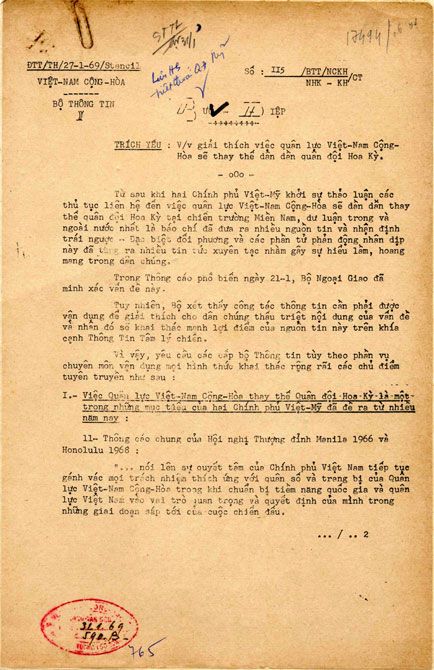
The delegation of the Republic of Vietnam:
Post message dated January 30, 1969 of the Ministry of Information of the Republic
of Vietnam explaining that the Republic of Vietnam military force will gradually replace the US military.
Source: National Archive Center No. 2, Fonds of the Prime Minister’s Office of the Viet Nam (1954 - 1975), File 17494, Page 01- 04.
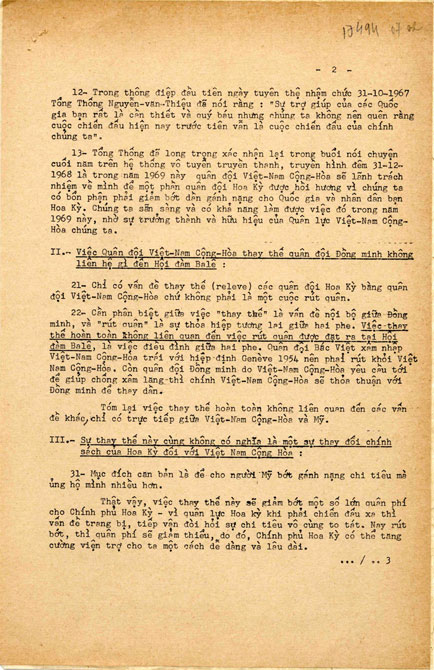
The delegation of the Republic of Vietnam:
Post message dated January 30, 1969 of the Ministry of Information of the Republic
of Vietnam explaining that the Republic of Vietnam military force will gradually replace the US military.
Source: National Archive Center No. 2, Fonds of the Prime Minister’s Office of the Viet Nam (1954 - 1975), File 17494, Page 01- 04.
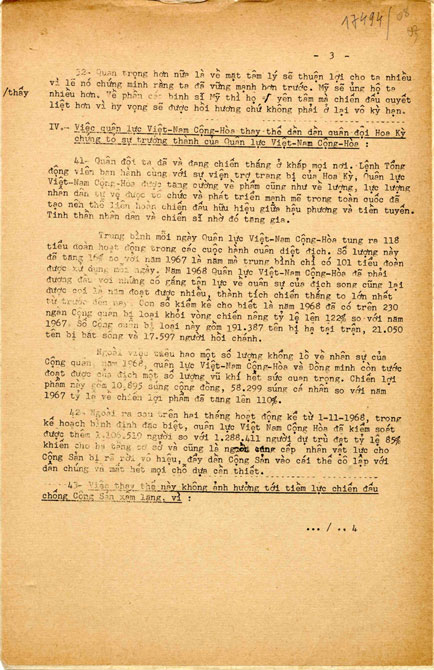
The delegation of the Republic of Vietnam:
Post message dated January 30, 1969 of the Ministry of Information of the Republic
of Vietnam explaining that the Republic of Vietnam military force will gradually replace the US military.
Source: National Archive Center No. 2, Fonds of the Prime Minister’s Office of the Viet Nam (1954 - 1975), File 17494, Page 01- 04.
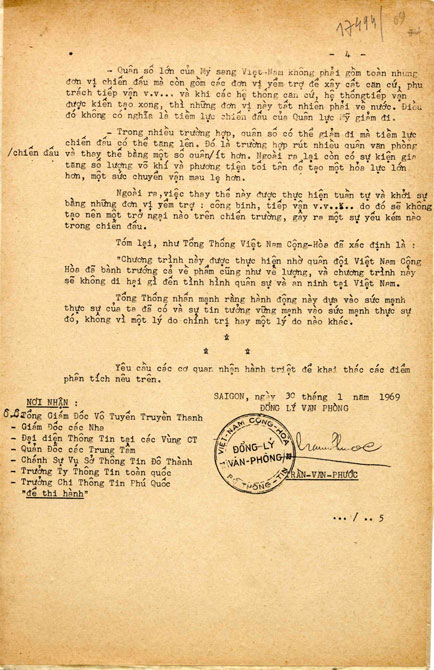
Joint declaration of President Nguyen Van Thieu of the Republic of Vietnam and the U.S. President Richard M. Nixon in Midway Island, June 8, 1969.
Source: National Archives Center No. 2, Fonds Presidential Palace of Second Republic of South Vietnam’s Second Republic, File 601, Page 01-05.
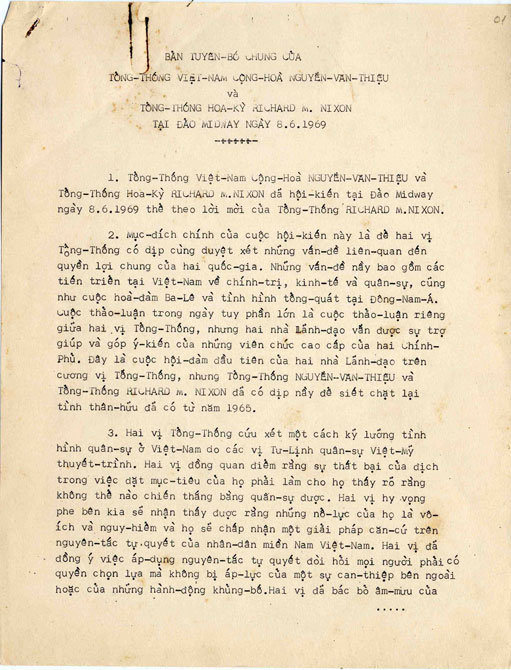
Joint declaration of President Nguyen Van Thieu of the Republic of Vietnam and the U.S. President Richard M. Nixon in Midway Island, June 8, 1969.
Source: National Archives Center No. 2, Fonds Presidential Palace of Second Republic of South Vietnam’s Second Republic, File 601, Page 01-05.
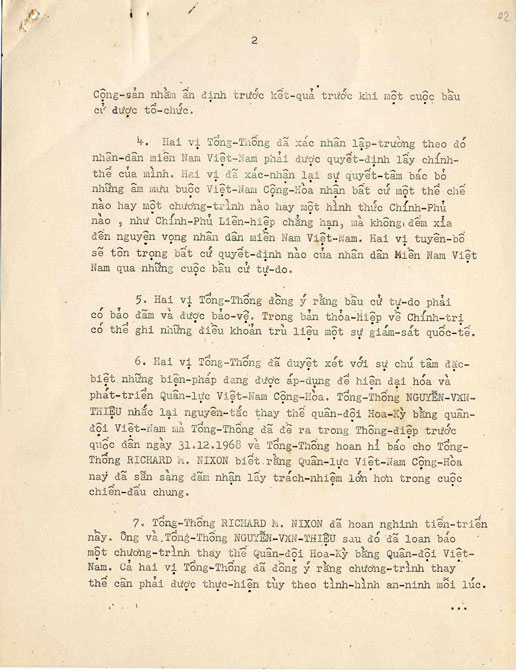
Joint declaration of President Nguyen Van Thieu of the Republic of Vietnam and the U.S. President Richard M. Nixon in Midway Island, June 8, 1969.
Source: National Archives Center No. 2, Fonds Presidential Palace of Second Republic of South Vietnam’s Second Republic, File 601, Page 01-05.
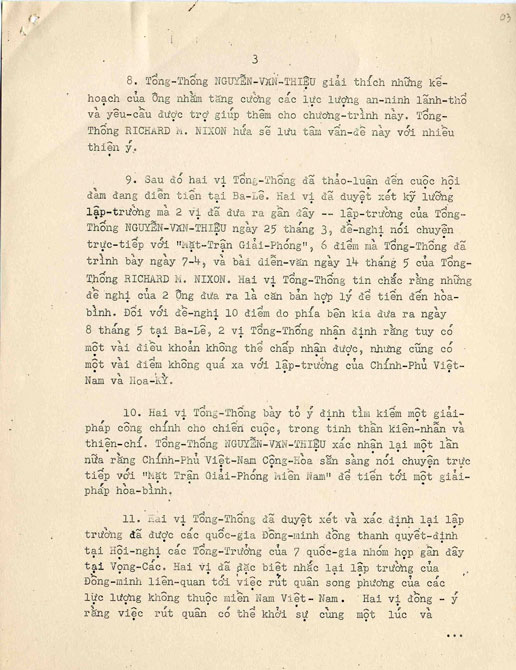
Joint declaration of President Nguyen Van Thieu of the Republic of Vietnam and the U.S. President Richard M. Nixon in Midway Island, June 8, 1969.
Source: National Archives Center No. 2, Fonds Presidential Palace of Second Republic of South Vietnam’s Second Republic, File 601, Page 01-05.
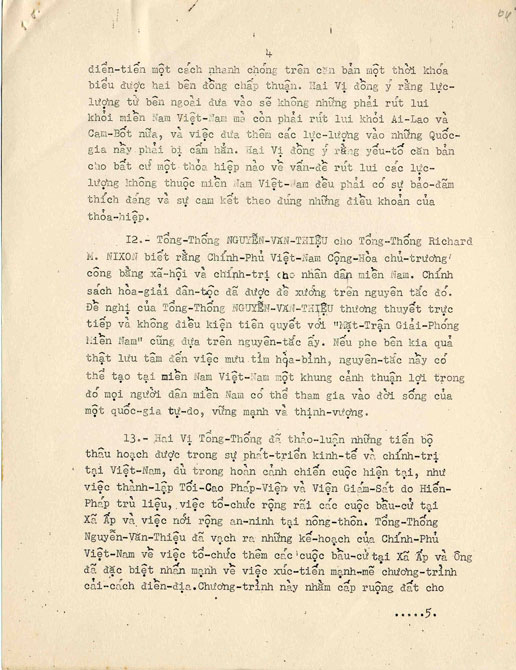
Confidential dispatch No. 3526/QP/HQNL/2/M on July 21, 1971 of the Defense Minister of the Republic of Vietnam planning to withdraw 28,700 U.S. troops in Vietnam.
Source: National Archive Center No. 2, Fonds of the Prime Minister’s Office of the Republic of Vietnam (1954-1975), File 17494, Page 108-109.
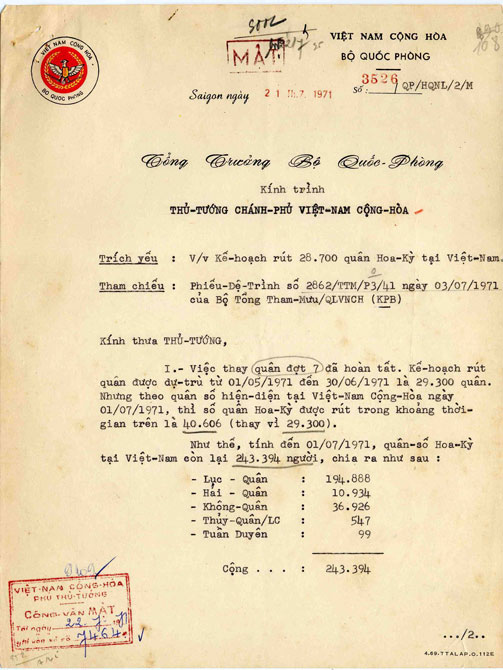
Confidential dispatch No. 3526/QP/HQNL/2/M on July 21, 1971 of the Defense Minister of the Republic of Vietnam planning to withdraw 28,700 U.S. troops in Vietnam.
Source: National Archive Center No. 2, Fonds of the Prime Minister’s Office of the Republic of Vietnam (1954-1975), File 17494, Page 108-109.
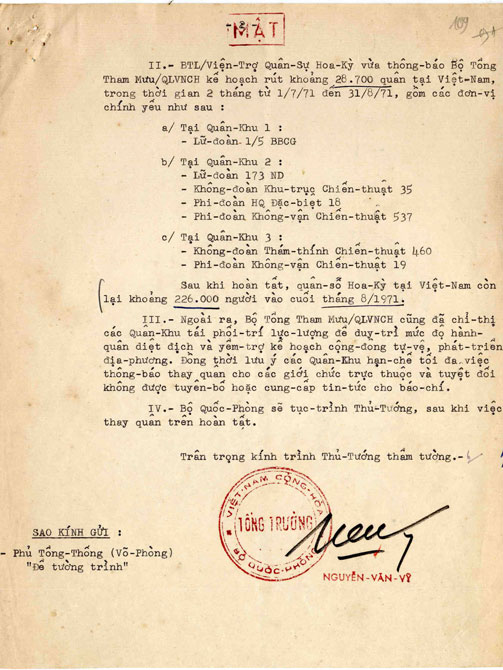
The U.S. President Richard M. Nixon’s letter to President of the Republic of Vietnam Nguyen Van Thieu, May 09, 1972.
Source: National Archives Center No. 2, Fonds of South Vietnam’s Second Republic, File 1289, Page 69-71.
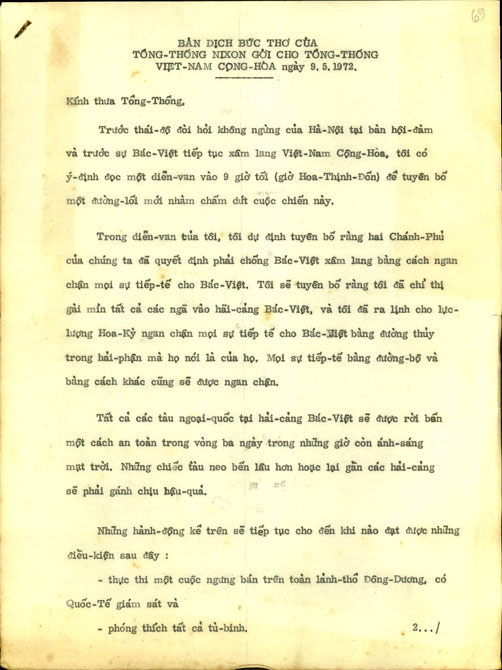
The U.S. President Richard M. Nixon’s letter to President of the Republic of Vietnam Nguyen Van Thieu, May 09, 1972.
Source: National Archives Center No. 2, Fonds of South Vietnam’s Second Republic, File 1289, Page 69-71.
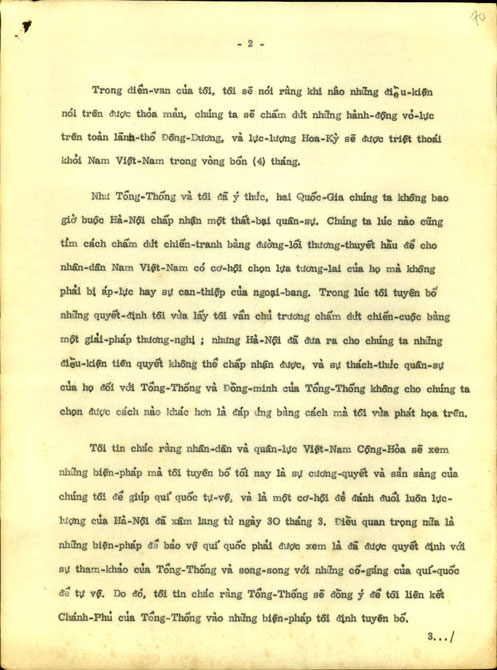
The U.S. President Richard M. Nixon’s letter to President of the Republic of Vietnam Nguyen Van Thieu, May 09, 1972.
Source: National Archives Center No. 2, Fonds of South Vietnam’s Second Republic, File 1289, Page 69-71.
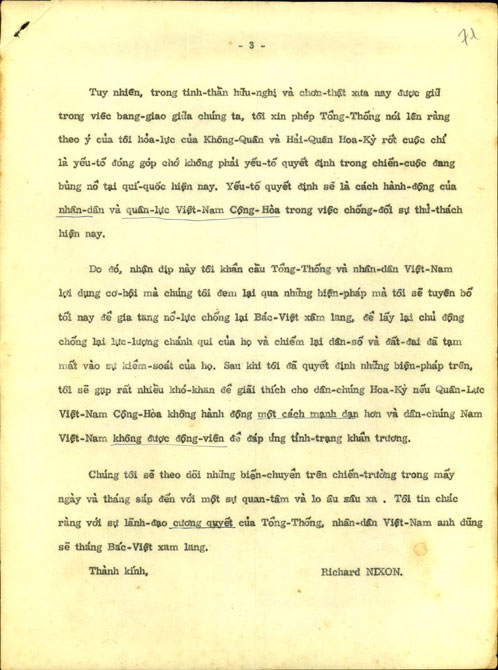
Report No. 3672/MC dated August 17, 1972 of the Ministry of Foreign Affairs of the Republic of Vietnam on the attitude of the United States Congress towards the issue of resolving the Vietnam War.
National Archive Center No. 2, Fonds Presidential Palace of the Second Republic, file 1164, sheets 24 - 27.
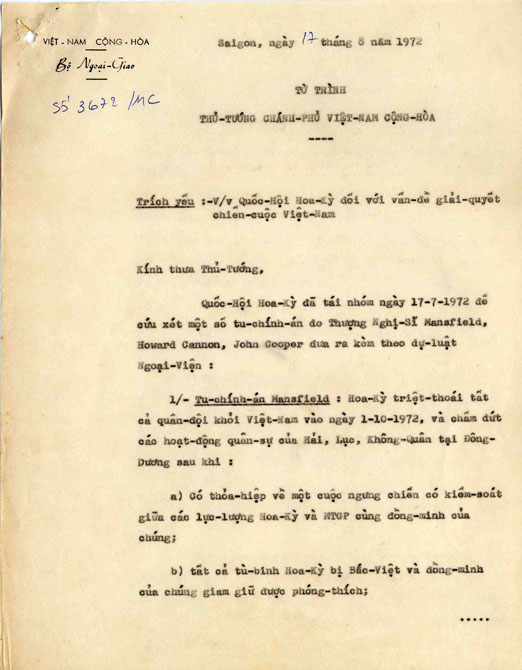
Report No. 3672/MC dated August 17, 1972 of the Ministry of Foreign Affairs of the Republic of Vietnam on the attitude of the United States Congress towards the issue of resolving the Vietnam War.
National Archive Center No. 2, Fonds Presidential Palace of the Second Republic, file 1164, sheets 24 - 27.
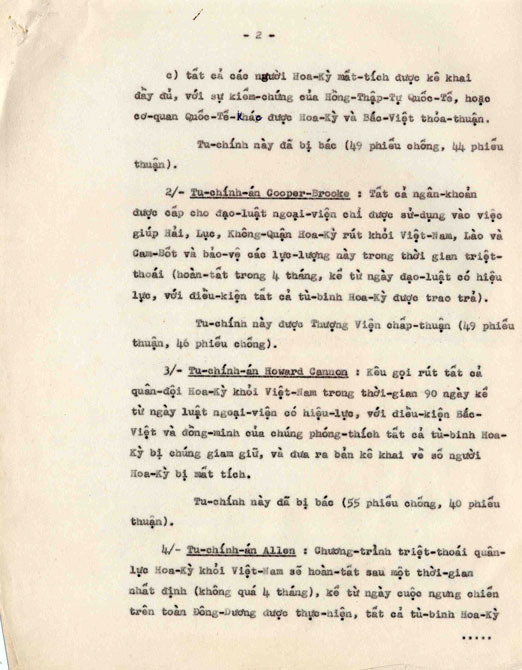
Report No. 3672/MC dated August 17, 1972 of the Ministry of Foreign Affairs of the Republic of Vietnam on the attitude of the United States Congress towards the issue of resolving the Vietnam War.
National Archive Center No. 2, Fonds Presidential Palace of the Second Republic, file 1164, sheets 24 - 27.
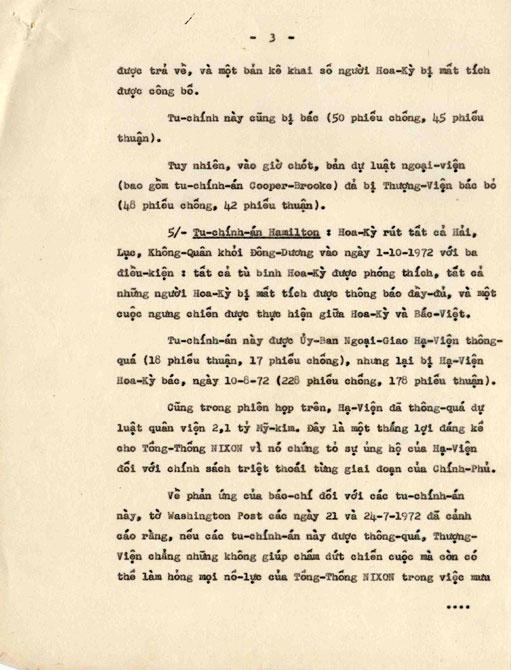
Report No. 3672/MC dated August 17, 1972 of the Ministry of Foreign Affairs of the Republic of Vietnam on the attitude of the United States Congress towards the issue of resolving the Vietnam War.
National Archive Center No. 2, Fonds Presidential Palace of the Second Republic, file 1164, sheets 24 - 27.
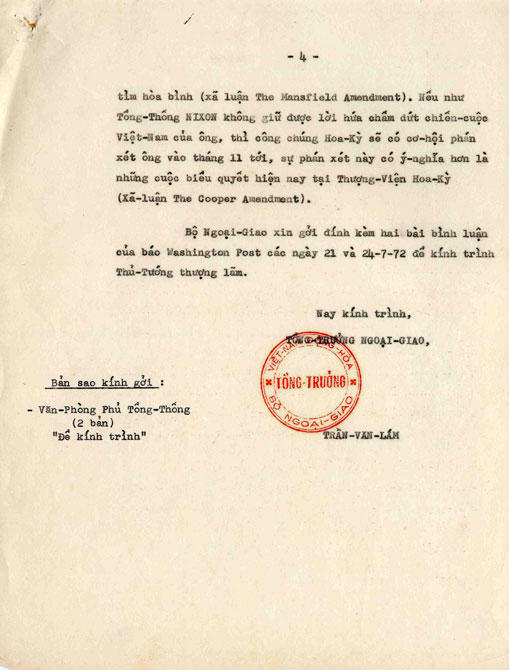
Letter of the Republic of Vietnam’s President Nguyen Van Thieu to the U.S. President Richard M. Nixon, August 31, 1972.
Source: National Archives Center No. 2, Fonds President’s Office of South Vietnam’s Second Republic, File 1232, Page 03-05.
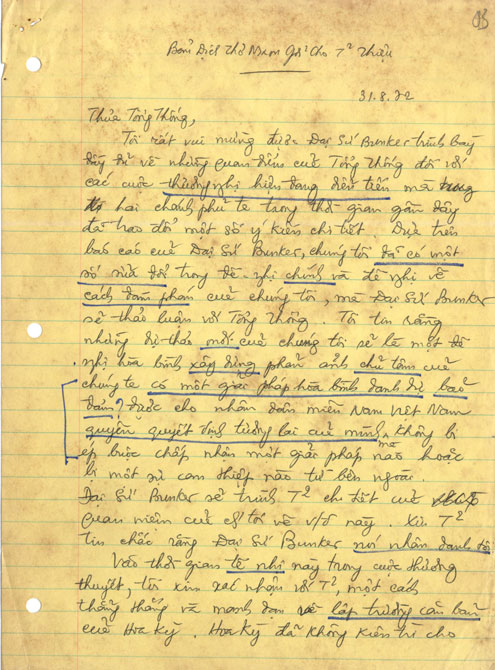
Letter of the Republic of Vietnam’s President Nguyen Van Thieu to the U.S. President Richard M. Nixon, August 31, 1972.
Source: National Archives Center No. 2, Fonds President’s Office of South Vietnam’s Second Republic, File 1232, Page 03-05.
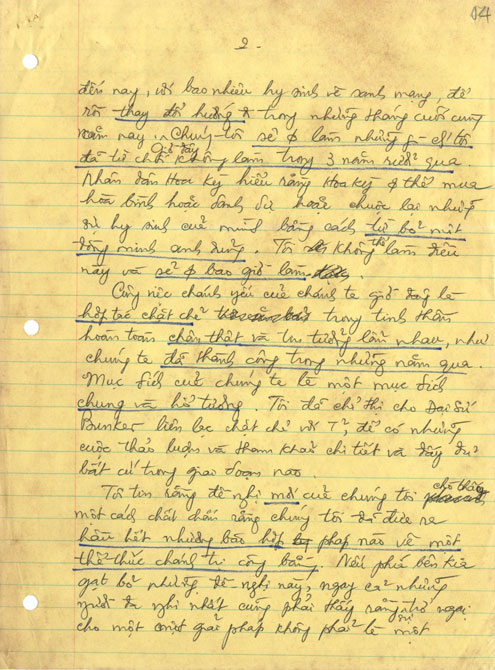
Letter of the Republic of Vietnam’s President Nguyen Van Thieu to the U.S. President Richard M. Nixon, August 31, 1972.
Source: National Archives Center No. 2, Fonds President’s Office of South Vietnam’s Second Republic, File 1232, Page 03-05.
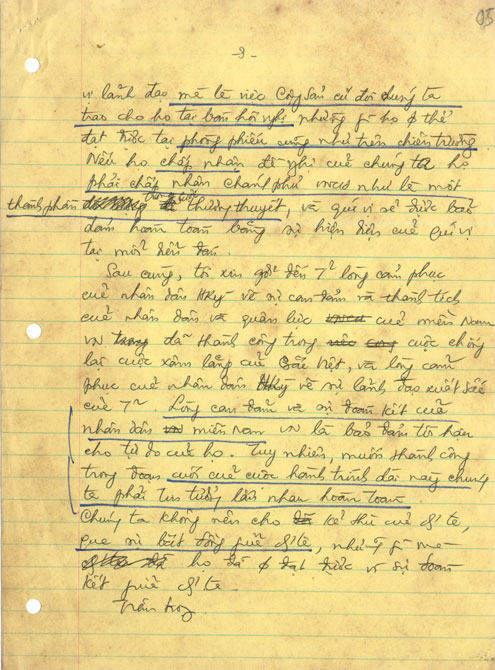
Message of the President of the Republic of Vietnam read before the National Assembly on December 12, 1972.
Source: National Archives Center No. 2, Palace of the Prime Minister of the Republic of Vietnam (1954 - 1975), file 3576, sheets 138 - 157.
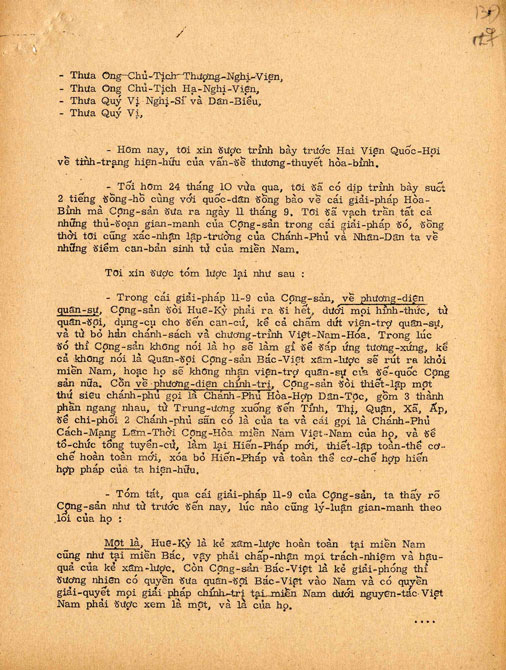
Message of the President of the Republic of Vietnam read before the National Assembly on December 12, 1972.
Source: National Archives Center No. 2, Palace of the Prime Minister of the Republic of Vietnam (1954 - 1975), file 3576, sheets 138 - 157.
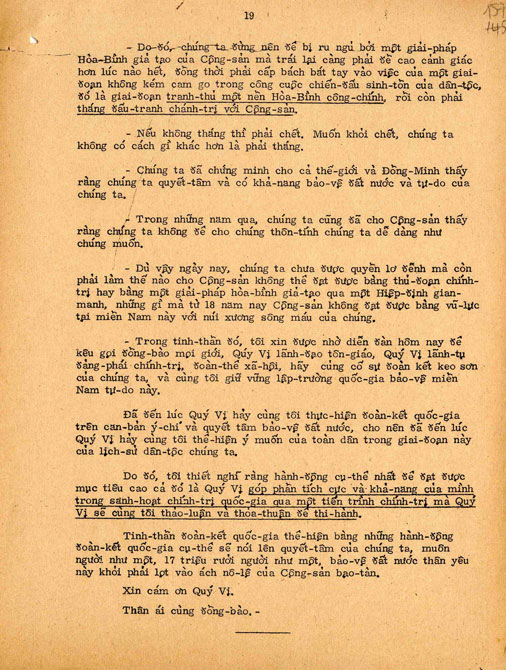
Minister of Foreign Affairs of Saigon Government Tran Van Lam siging the Paris Peace Accords, January 27, 1973.
Source: Vietnam National Museum of History

Part 3: Paris Peace Accords: The historic milestone
Meeting room and seating map layout at the Paris Peace Talks on Vietnam.
Source: National Archive Center No. 2, Fonds Presidential Palace of Second Republic of South Vietnam, File 16665, Page 43-44.
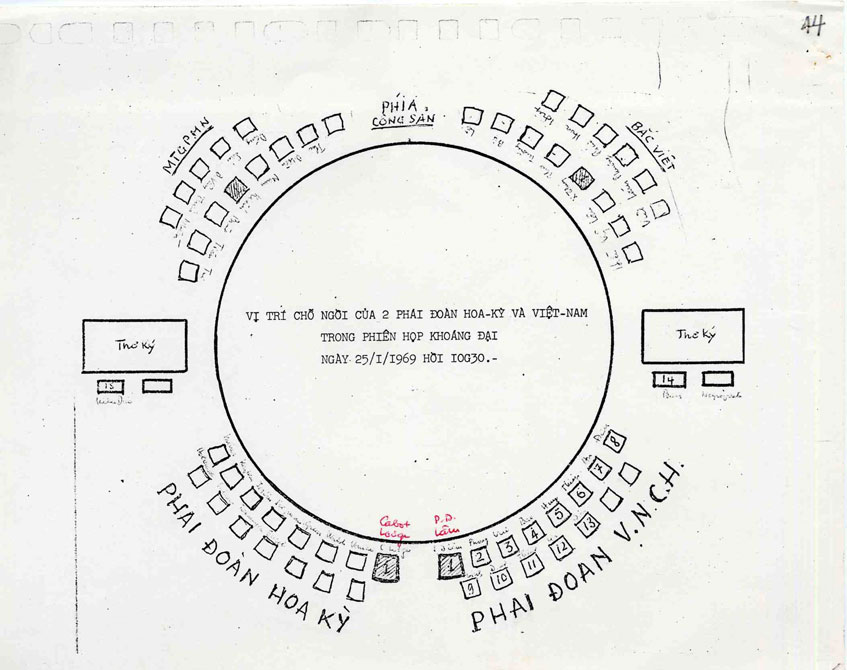
The initial signing of the Paris Peace Accords, January 23, 1973.
Source: The Archives Department of the Central Office of the Communist Party of Vietnam, Store unit 313, No. 95.
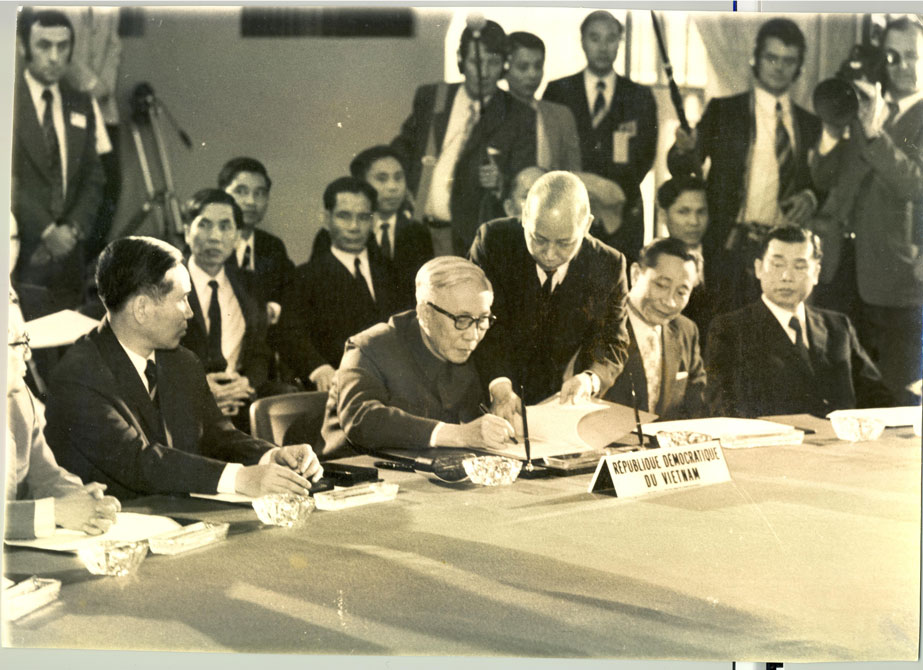
Henry A. Kissinger and Le Duc Tho shaking hands after initiating the Vietnam Peace Accords, 1973.
Source: The U.S. National Archives and Records Administration, No. 1872.
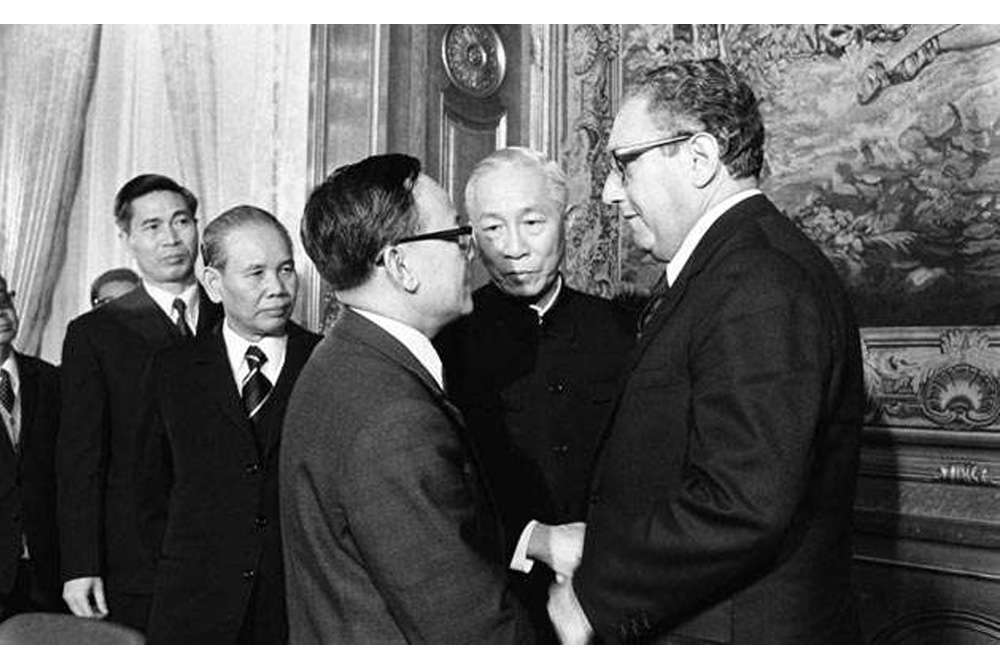
Le Duc Tho and Henry A. Kisinger giving signing pen to each other after initial signing of the Agreement on Ending the War and Restoring Peace in Vietnam, January 23, 1973. (Không có ảnh)
Source: Ministry of Foreign Affairs of Vietnam.
Journalists standing outside the International Conference Center on Kleber Avenue, January 23, 1973.
Source: Vietnam National Museum of History.
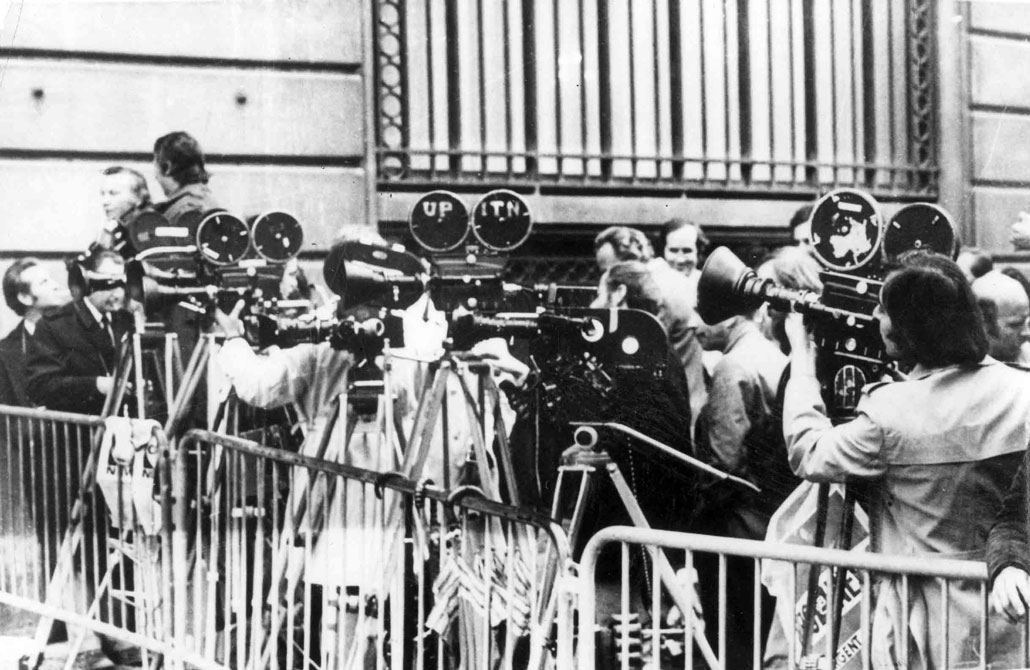
Minutes of the 23rd session of the Standing Committee of the 4th National Assembly of the Democratic Republic of Vietnam on January 24, 1973 on the results of negotiation in Paris.
Source: National Archives Center No.3, Fonds of National Assembly, Vol. 1, File 1755, Page 01-02.
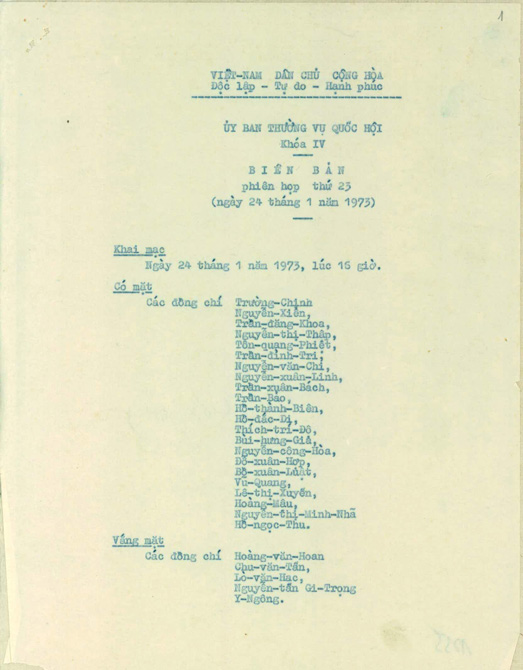
Minutes of the 23rd session of the Standing Committee of the 4th National Assembly of the Democratic Republic of Vietnam on January 24, 1973 on the results of negotiation in Paris.
Source: National Archives Center No.3, Fonds of National Assembly, Vol. 1, File 1755, Page 01-02.
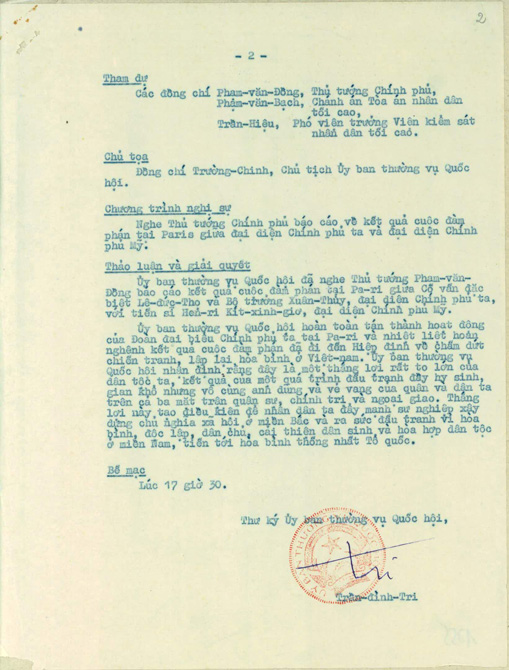
French people and overseas Vietnamese in France welcoming the delegation of the Democratic Republic of Vietnam in Paris, in 1973.
Source: The Archives Department of the Central Office of the Communist Party of Vietnam, Store unit 283, No. DI20.
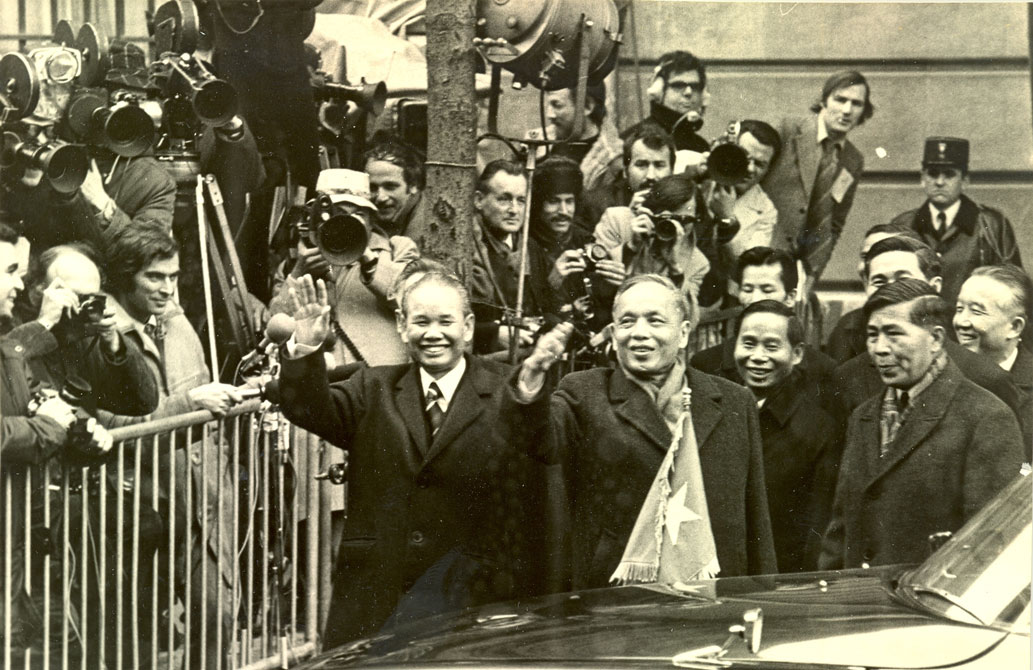
View of the signing ceremony of the Paris Peace Accords at the International Conference Center on Kléber Avenue, January 27, 1973.
Source: Vietnam National Museum of History.

The Agreement on Ending the War and Restoring Peace in Vietnam signed in Paris, France, January 27, 1973.
Source: National Archive Center No. 2, Material, Vv.1850.
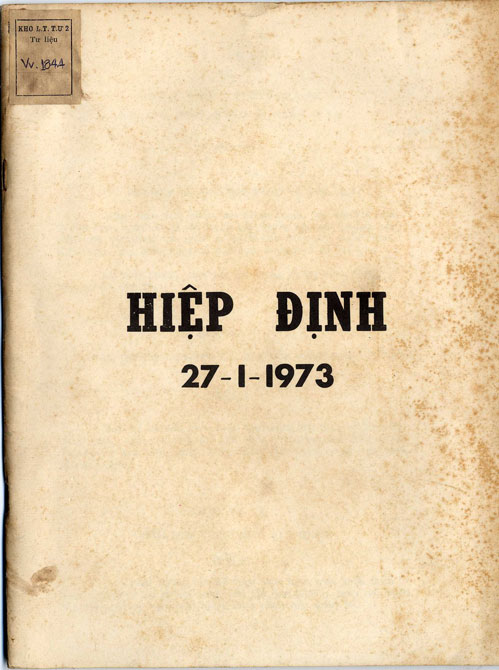
The Agreement on Ending the War and Restoring Peace in Vietnam signed in Paris, France, January 27, 1973.
Source: National Archive Center No. 2, Material, Vv.1850.
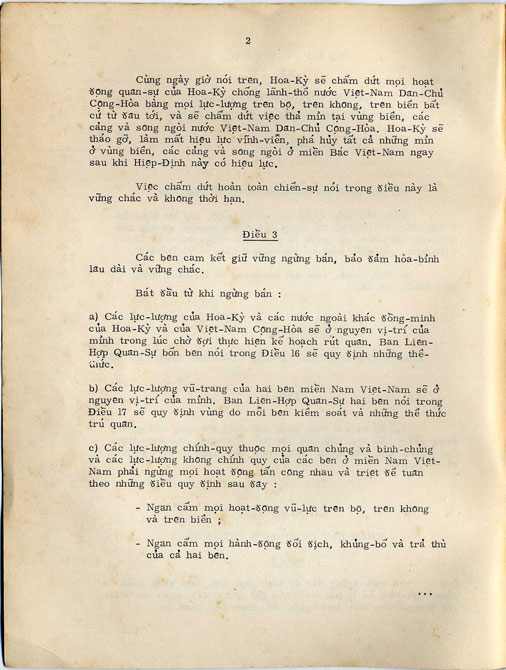
The Agreement on Ending the War and Restoring Peace in Vietnam signed in Paris, France, January 27, 1973.
Source: National Archive Center No. 2, Material, Vv.1850.
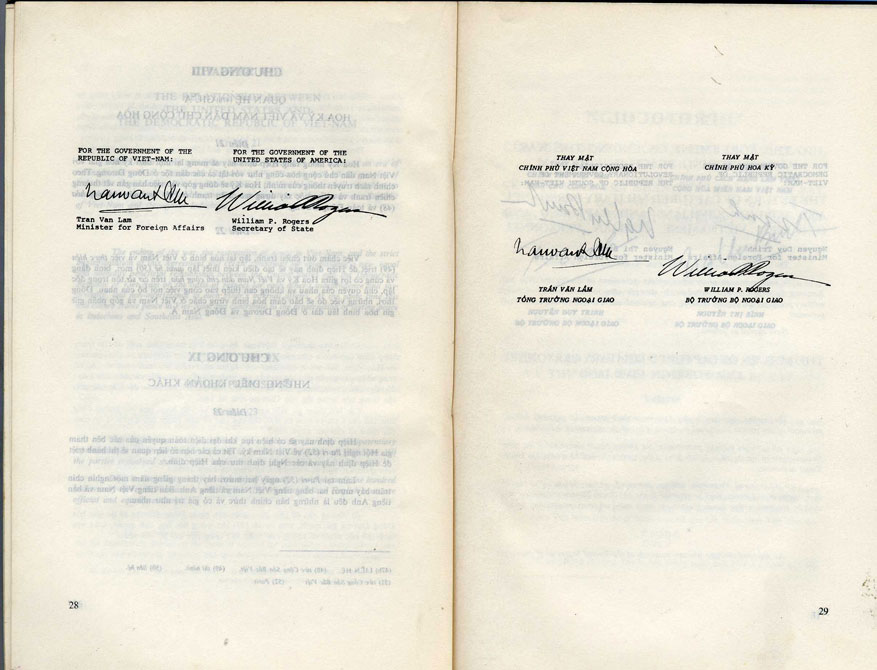
The Agreement on Ending the War and Restoring Peace in Vietnam signed in Paris, France, January 27, 1973.
Source: National Archive Center No. 2, Material, Vv.1850.
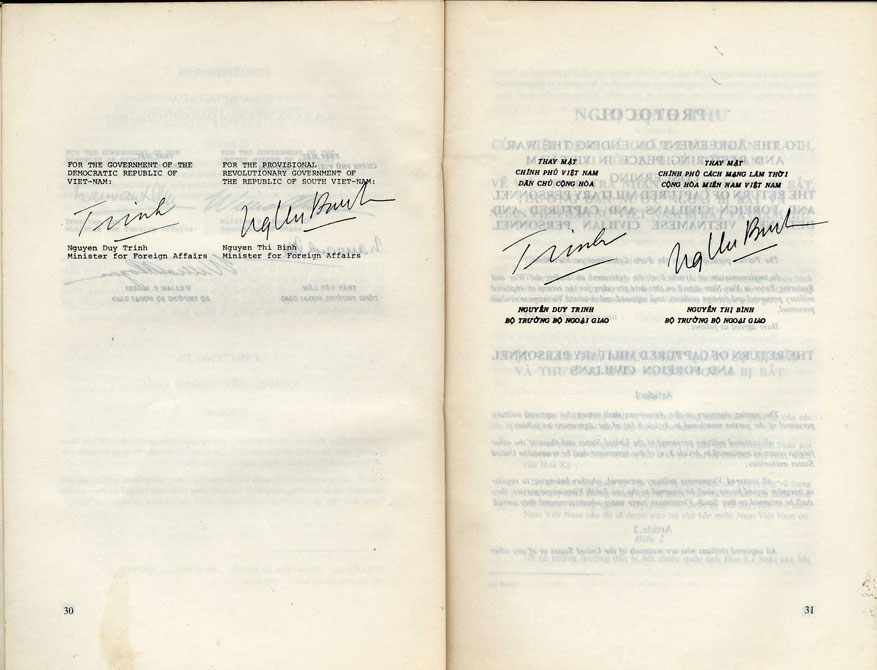
The signing of the Agreement on Ending the War and Restoring Peace in Vietnam “was a great victory in our history…” (không có ảnh)
Source: National Archive Center No. 3, Fonds of National Assembly, Vol. 1, File 1713, Page 02.
Closing speech of the 3rd session of the 4th National Assembly on February 21, 1973 with approval of the resolution in which passed the Agreement on Ending the War and Restoring Peace in Vietnam.
Source: National Archives Center No.3, Fonds of National Assembly, Vol. 1, File 1713, Page 12-13.
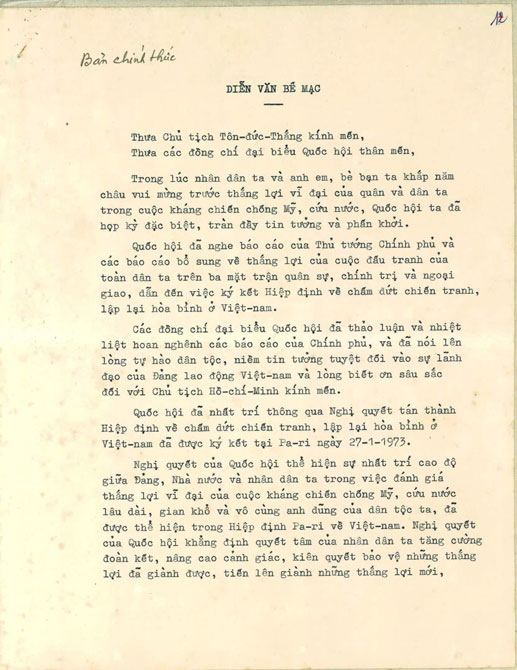
Closing speech of the 3rd session of the 4th National Assembly on February 21, 1973 with approval of the resolution in which passed the Agreement on Ending the War and Restoring Peace in Vietnam.
Source: National Archives Center No.3, Fonds of National Assembly, Vol. 1, File 1713, Page 12-13.
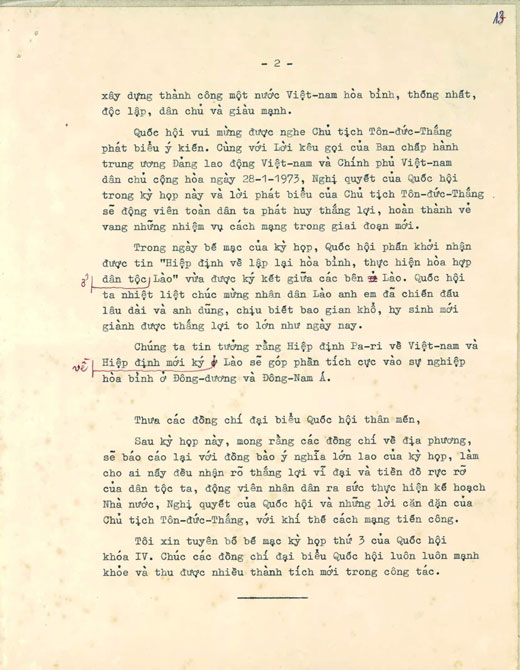
The United States withdrew its troops, completing the task of figting for the United States leave….
U.S. soldiers releasing at Gia Lam airport in Hanoi, February 29, 1973.
Source: National Archives Center No.3, Fonds of Photographer Nguyen Ba Khoan, No. 1444-12445.
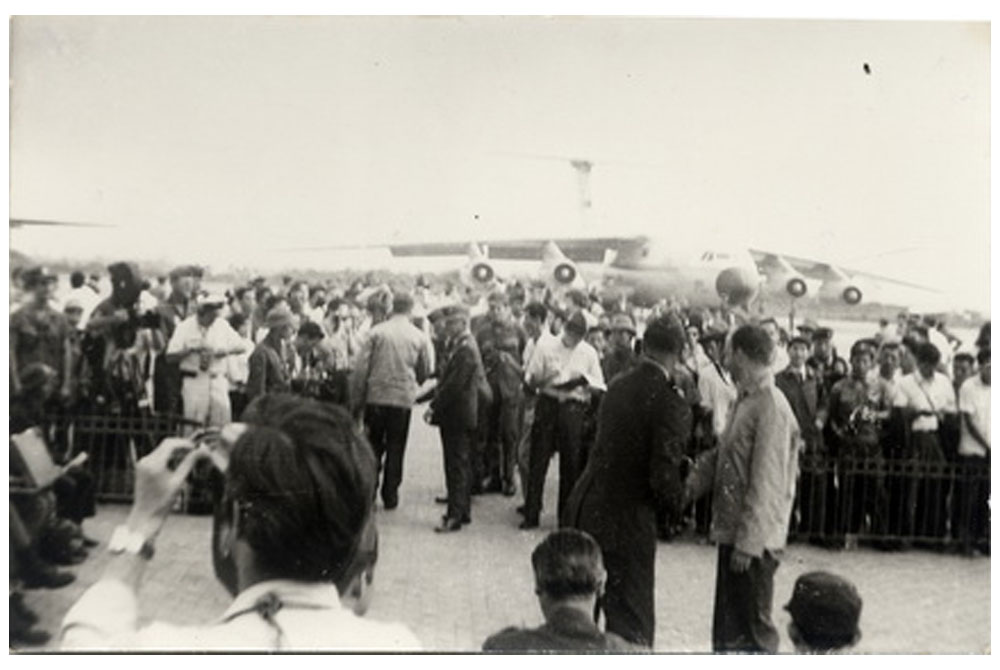
Returning belongings to U.S. prisoners of war at Hoa Lo, Hanoi, March 16, 1973. (Không có ảnh)
Source: National Archives Center No.3, Fonds of Photographer Nguyen Ba Khoan, No. 1465-74.
The delegation of the World Union meeting with representative of Vietnam at Gia Lam airport on March 28, 1973 for U.S. prisoners of war release according to the Paris Peace Accords. (Không có ảnh)
Source: National Archives Center No.3, Fonds of Photographer Nguyen Ba Khoan, No. 1559-716.
The last U.S. soldiers withdrawing from Da Nang, March 29, 1973.
Source: Vietnam National Museum of History.
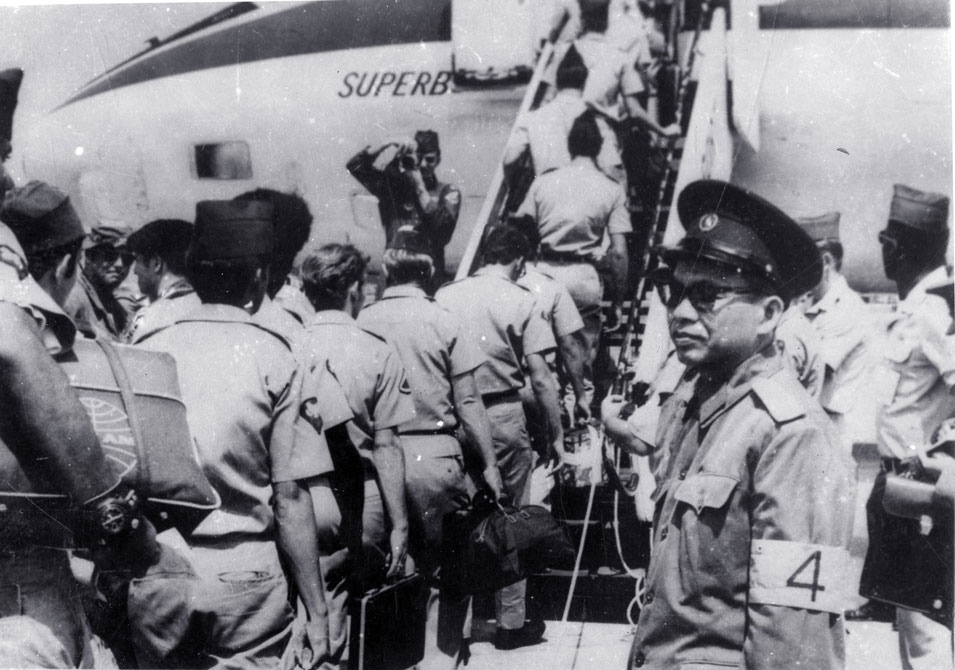
Two soldiers - A soldier of the Liberation Army and a soldier of Saigon at the bordering of Quang Tri, April 1973.
Source: National Archives Center No. 4, Journalist Chu Chi Thanh.
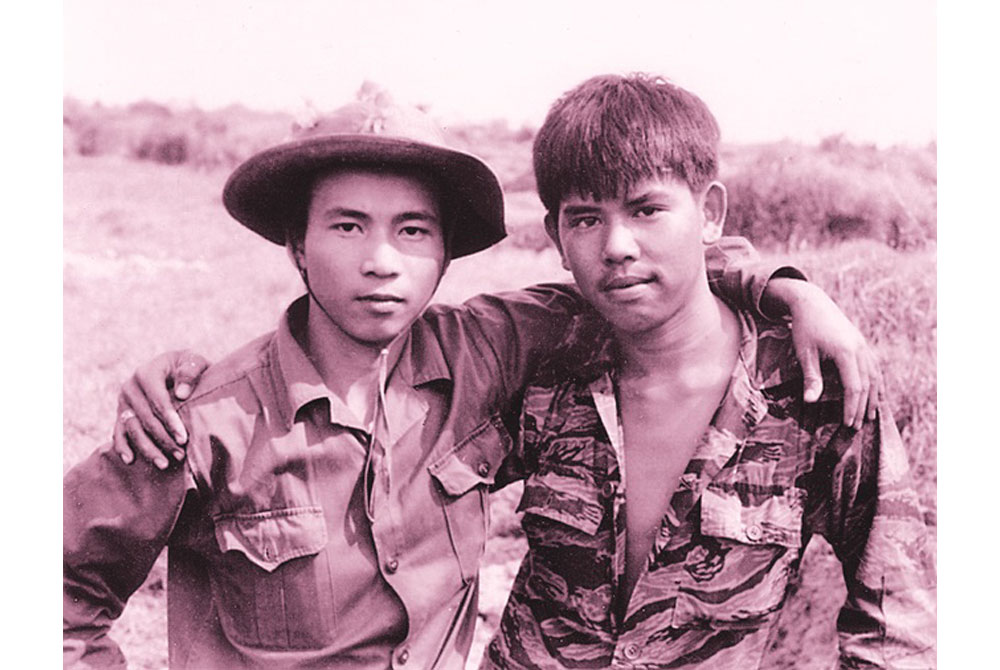
The happiness released lieutemant of Norris Alphonzo Charles and his wife Onga Sacler in Hanoi, September 17, 1973.
Source: Journalist Chu Chi Thanh, File 46.
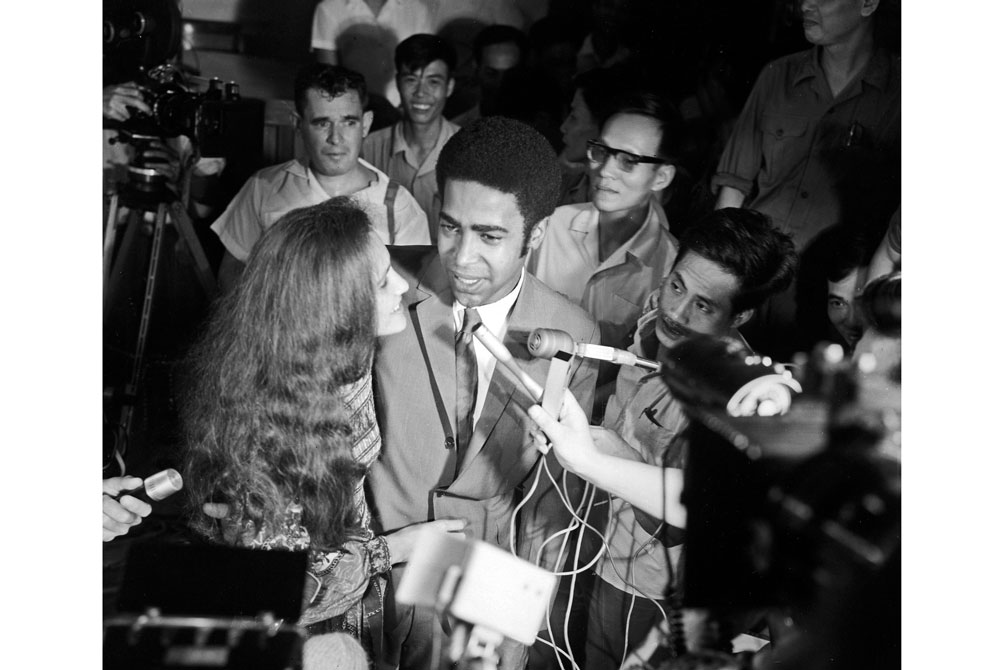
Prisoners releasing site at Nhan Bieu bank by Thach Han river, Quang Tri, in 1973.
Source: Journalist Chu Chi Thanh, File 24.
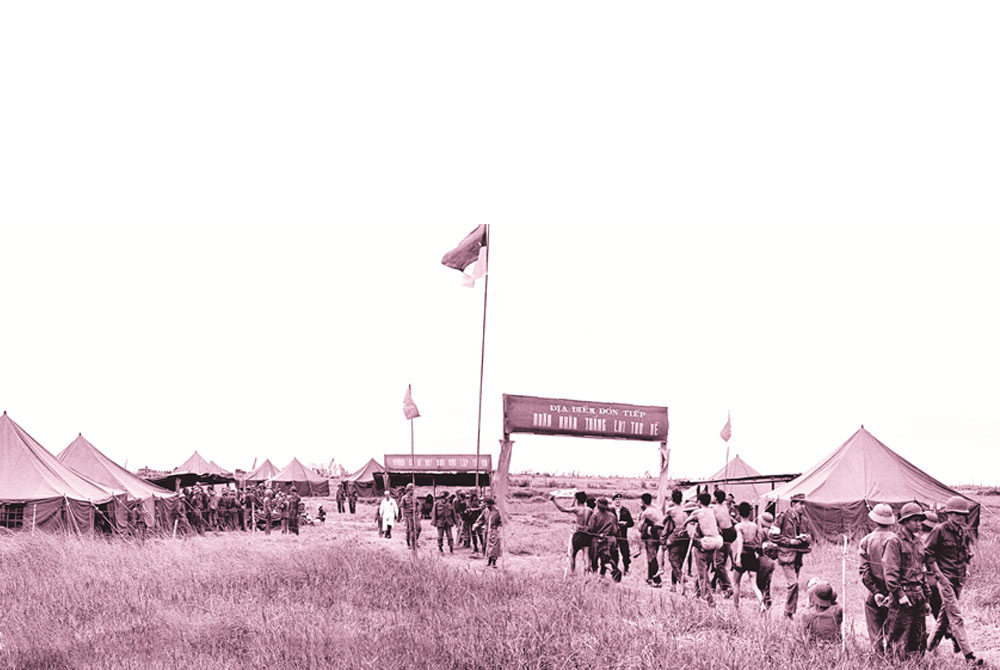
Letter from President Gerald R. Ford to South Vietnam's President Nguyen Van Thieu concerning American policy toward Vietnam. (Không có ảnh)
Source: The U.S. National Archives and Records Administration, No. 186699.
Memorandum for Secretary of State Henry A. Kissinger regarding ominous developments in Vietnam on March 12, 1975. (Không có ảnh)
Source: The U.S. National Archives and Records Administration, No. 7367435.
The signing of the Agreement on Ending the War and Restoring Peace in Vietnam “encourages Vietnamese people to promote building socialism in the North and fighting for peace, independence, democracy, social progress and national reconciliation in the South Vietnam for national reunification.” (Không có ảnh)
Source: National Archives Center No.3, Fonds of National Assembly, Vol. 1, File 1755, Page 02.
Party and state leaders on the platform celebrating the victory of Vietnam in Hanoi in 1975.
Source: National Archives Center No.3, 1954-1985 Photo collection (LIV), Vol. 1, No. 480.
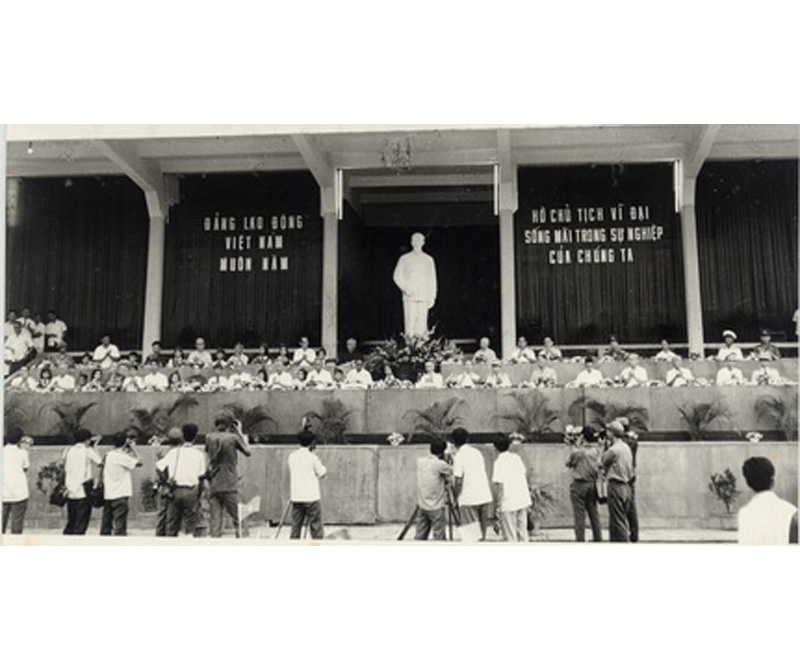
People voting for National Assembly of unified Vietnam, April 25, 1976.
Source: Ho Chi Minh Museum.
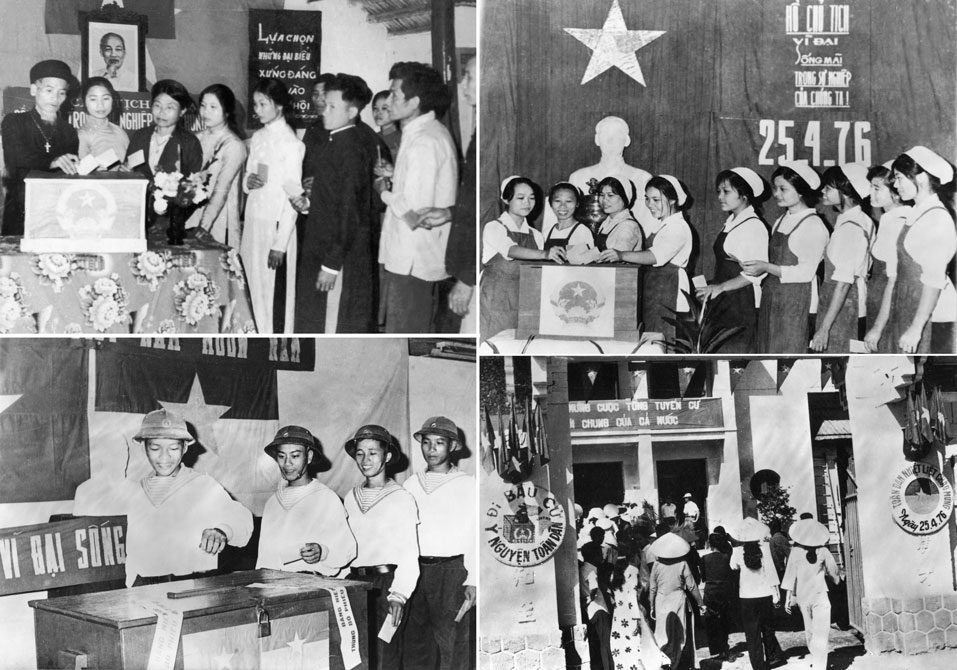
The 1st session of the 4th National Assembly of unified Vietnam in Hanoi adopting resolution on name, national flag, national emblem, capital and national anthem of Vietnam, July 2, 1976.
Source: Ho Chi Minh Museum.
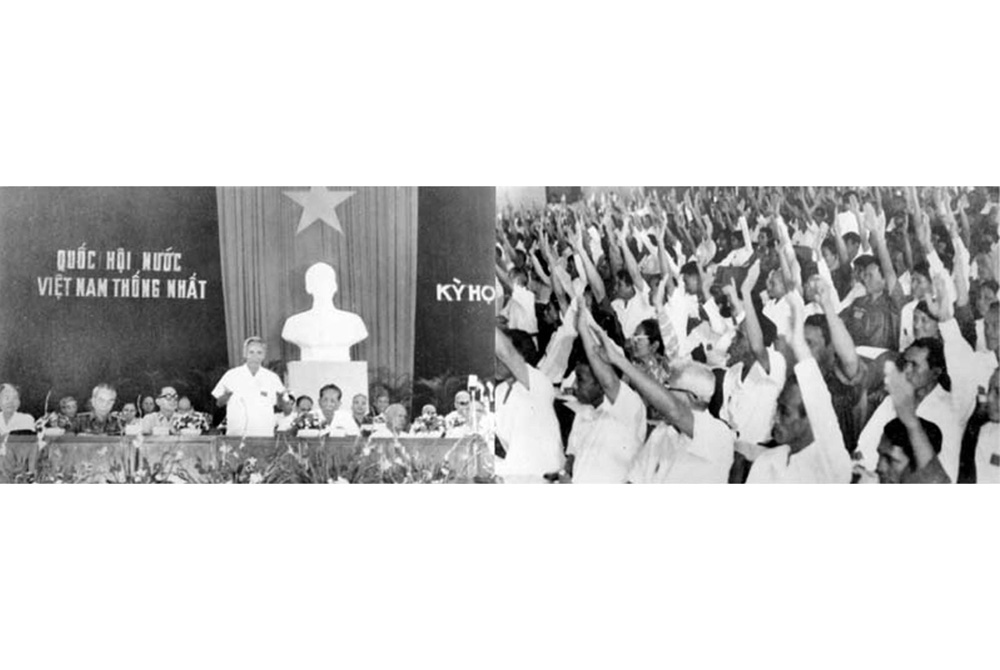
The Vietnamese delegation attended the Paris Peace Talks led by Minister Nguyen Xuan Thuy in 1968. (Không có ảnh)
Source: National Archives Center III, The photo documents of Colonel, Ambassador Ha Van Lau, number 199
The Vietnamese foreign delegation held secret talks with the American delegation at the Paris Peace Talks in 1967 and 1968.
In photo number 01: From left to right, sitting third is Colonel, Ambassador Ha Van Lau, sitting next to is Minister Xuan Thuy.
(Không có ảnh)
Source: National Archives Center III, The photo documents of Colonel, Ambassador Ha Van Lau, number 200.
The Vietnamese foreign delegation held secret talks with the American delegation at the Paris Peace Talks in 1967 and 1968.
In photo number 02: From left to right special advisor Le Duc Tho, Minister Xuan Thuy, (Không có ảnh)
Source: National Archives Center III, The photo documents of Colonel, Ambassador Ha Van Lau, number 200.
In front of the front gate of the Klébe International Convention Center, Paris where the negotiations between Vietnam and the U.S. took place in 1968. (Không có ảnh)
Source: National Archives Center III, The photo documents of Colonel, Ambassador Ha Van Lau, No. 201
Colonel, Ambassador Ha Van Lau attended the Conference calling on the world people to support the war against the U.S. imperialists invading Vietnam in 1968 - 1969 (Không có ảnh)
Source: National Archives Center No.3, The photo documents of Colonel, Ambassador Ha Van Lau, No. 203
Photo series related to the Paris Conference in 1968 (with Colonel, Ambassador Ha Van Lau). (Không có ảnh)
Source: National Archives Center No.3, The photo documents of Colonel, Ambassador Ha Van Lau, No. 204
Colonel, Ambassador Ha Van Lau - Head of the North Vietnamese delegation to Paris to attend the Talks with the US on the Vietnam War on May 8, 1968 .(Không có ảnh)
Source: National Archives Center No.3, The photo documents of Colonel, Ambassador Ha Van Lau, No. 205
Colonel, Ambassador Ha Van Lau with friends after the Paris Peace Talks in France in 1968 - 1970
In the photo: from left to right, Lady Representative Mai Van Bo, Ambassador Ha Van Lau, Ambassador Mai Van Bo.(Không có ảnh)
Source: National Archives Center No.3, The photo documents of Colonel, Ambassador Ha Van Lau, No. 207
Colonel, Ambassador Ha Van Lau with Chargé d'affaires Mai Van Bo and his wife during the Paris Peace Talks, France on July 25, 1969.(Không có ảnh)
Source: National Archives Center III, The photo documents of Colonel, Ambassador Ha Van Lau, No. 209.
Colonel, Ambassador Ha Van Lau and Mr. Phan Hien (Deputy Minister of Foreign Affairs) row a boat in a lake in Paris in 1969.(Không có ảnh)
Source: National Archives Center No.3, The photo documents of Colonel, Ambassador Ha Van Lau, No. 210.
Colonel, Ambassador Ha Van Lau received journalists at the Paris Peace Talks in France in 1969.(Không có ảnh)
Source: National Archives Center No.3, The photo documents of Colonel, Ambassador Ha Van Lau, No. 211
“The Vietnamese people, with their heroic struggle, have established a glorious feat that
goes down in the annals of history of the struggle for independence and freedom of the
nations against aggression and oppression as one of the most important pages in history most brilliant history”.
Quotation from The telegram dated January 27, 1973 of the Soviet Government to the Government of the Democratic
Republic of Vietnam on the occasion of the signing of the Paris Agreement on ending the war and restoring peace in Vietnam.
Source: Central Scientific Library of the Ministry of Foreign Affairs of the Russian Federation. Department of Southeast Asia, USSR Ministry of Foreign Affairs, pp. 50-52.
This victory of the Vietnamese people is "an inspiring example of heroism in the struggle for freedom,
strengthening the position of socialism in Southeast Asia, demonstrating the strength of of socialism and peace”.
Quotation from An editorial in the "Truth" newspaper about the signing of the Paris Peace Accords.
Source: Central Scientific Library of the Ministry of Foreign Affairs of the Russian Federation. Department of Southeast Asia, USSR Ministry of Foreign Affairs, pp. 56-61.
"The path of peaceful and democratic development, affirming real independence and pursuing the policy of
national reunification and concord is opening up before the eyes of South Vietnam".
Quotation from Speech dated January 30, 1973 by General Secretary of the Central Committee of the
Communist Party of the Soviet Union L.I. Brezhnev at a reception for Vietnamese friends on the
occasion of the signing of the Paris Peace Accords.
Source: Russian State Archives of Modern History, Font 80, Index 1, file 527, sheets 108-120.
“The Americans should have learned lessons from France's defeat and not have waged a war of aggression in Vietnam. But they didn't do that, they thought the Americans could do what the French couldn't do"... “The 1968 Tet Offensive and simultaneous uprising was the turning point of the war. It was a huge and resounding victory for the army and people, especially in terms of politics and psychology. It marked the failure of the US "Joint warfare in South Vietnam" strategy, forcing the US to de-escalate the war, enter into negotiations and begin the process of withdrawing from South Vietnam.
Source: The book Diplomatic Front with the Paris negotiations on Vietnam, Ministry of Foreign Affairs of Vietnam, publishing company CTQG-ST, HN.2015, Page 22.
When talking about the Paris Peace Accords, we cannot help but mention the 1954 Geneva Conference... With the Geneva Conference, we have a liberated North, which is the revolutionary base of the whole country. This is one of the most important conditions to maintain and develop the fight in the South."
Source: The book Diplomatic Front with the Paris negotiations on Vietnam, Ministry of Foreign Affairs of Vietnam, publishing company CTQG-ST, HN.2015, Page 36.
“The Xuan Thuy - Harriman negotiations took place for 5 and a half months, with 28 sessions publicly and 12 high-level secret meetings and many private contacts and meetings other levels. Meeting publicly is to argue, to take advantage of public opinion; meet secretly to understand the other side, bargain and negotiate to come to an agreement. America only wanted to negotiate in complete secrecy and used secret bargaining tactics at the same time with distorted propaganda, to hide its unjust face and mislead public opinion, creating the illusion of peace while continuing the war of aggression against us." (Không có ảnh)
Source: The book Diplomatic Front with the Paris negotiations on Vietnam, Ministry of Foreign Affairs of Vietnam, publishing company CTQG-ST, HN.2015, Page 104.
“The important thing about the Paris Agreement is not the recognition of two governments, ai army, two control regions and three political forces, advanced to form a government The government has three components, the key is that the US must withdraw while our troops must stay and operate The North and South corridors are still connected, the rear is connected to the front into a continuous strip, unified...The international conference meeting in Paris signed the Protocol on March 2, 1973, noting, endorse and support the Paris Peace Accords, "solemnly recognize and thoroughly respect the basic national rights of the Vietnamese people..., the right to self-determination of the region's people South Vietnam", "thoroughly respect the Agreement and the Protocols" and "call for all Other countries do the same." The Convention of Paris forms the political and legal basis The principles of the Agreement are even more solid and have confirmed the position of the Revolutionary Government Interim in political life in South Vietnam and internationally"
Source: Sách Mặt trận ngoại giao với cuộc đàm phán Paris về Việt Nam, Ministry of Foreign Affairs of Vietnam, publishing company CTQG-ST, HN.2015, Pages 233-234.
The Government of the Democratic Republic of Vietnam decided to appoint Minister XUAN THUY as its representative I spoke officially with the US Government representative to confirm with the US side whether to terminate or not conditions for bombing and all other acts of war against the Democratic Republic of Vietnam, and then talk about other issues related to both sides.
Source: National Archive Center No. 2, Fonds Presidential Palace of Second Republic of South Vietnam, File 865, Page 04.
« Progressive public opinion and world public opinion are determined to demand that the US Government unconditionally end the work bombing and all other acts of war throughout the entire territory of the Democratic Republic of Vietnam, yes End the invasion of Vietnam. If America stubbornly pursues a war of aggression, the Vietnamese people will suffer closely united, determined to fight to complete victory for the independence and freedom of the Fatherland, for peace peace in Southeast Asia and the world ».
Source: Book Paris Conference the Door to Peace, Truth National Politics Publishing House 2018, page 36.
« In a statement dated February 17, 1972, the Ministry of Foreign Affairs of Vietnam, the Democratic Republic of Vietnam, strongly condemned new and very serious war actions by the US, resolutely demanding that the Nixon administration stop immediately, permanently stop all actions that violate the sovereignty and security of the Democratic Republic of Vietnam ».
Source: Book Paris Conference, Door to Peace, Truth National Political Publishing House 2018, page 99.
«The Paris Conference on Vietnam was the longest negotiation to end the longest war in history In the twentieth century, the war took place within one country but was the focus of conflicts and epochal conflicts ».
Source: Book of historical negotiations, National Political Publishing House, 2009, page 46.
« Despite being stubborn until the last minute, on January 27, 1973, the United States was forced to sign the « Agreement to End the War war, restore peace in Vietnam ». The Paris Agreement was recognized and guaranteed by a national conference international agreement on Vietnam, through the International Agreement, signed on March 2, 1973."
Source: Book of historical negotiations, National Political Publishing House, 2009, page 48.
